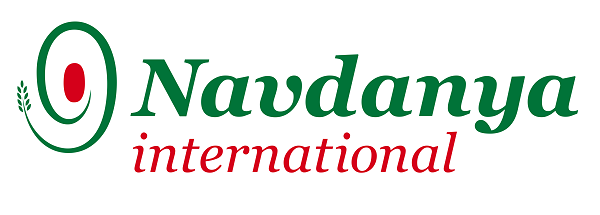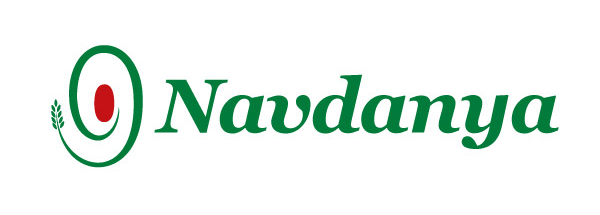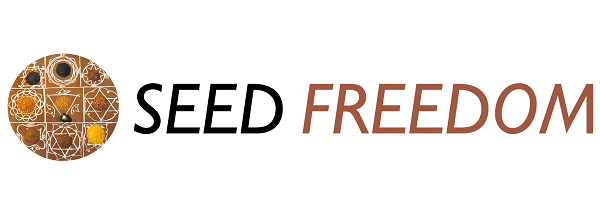The Monsanto Tribunal ends with remarks of Judge Tulkens: “We will try to deliver the legal opinion before December 10th, the International Day of human Rights. It will be addressed to Monsanto and to the United Nations. From this legal opinion, other jurisdictions can be involved and more judges will step in. We, as the judges [at the Monsanto Tribunal] have seen, heard, noted and deliberated. Chances are that the international law will take into consideration new issues such as the ones related to ecocide.”
Thank you for following us up!
We will keep you updated…
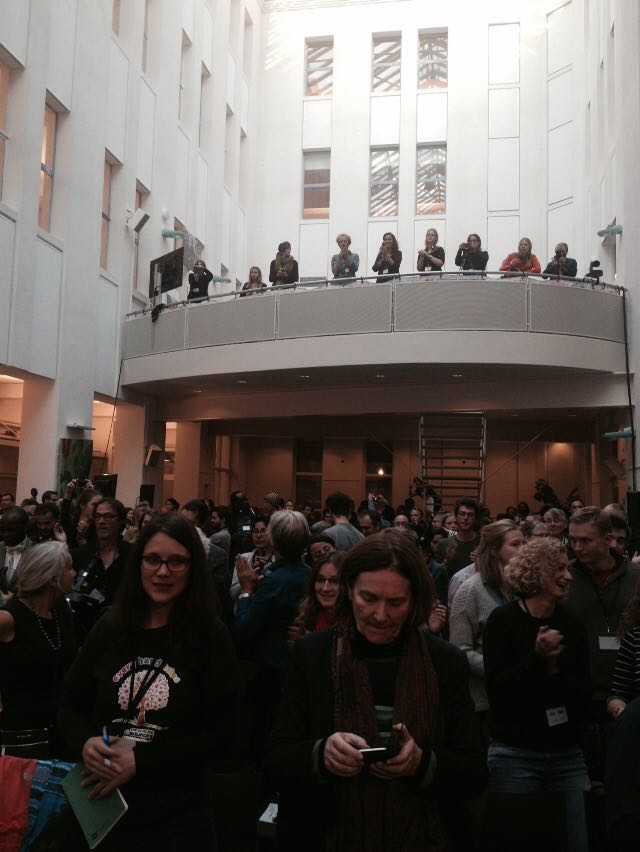
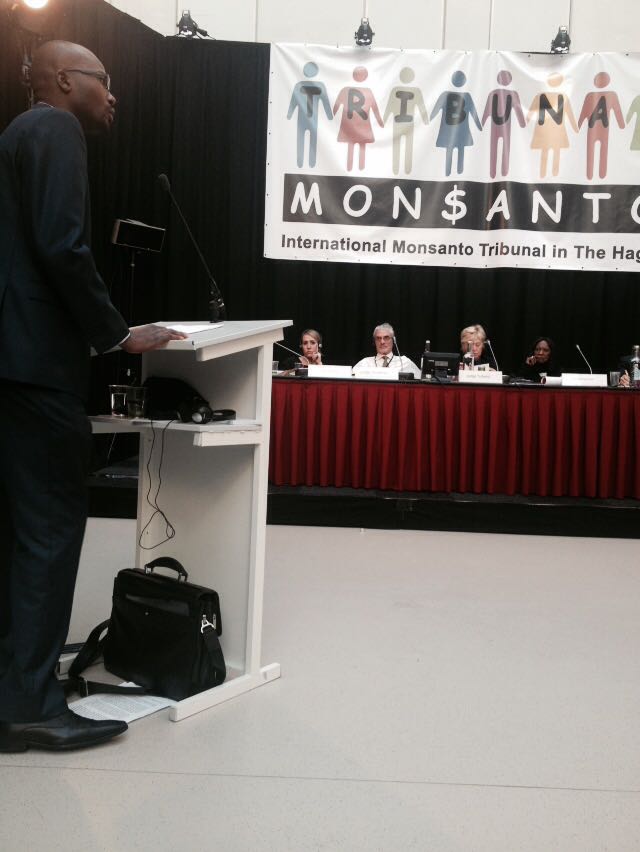
Koffi Dogbevi, lawyer of the Monsato Tribunal, ecocide
“It seems we are living a time of apocalypse time where corporate power cannot be sued, but corporate, Monsanto needs to be held criminally liable.”
“Even in peace time, if there is no crime environmental destruction cannot be prosecuted. That’s why we need ecocide crime”
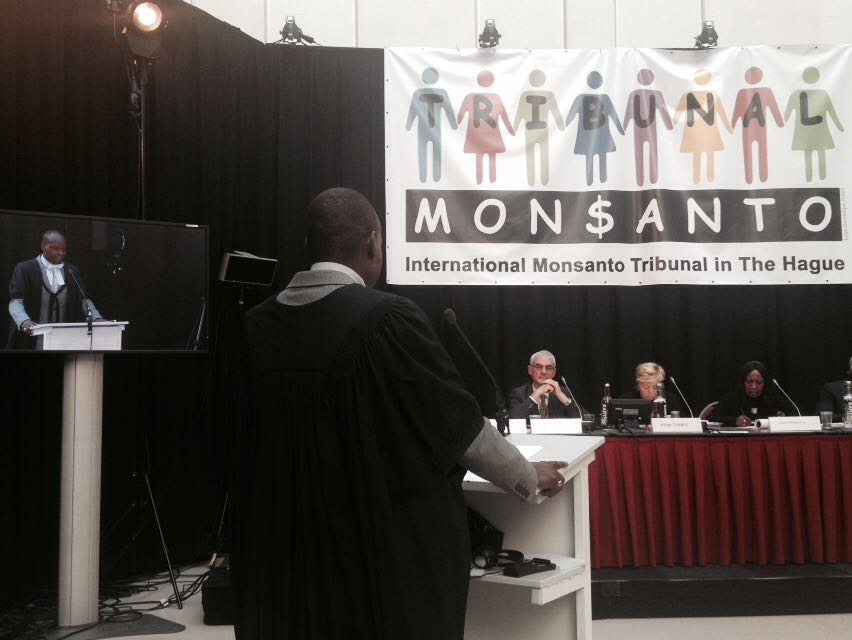
Maogato Jackson, lawyer of the Monsanto Tribunal, war crimes
Thousands of individuals have been handed death sentences by Monsanto in one way or another. Monsanto’s consciousness stops and starts on the stock trading floor. They see people as numbers. Money can buy a lot of things but not a conscious.
Monsanto has continued to destroyed human lives and ecosystems from generations to generations. In effect, Monsanto is a generational serial killer. It is both a very successful commercial entity and also a successful killer. In order to give a voice to people and communities who have been destroyed, I also want to give a voice to the environment
Playing God with the environment has made us pay dearly. Mother nature doesn’t play games, she cannot be contained. If we are not willing to change, we will be removed from the globe and replaced by insects.
Is Monsanto complicit in a war crime by providing materials for the US Army by Operation Ranchhand in Vietnam. The goal of this operation was to de-foliate the country to make military operations easier.
In November 1961, Kennedy approved the use of herbicides in the Vietnam war for Operation Ranchhand, which was conducted until 1971. During this operation, the US Air Force used specially modified planes to spray the herbicide Agent Orange. Monsanto was the dominant supplier out of nine other companies who manufactured herbicides for Operation Ranchhand.
Monsanto has collected the bulk of the profits from Agent Orange which was multiple times the toxicity of the other herbicides offered by the other companies. During operation Ranchhand, 19 million gallons of chemicals sprayed on 20% of Vietnamese jungles and 36% of mangroves.
Scientific studies have shown a connection between Agent Orange and many diseases and birth defects in children.
As early as 1675, the use of poison in any manner was declared to be excluded from modern warfare – that it was outside the law and usages of war. This tradition continues today with the Declarations of the Hague.
Business activities are not always a neutral action. In the case of Monsanto, it is clear Monsanto is guilt of crimes against humanity far beyond any neutral action of business.
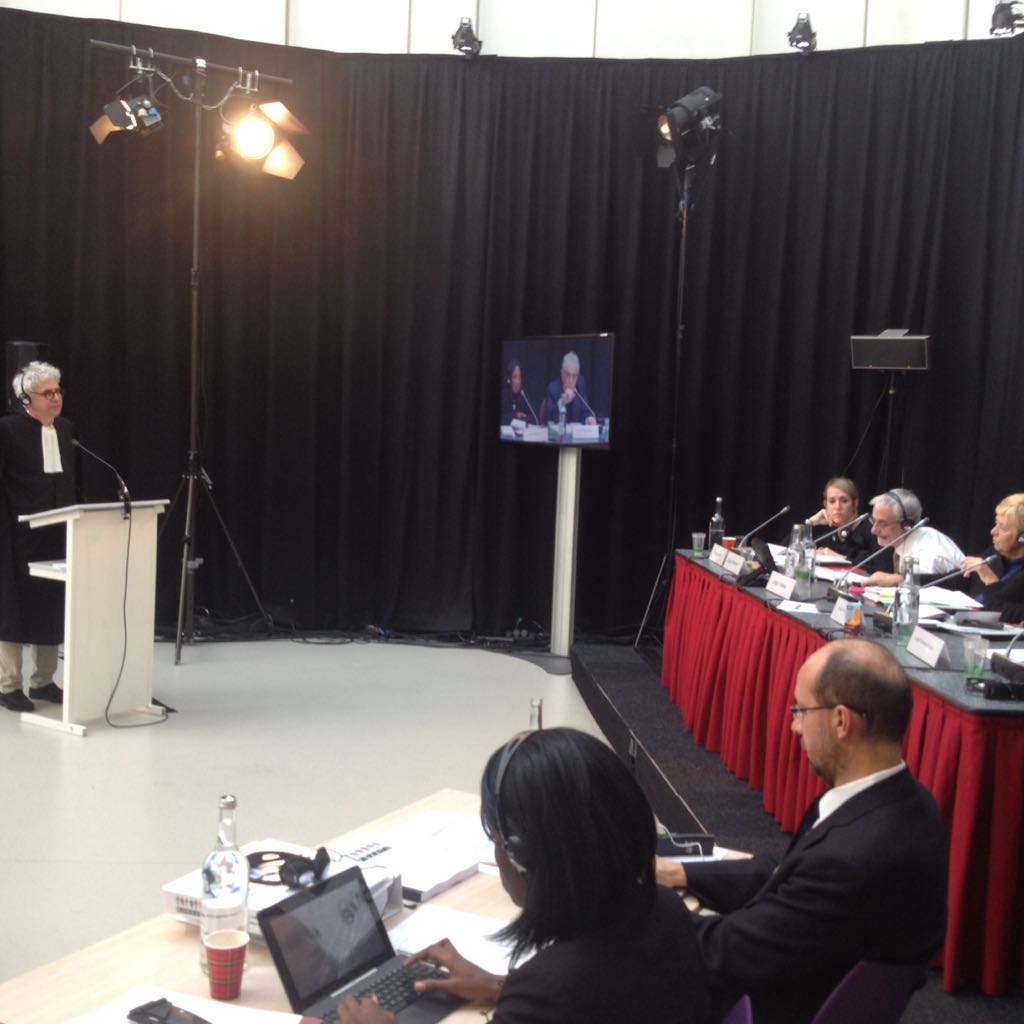
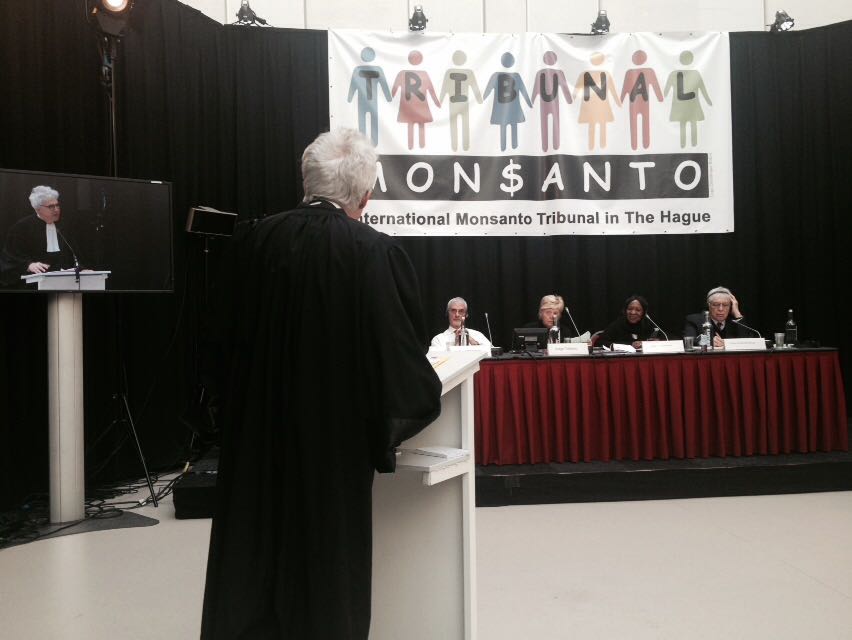
William Bourdon, lawyer of the Monsanto Tribunal, right to information
“WHO is World Health Organization?”
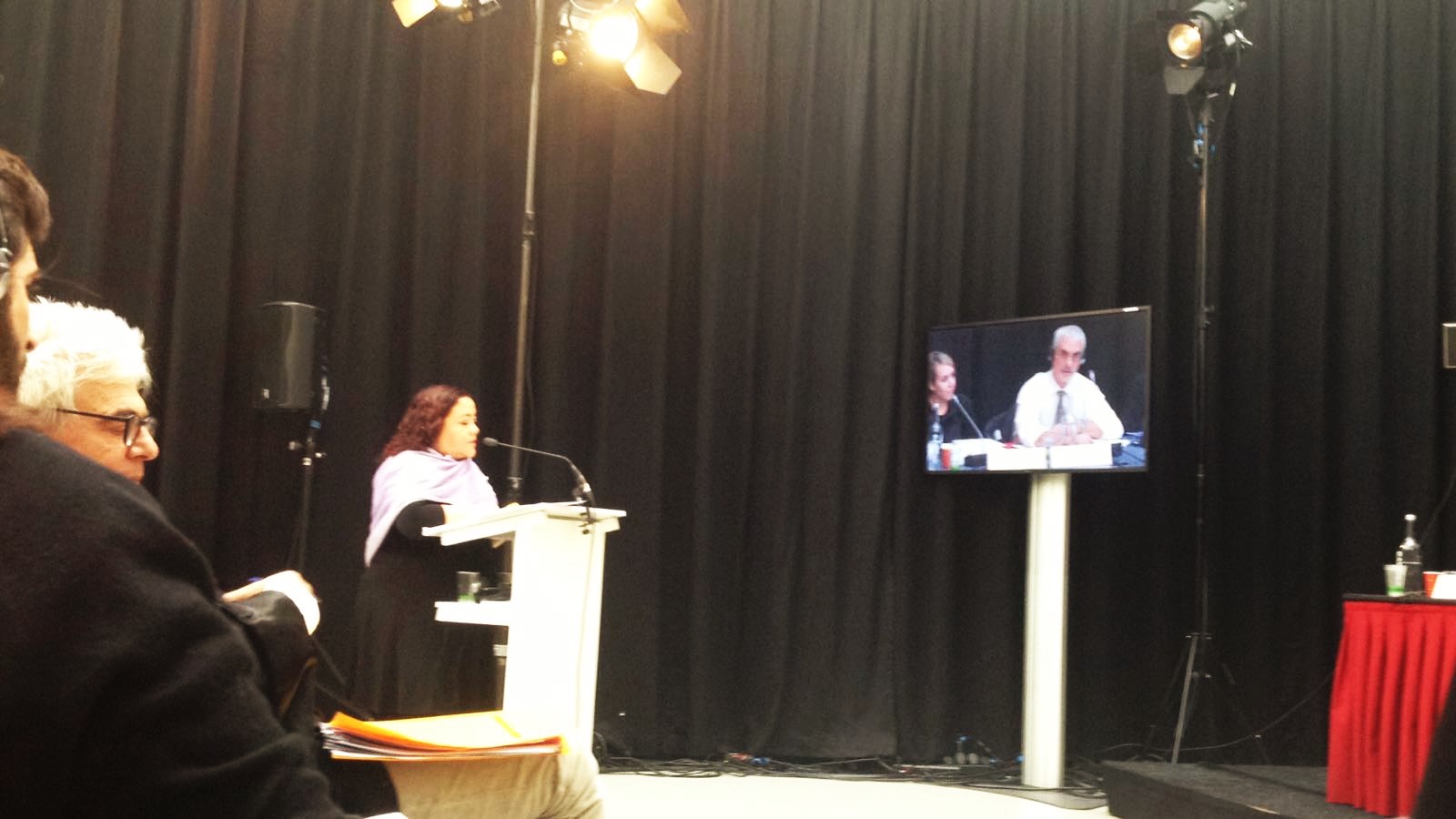
Claudia Gòmez Godoy, lawyer of the Monsanto Tribunal
“Cuàl es el precio human por la diversificaciòn del mais y la perdida de especies tradicionales?
Cuàl es el precio de la vida?”
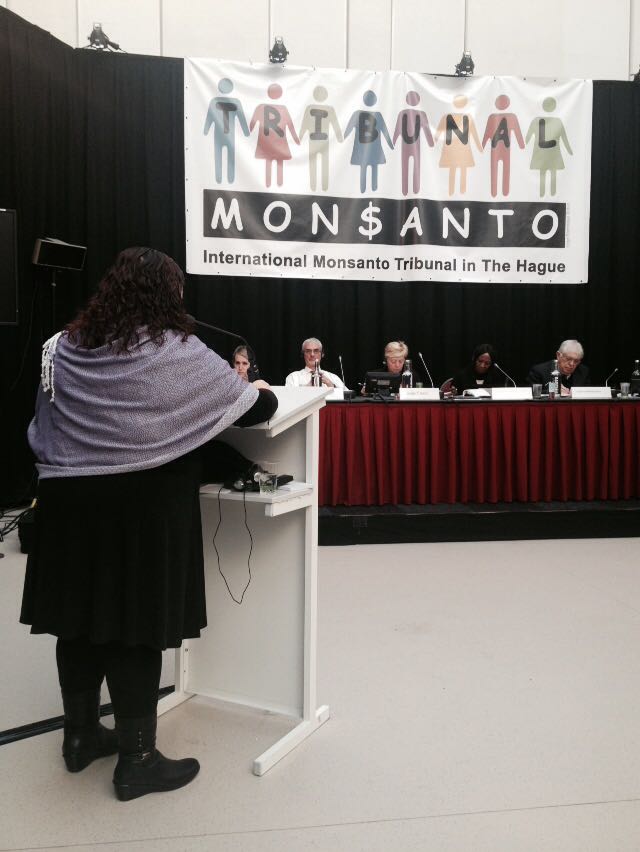
Claudia Gòmez Godoy, lawyer of the Monsanto Tribunal.
” Es necesaria una justicia que aplique el principio precautorio por evitar que daños se hacen, no simplemente establecer daños aceptables”
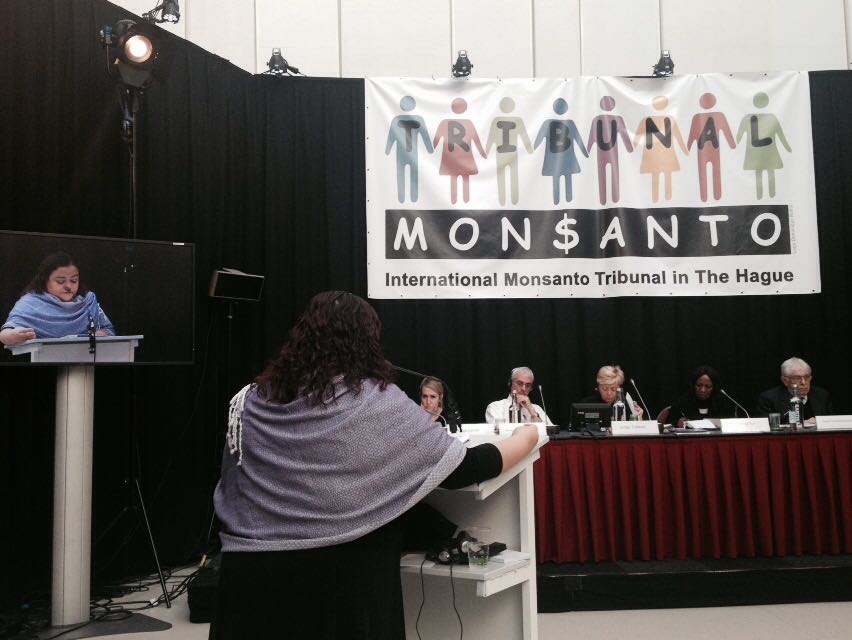
Claudia Gòmez Godoy, lawyer of the Monsanto Tribunal right to healthy environment, right to health and to food.
Lawyer of the Monsanto Tribunal, Claudia Gómez Godoy
While individual rights must be defended, we also have to look at collective rights. Three important collective rights are the collective right to a healthy environment, healthy food, and a healthy human life.
UN principles along with countless international declarations, conventions, and protocols proclaim the right to a healthy environment. These instruments affirm that companies must protect human and environmental rights, mitigate negative consequences, and make sure their services and operations do not harm these rights. These international instruments also give the right to victims for compensation in case of damage.
These rights need to be respected and actualized. Companies like Monsanto publish documents stating that they will protect human rights and the environment, but this is just a signature on a piece of paper – they need to show that they are actively working for these principles.
For evaluating whether companies have succeeded or not in following these principles, they cannot just have consultations with the experts. They also have to listen to victim’s personal experience. Listening to victims about whether companies have respected their rights has never happened in the case of Monsanto.
Importantly, we must use the precautionary principle. To protect the environment and health, we must avoid the damage, not feel bad about a decision taken 50 years ago. This is especially true if there isn’t peer reviewed and fair scientific evidence. Often, it is not clear what the effects of these products are on human and environmental health. As long as we do not know the effects, we can say the environment is going to remain healthy and clean.
We are living in a system that gives companies a lot of power. According to international organizations, 70% of food is provided by small farmers. Healthy food depends on small farmers. They are who we should be supporting. Unfortunately, these small farmers suffer most from this industrial corporate system. They are forced to use a system that makes them even poorer and gives them less power.
In conclusion, everyone has the right to food, food sovereignty, and food security. Food security means that the food we are eating is safe and regular. Food sovereignty means that food must be culturally adequate and be what the population wants. Countries and companies cannot interfere in these rights of people. Monsanto has violated these rights and this has had negative effects on biodiversity, water, and human health.
14.30 The afternoon session of the International Monsanto Tribunal has started
12.30: the first session of the day has terminated! We’ll be back right after the lunch break, around 14.30. Stay tuned!
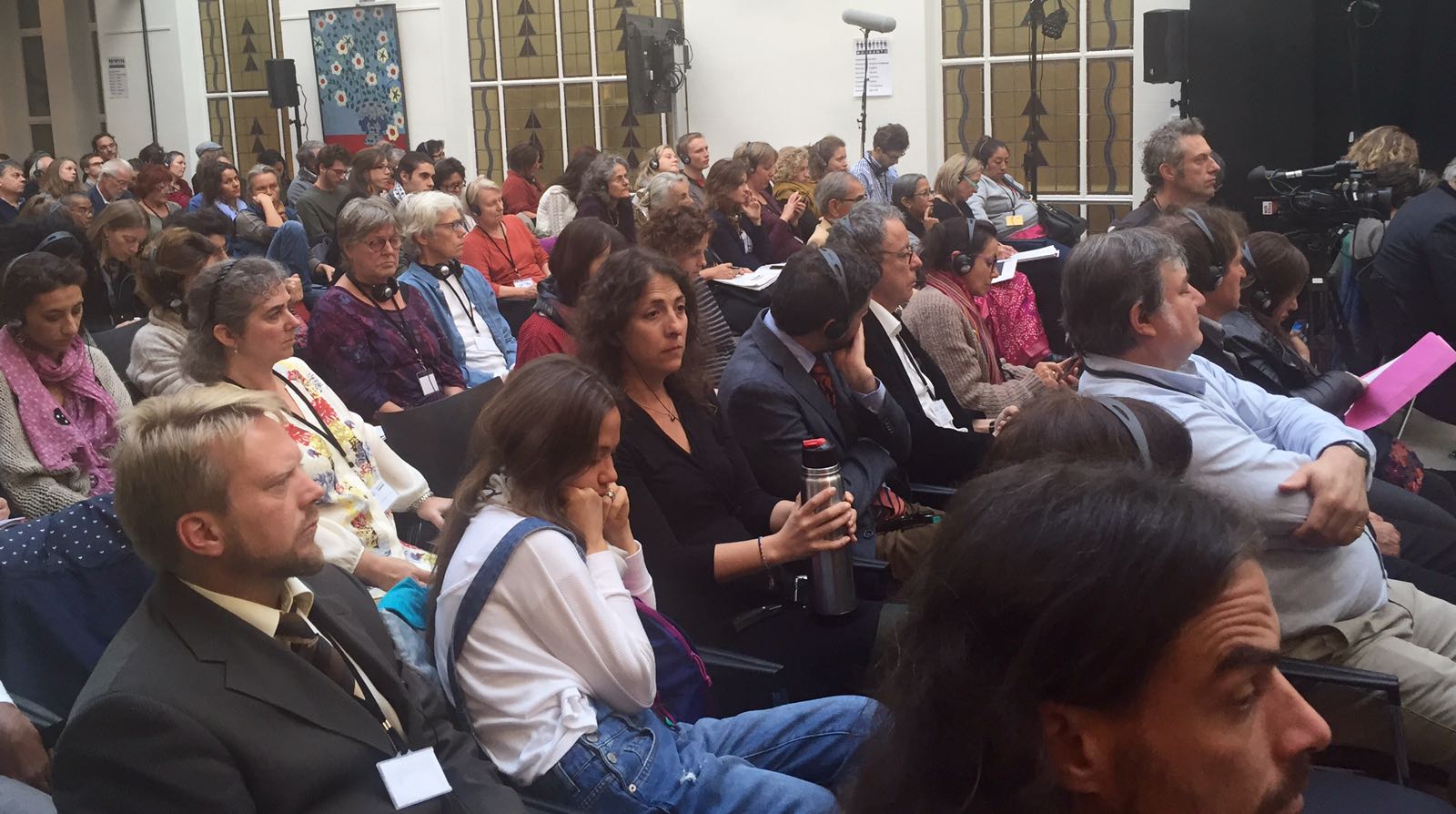
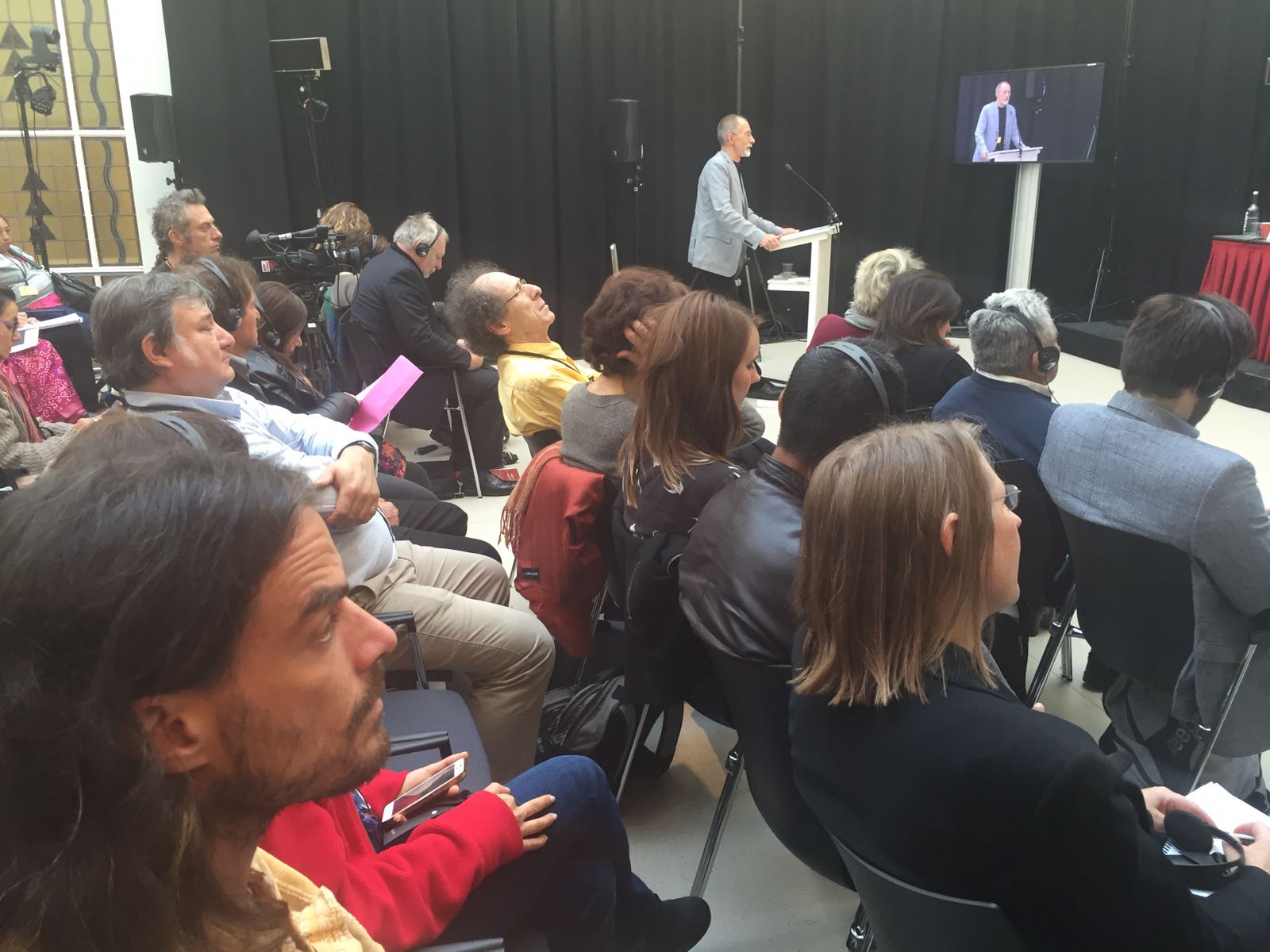
Peter Clausing, toxicologist, Germany
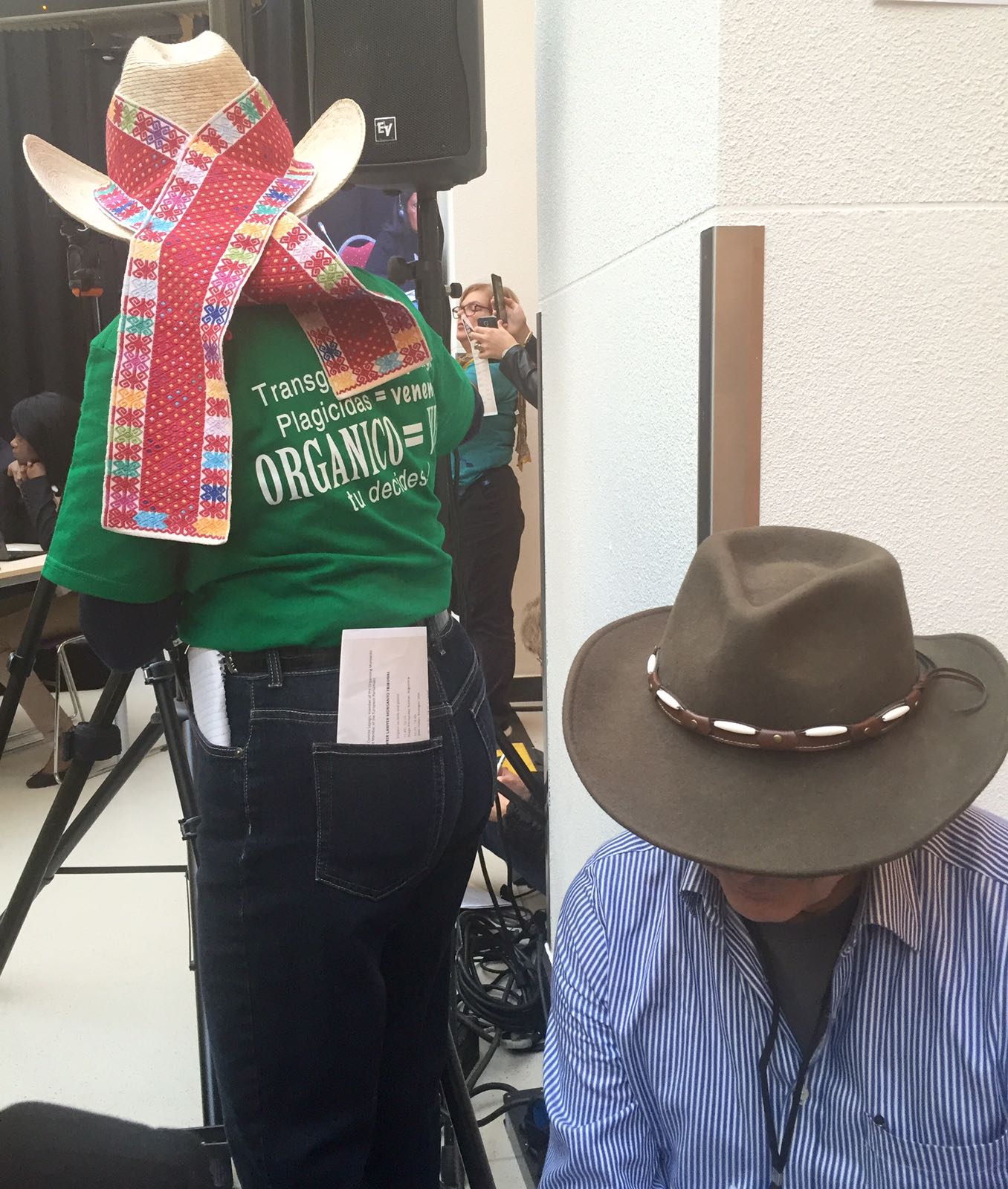
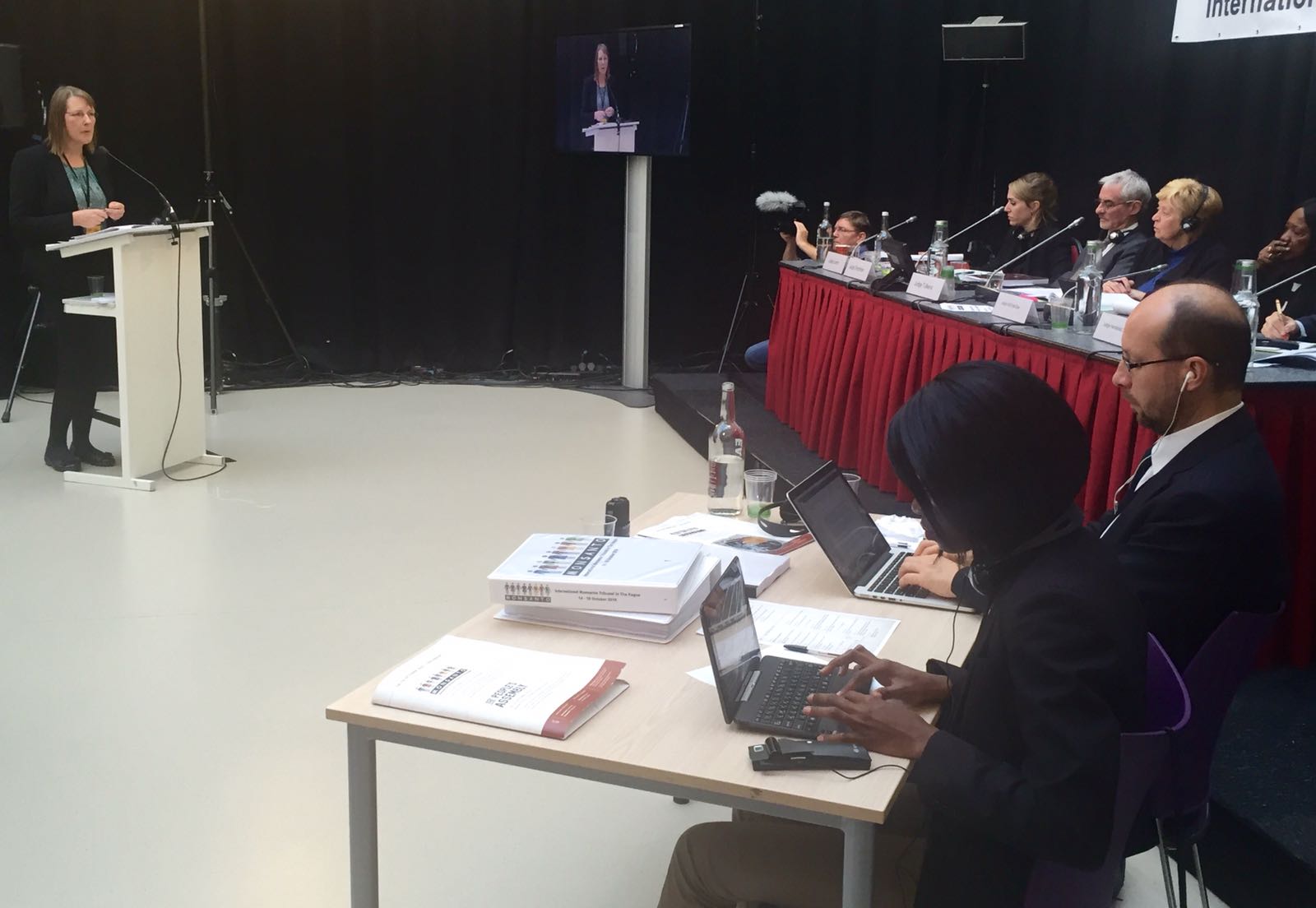
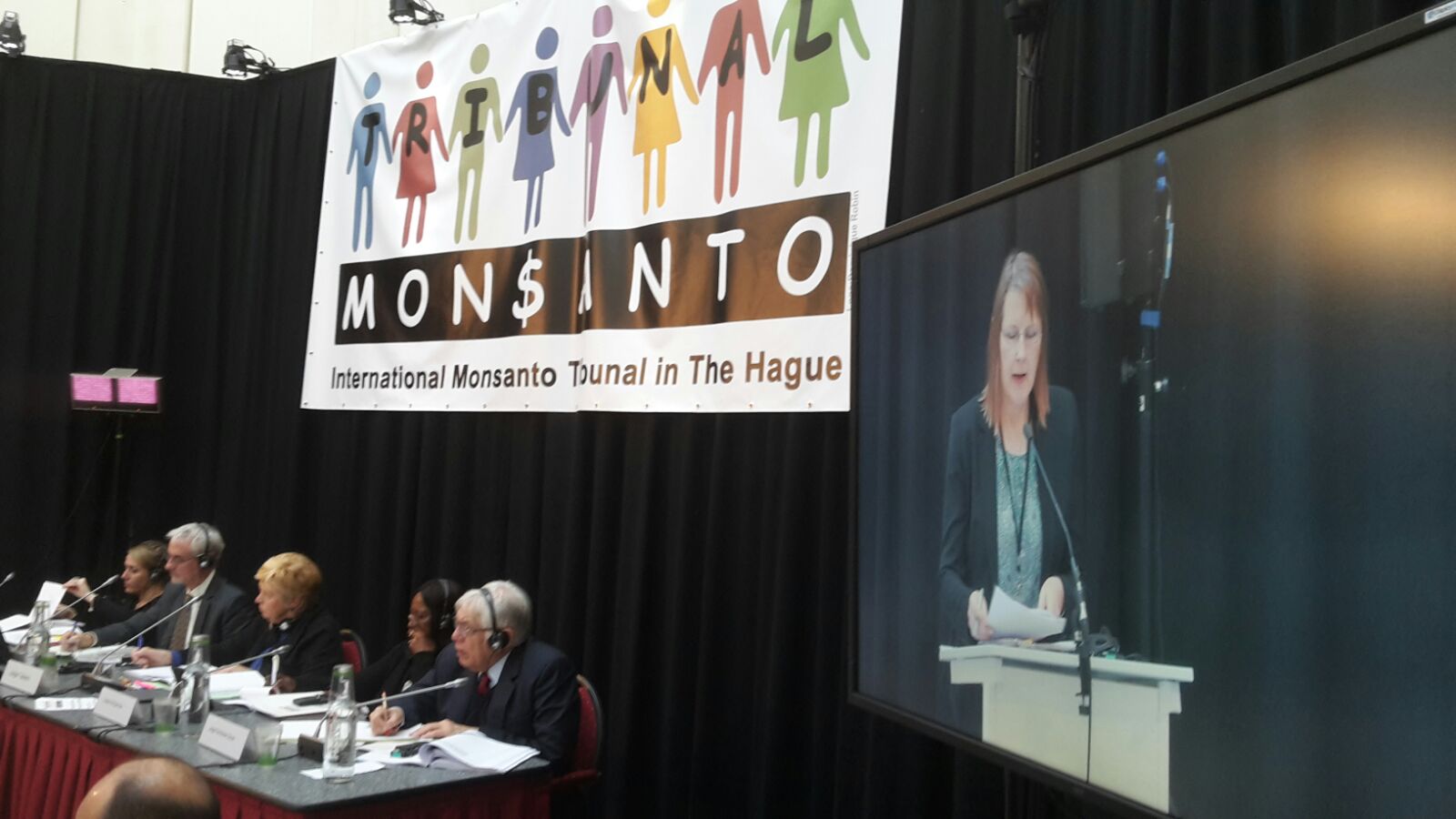
Claire Robinson, academic research, GM WATCH UK
“Monsanto should not have tried to shut down this study as it proves vital evidence for public health.”
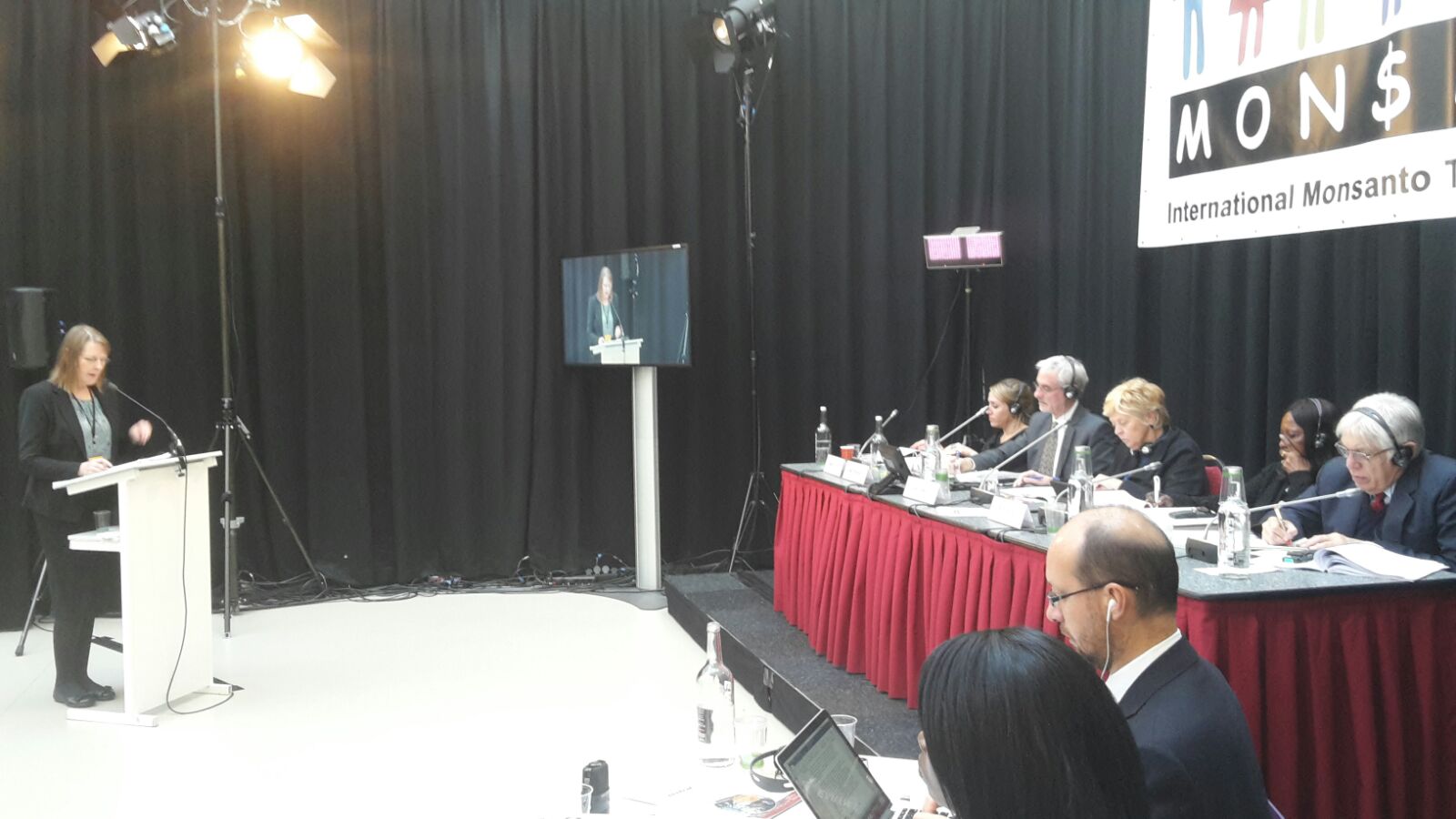
Claire Robinson, academic research, GM WATCH UK
” Industry studies on glyphosate are not peer-reviewed”
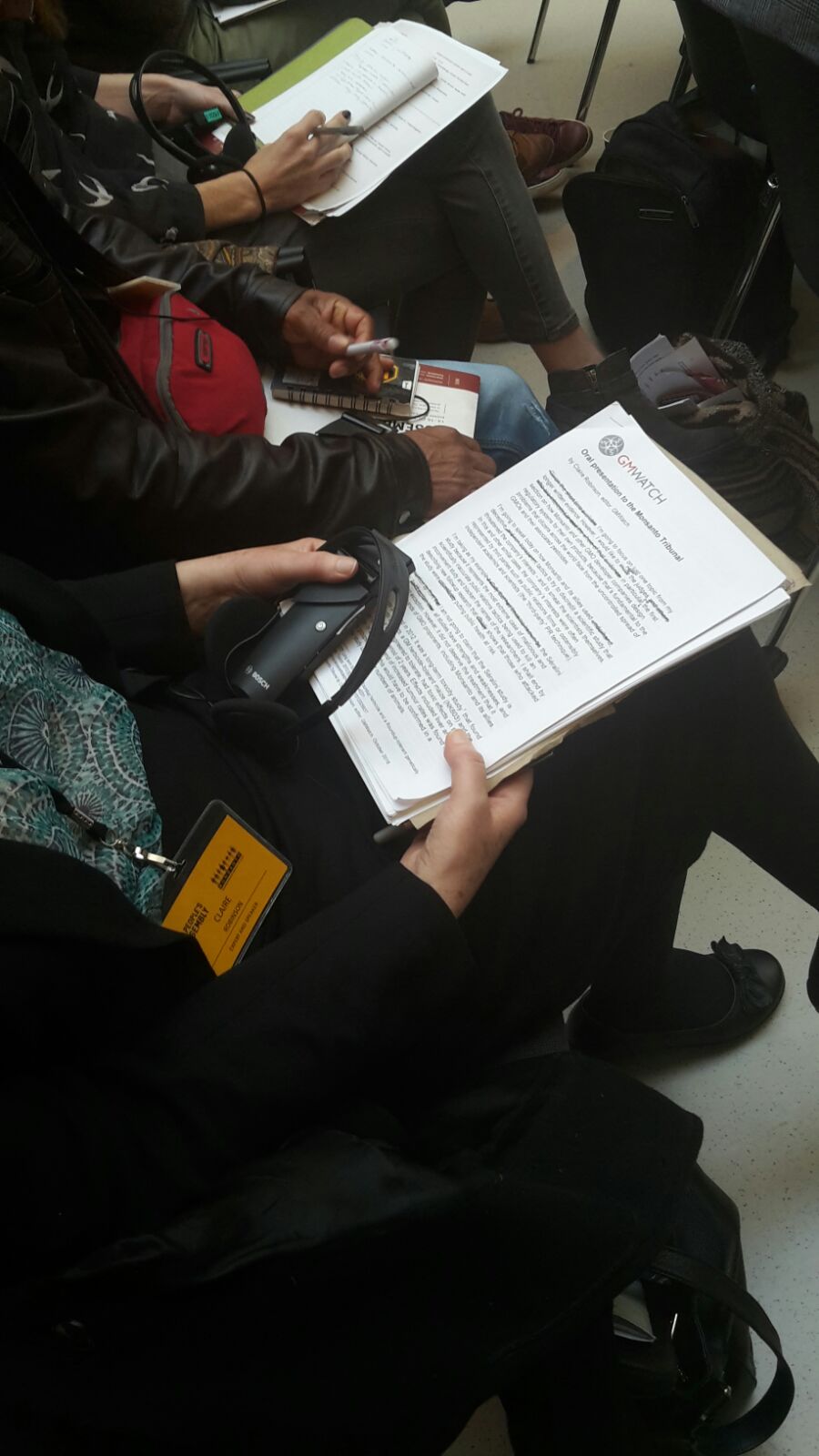
Claire Robinson, academic resarch, GM WATCH UK
“I take the example of Seralini case in order to show that those who attacked his study put the public health at risk. It did not receive the treatment it received from GM components. It was a long term toxicity study showed that GM maize caused liver and kidney damage, increased tumors in most treatment groups, although this would have to be confirmed in a larger study. Within hours of the publication of the study, massive PR campaign denigrate the study. SMC (Science Media Centre) defends and promotes GM technology, it is 70% funded by MNCs, including Monsanto. SMC circulated to media, worldwide, New York Times, Bruce M Chasey , professor of food science at the University of Illonois was exposed to having received a grant from Monsanto, 57million dollars. He failed to disclose this relationship with Monsanto.”
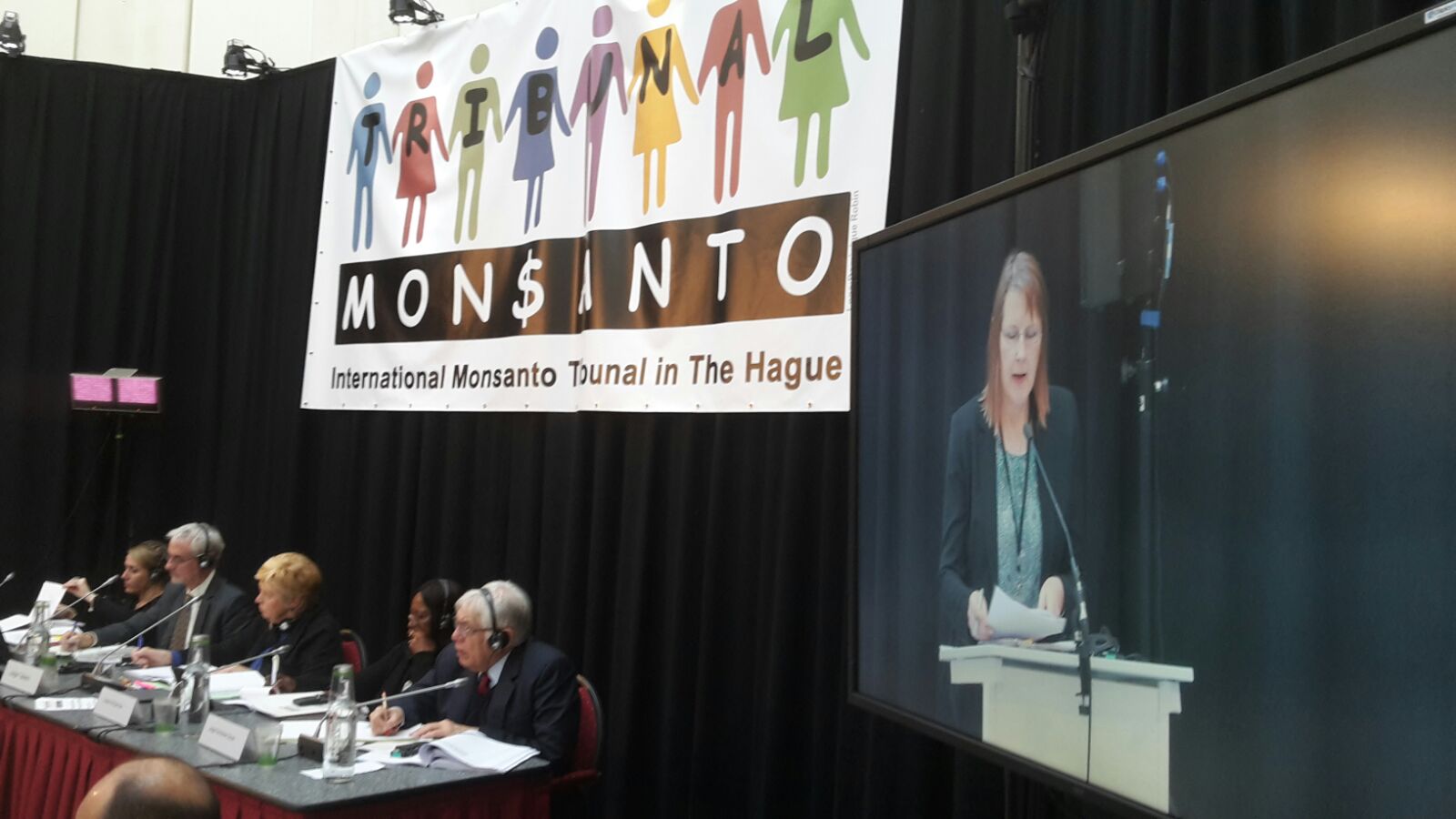
12.05: Beginning of intervention by Claire Robinson (academic research, UK)
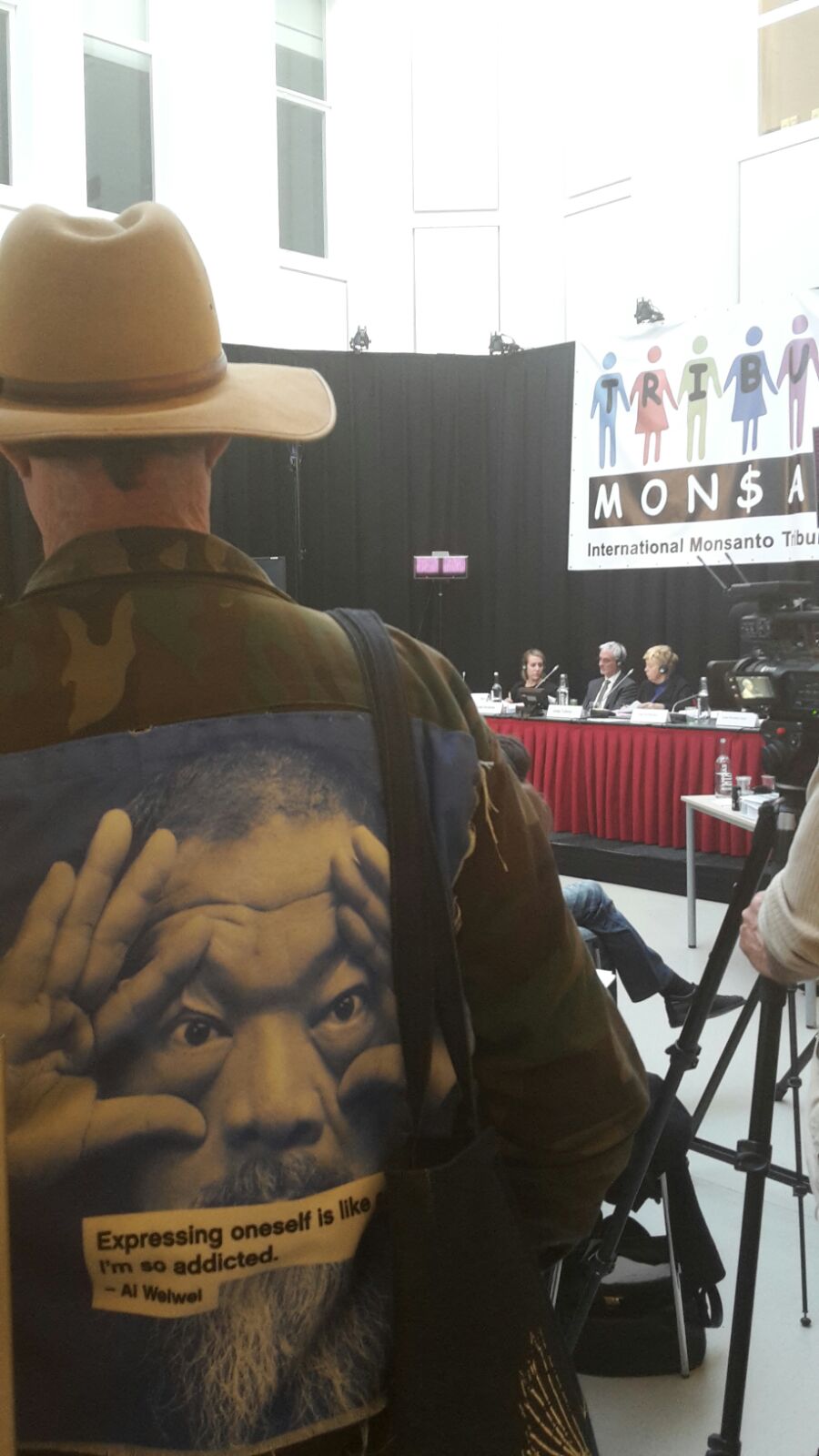
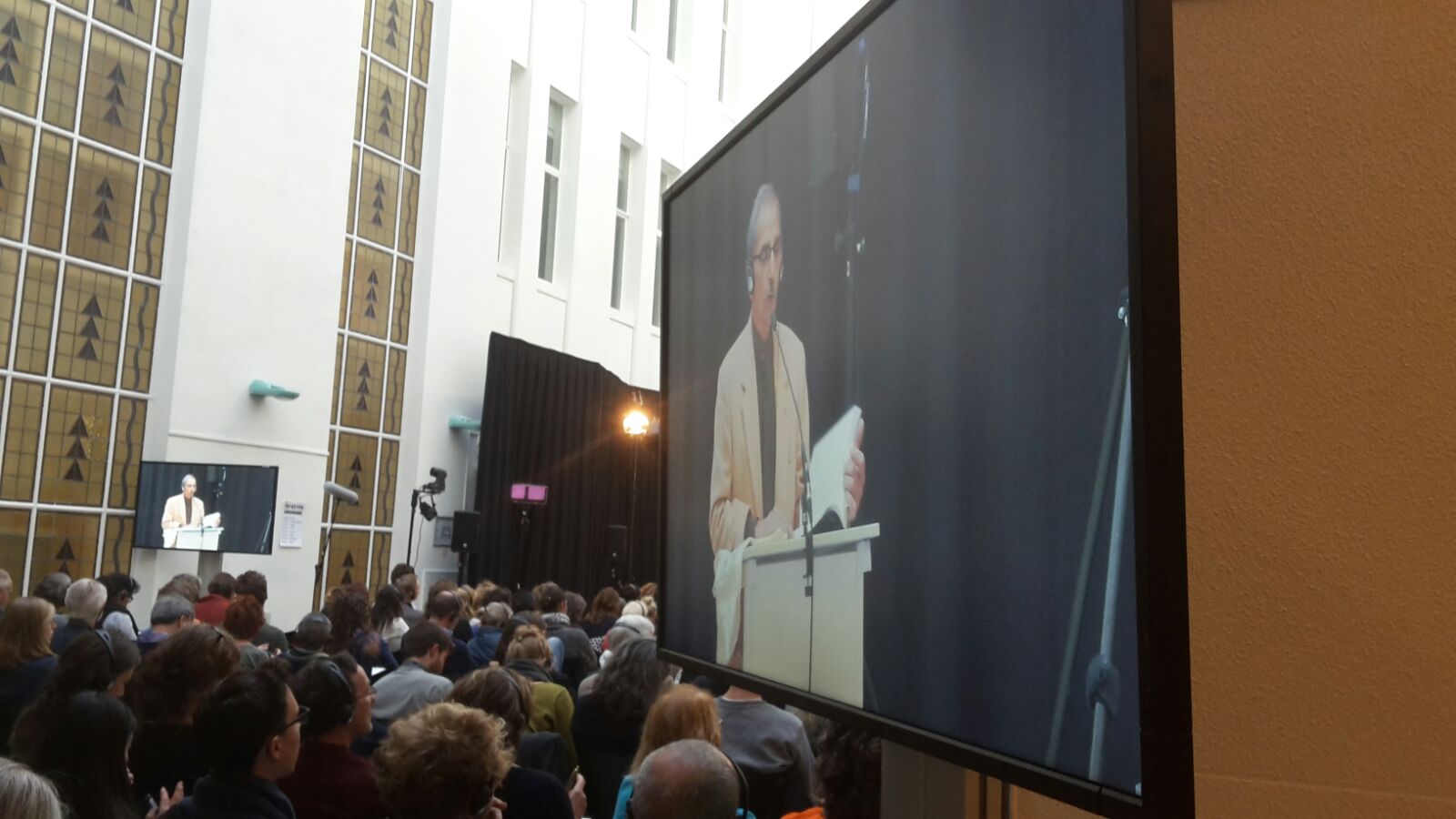
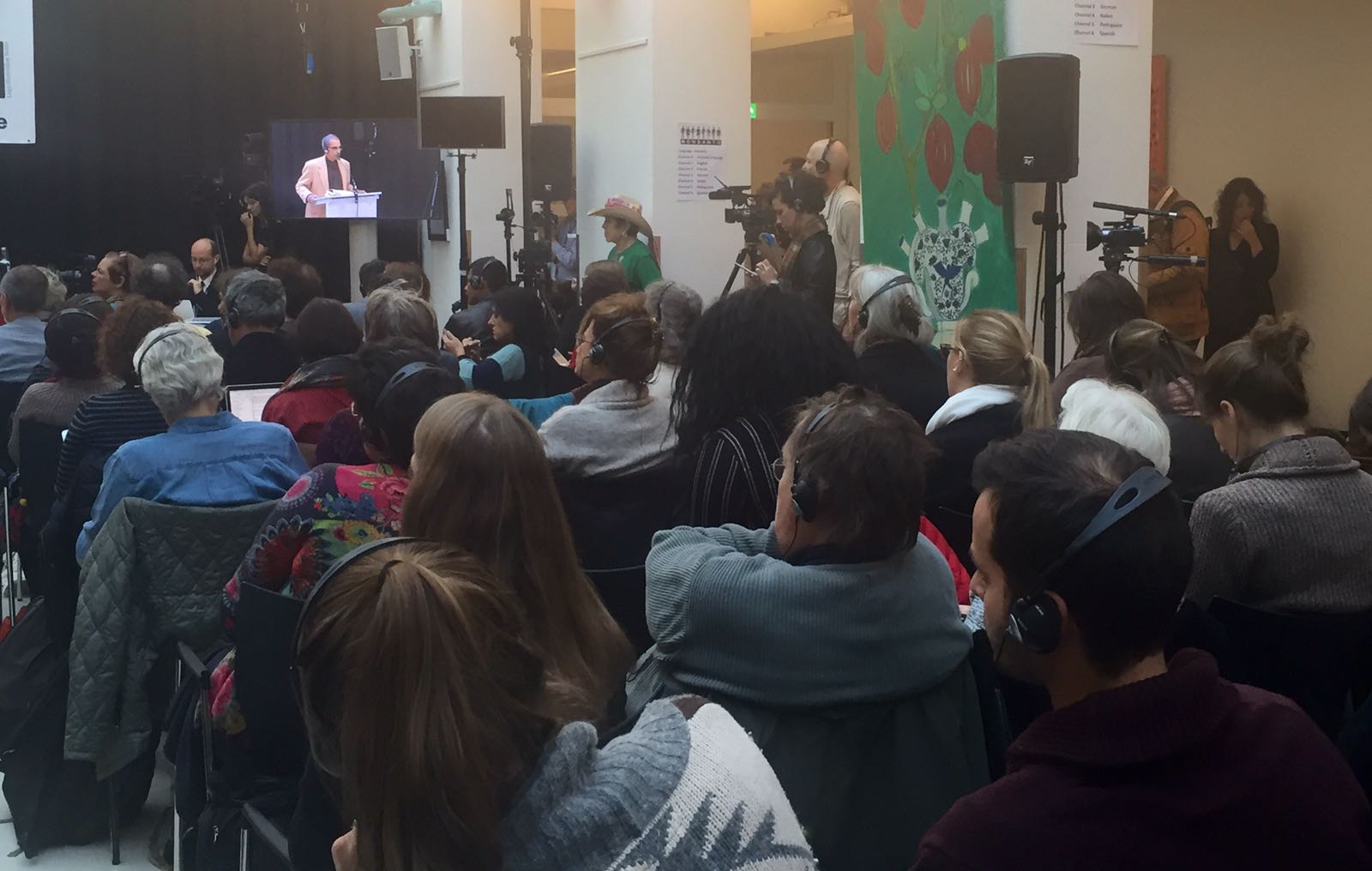
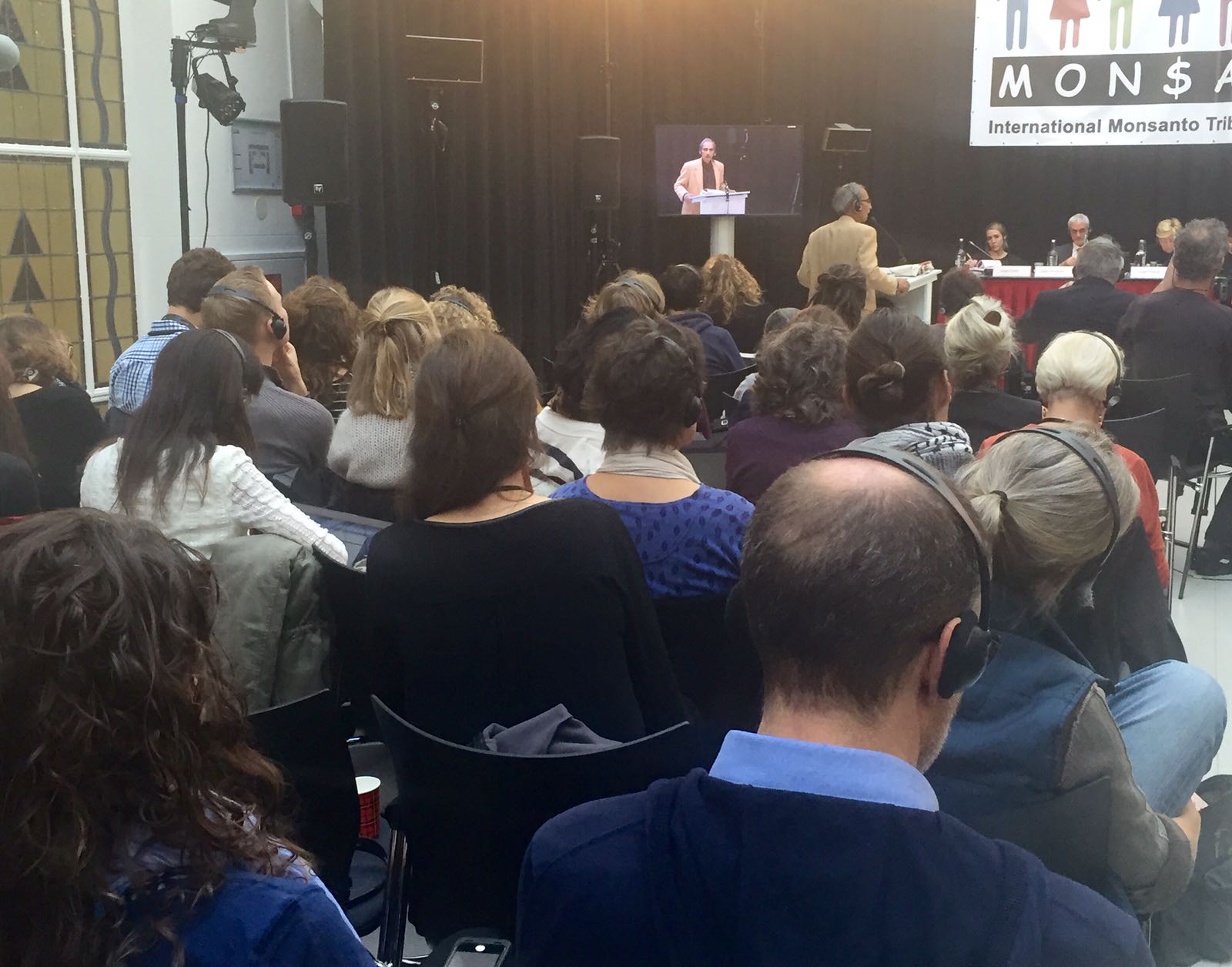
Shiv Chopra, expert regulatory egency, Canada
“I never said my behavior was going to change, I published a book, I am a whistleblower, I am a government official, I have the protection of the law.
On page 154 there is Monsanto’s manifesto announced in 1990 that they are going to take over the world, and they have, the white house
On page 214 you have a title saying “Bayer Beware” it was Bayer’s antiobiotic that I refused to approve.
On page 303 department of what the government is doing, which is dangerous to the public.”
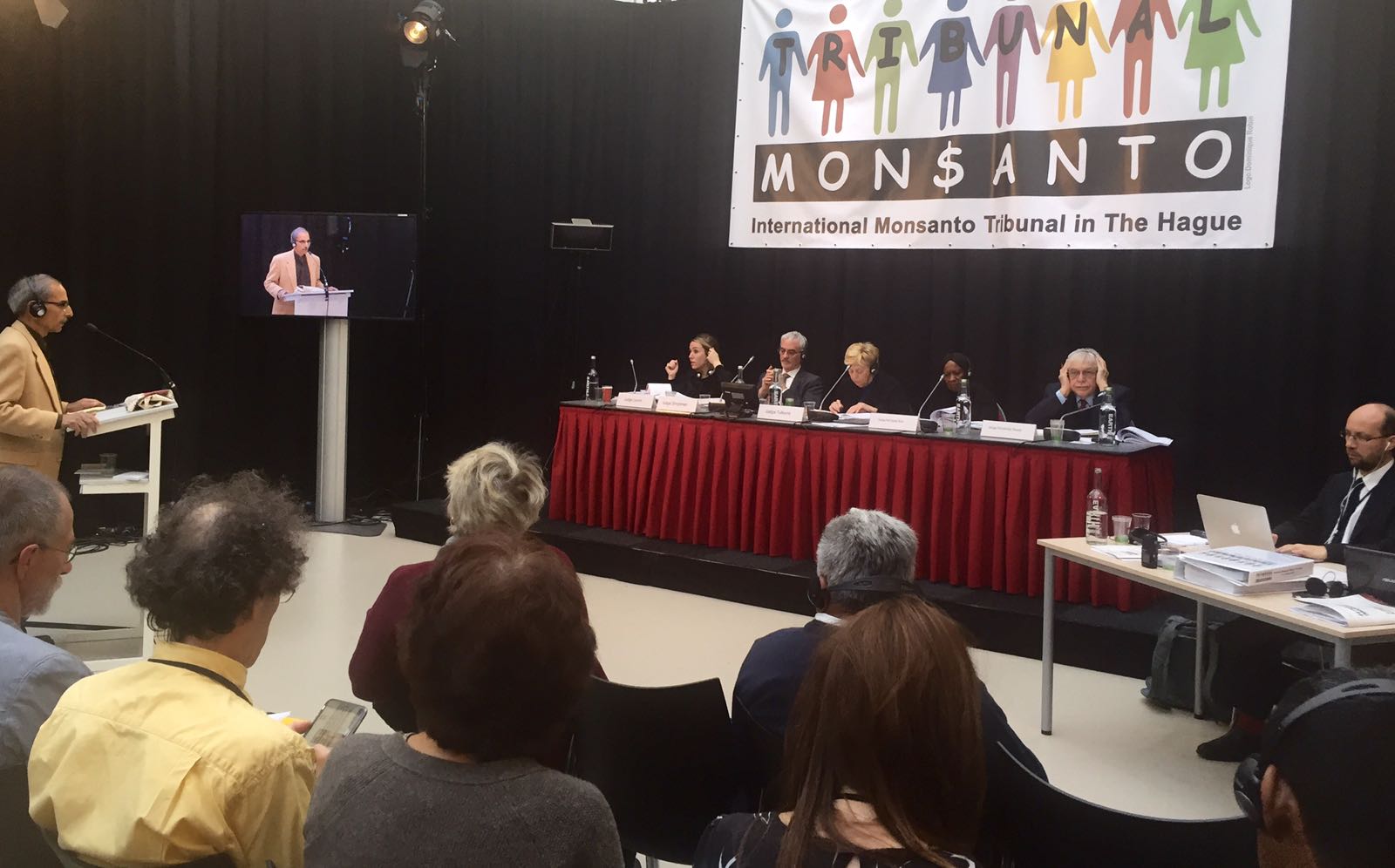
Shiv Chopra, expert regulatory egency, Canada
“Hormones, antiobiotics, slaughter house waste being fed back to animals, glyphosate, all these products are illegally approved. So when we come here blaming Monsanto we have to recognize that the USDA employee is a Monsanto official, recommended by the President of the US.
Suspended and gagged, I cannot speak anywhere. I cannot go anywhere, so where am I living? This is Canada. The federal fuled in my favour, but now I’ve blown the whistle, now its my obligation to go public.
Two of my colleagues and I were dismissed – they asking us to sign off on things for which we did not have the data – illegal to ask this.”
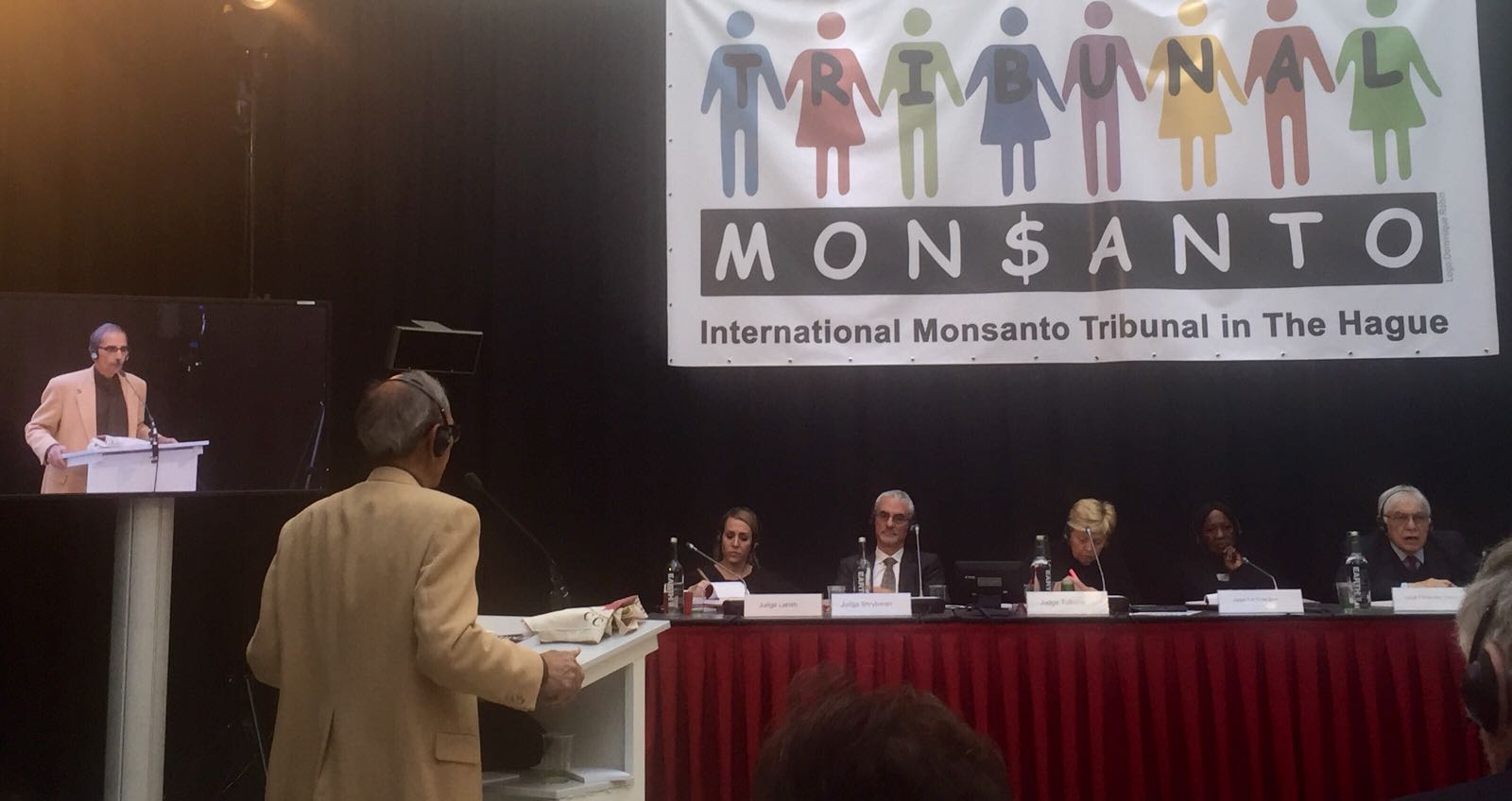
Shiv Chopra, expert regulatory egency, Canada
“Everyone seems to be talking about Monsanto and whenever they talk about their countries they seem to say their country made a mistake, or their prime minister took an award.”
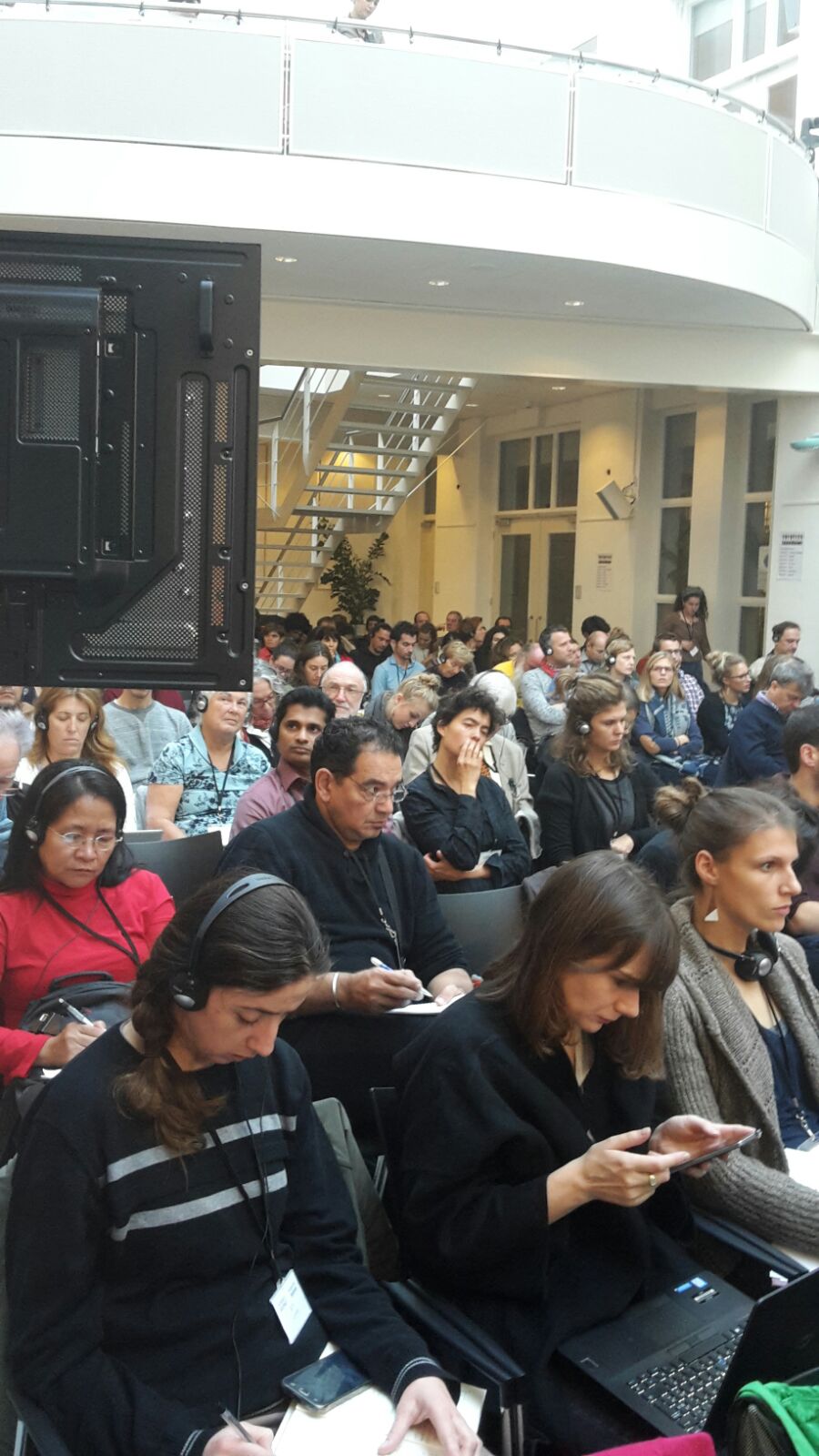
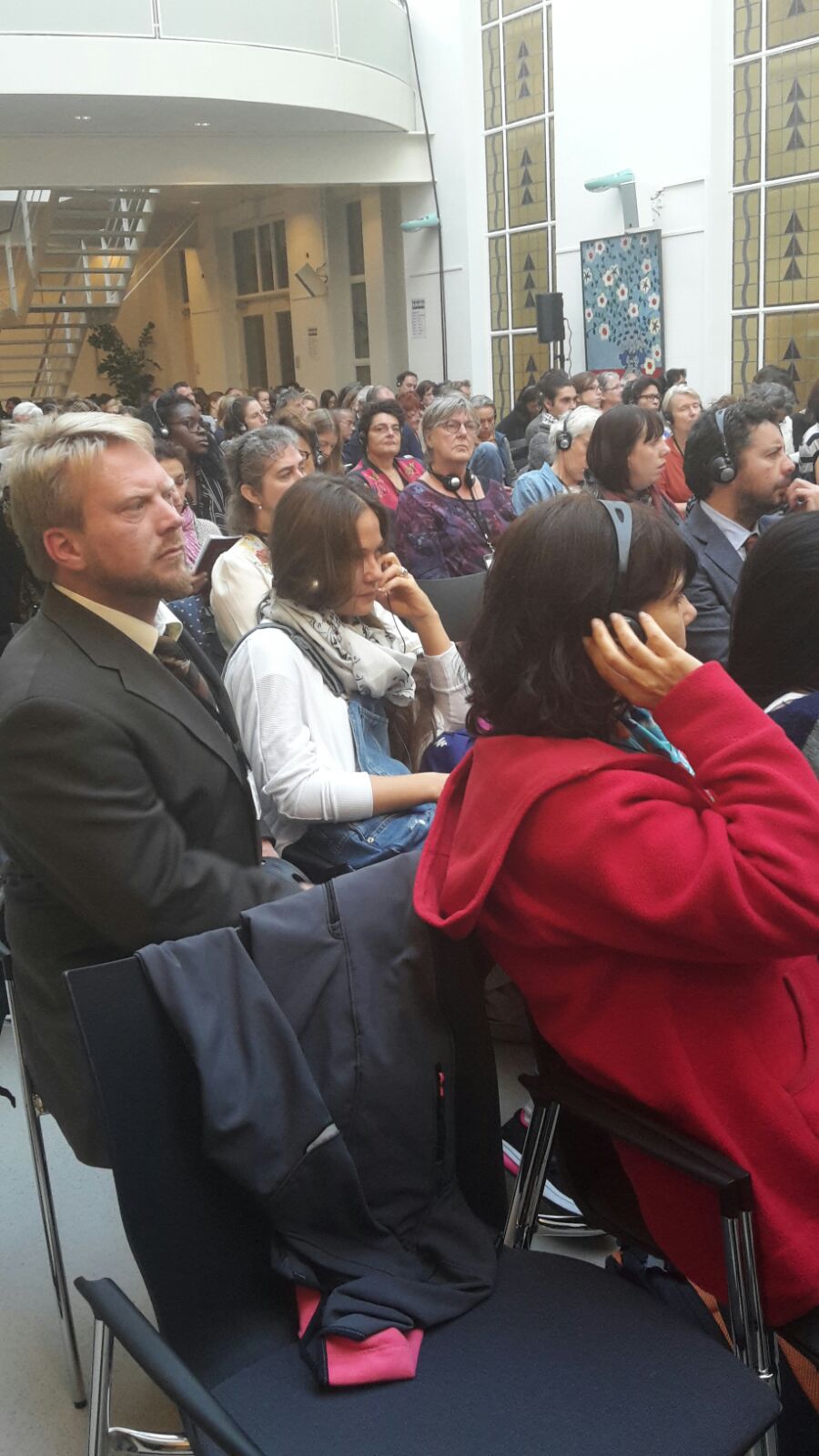
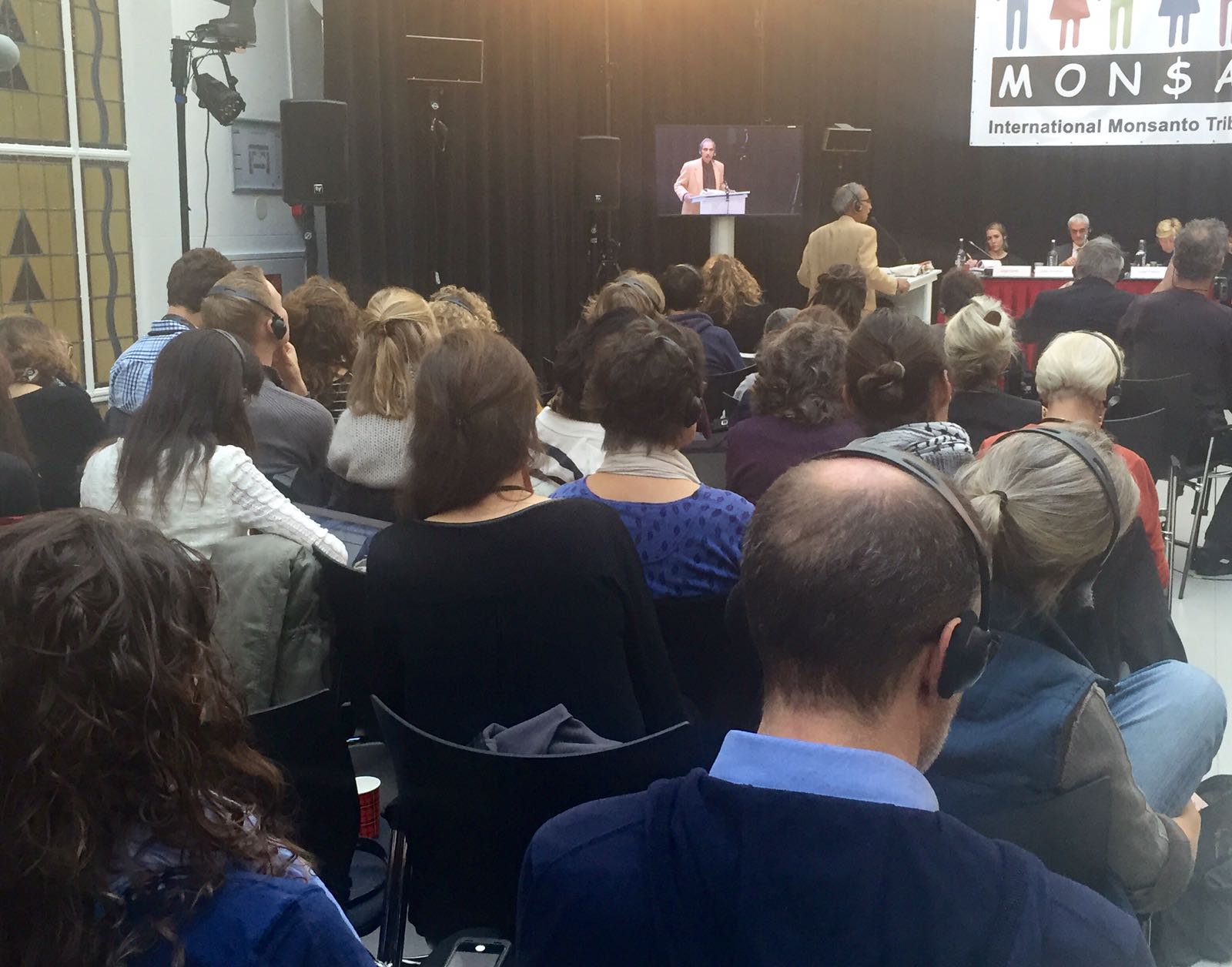
11.40 – 12.95 Shiv Chopra’ s intervention, expert regulatory agency, Canada
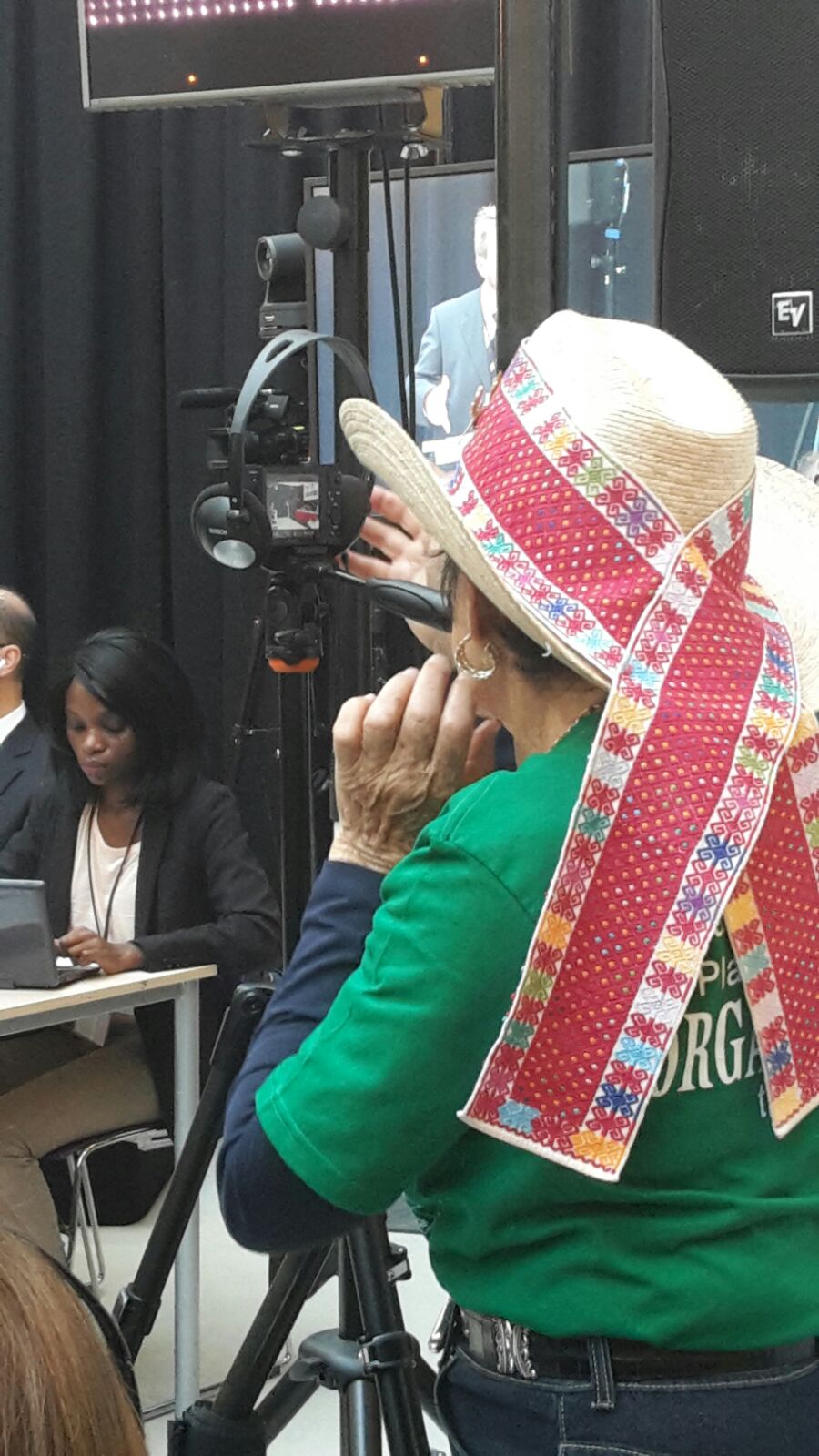
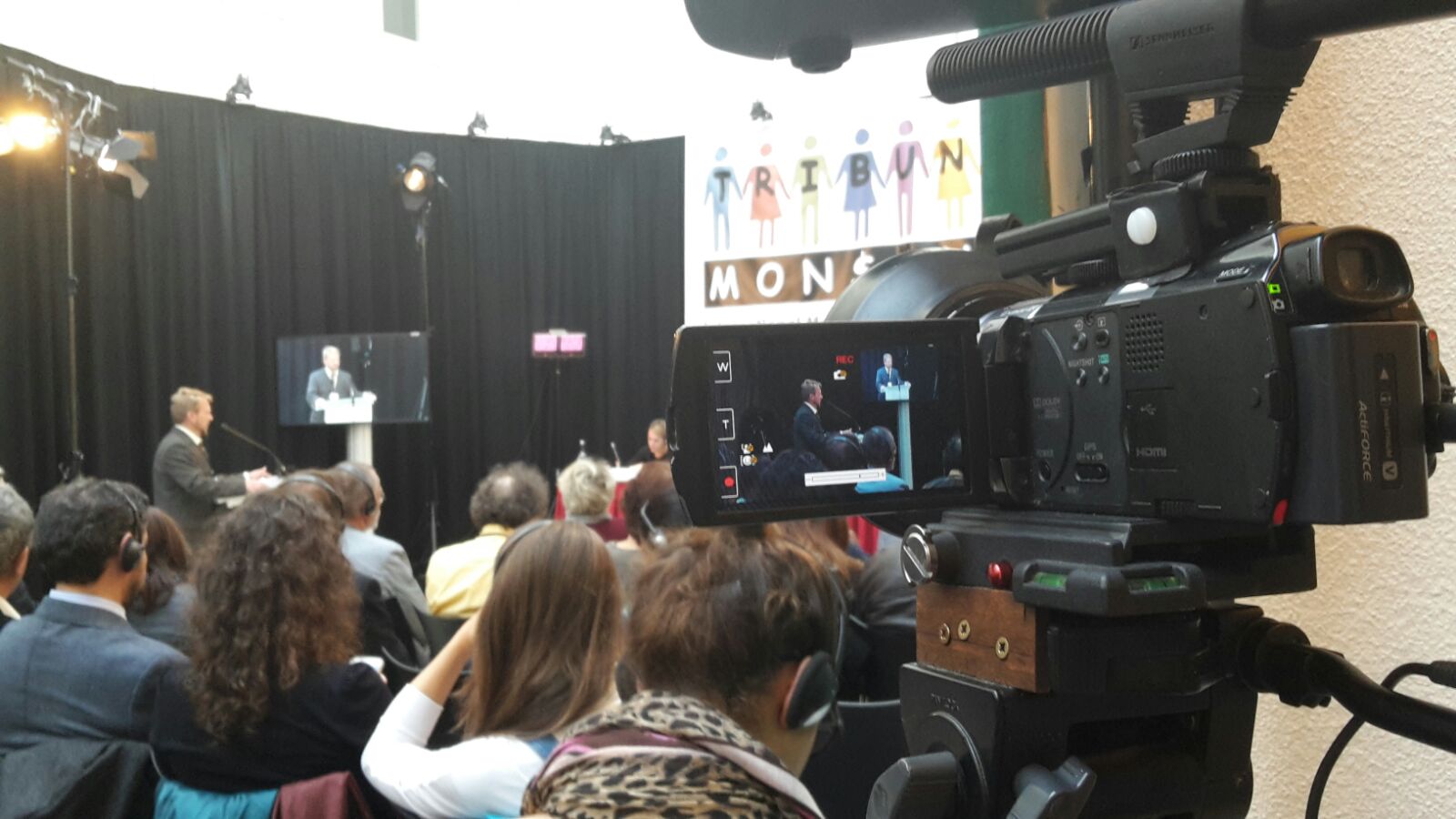
Nicholas Debarge “We have three studies that shows theres a connection between Glyphosate, Round Up and the counter effects. You can ask yourself what is the value of studies and examinations conducted by companies, when the question is so where is the truthful science?”
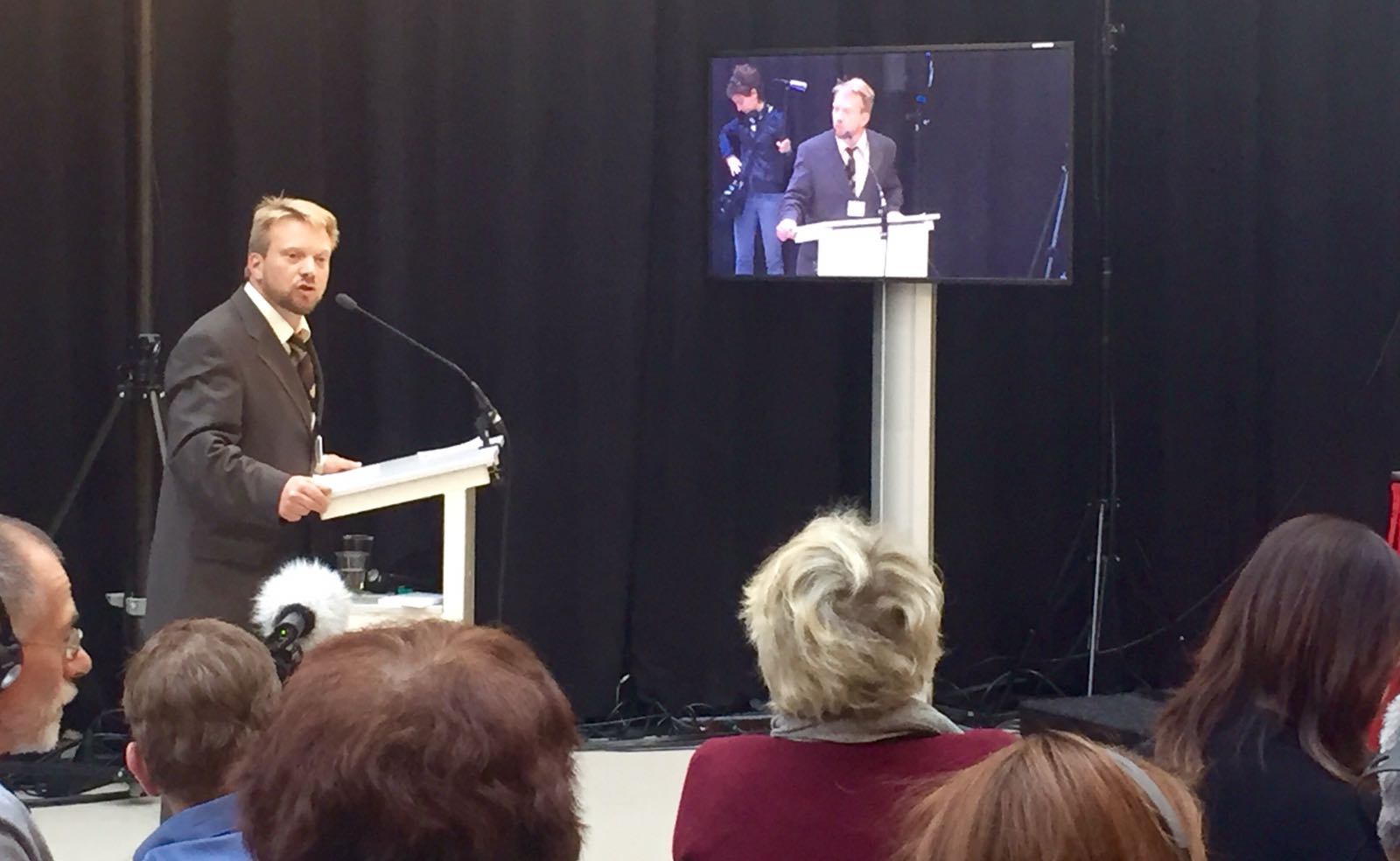
Nicholas Debarge: “Studies from Monsanto have not been published in any scientific magazines. In Roundup, for example, glyphosate it is not the only toxic that needs to be addressed, the other additives are more toxic and dangerous because there is a synergestic effect. Where is the truthful science here?”
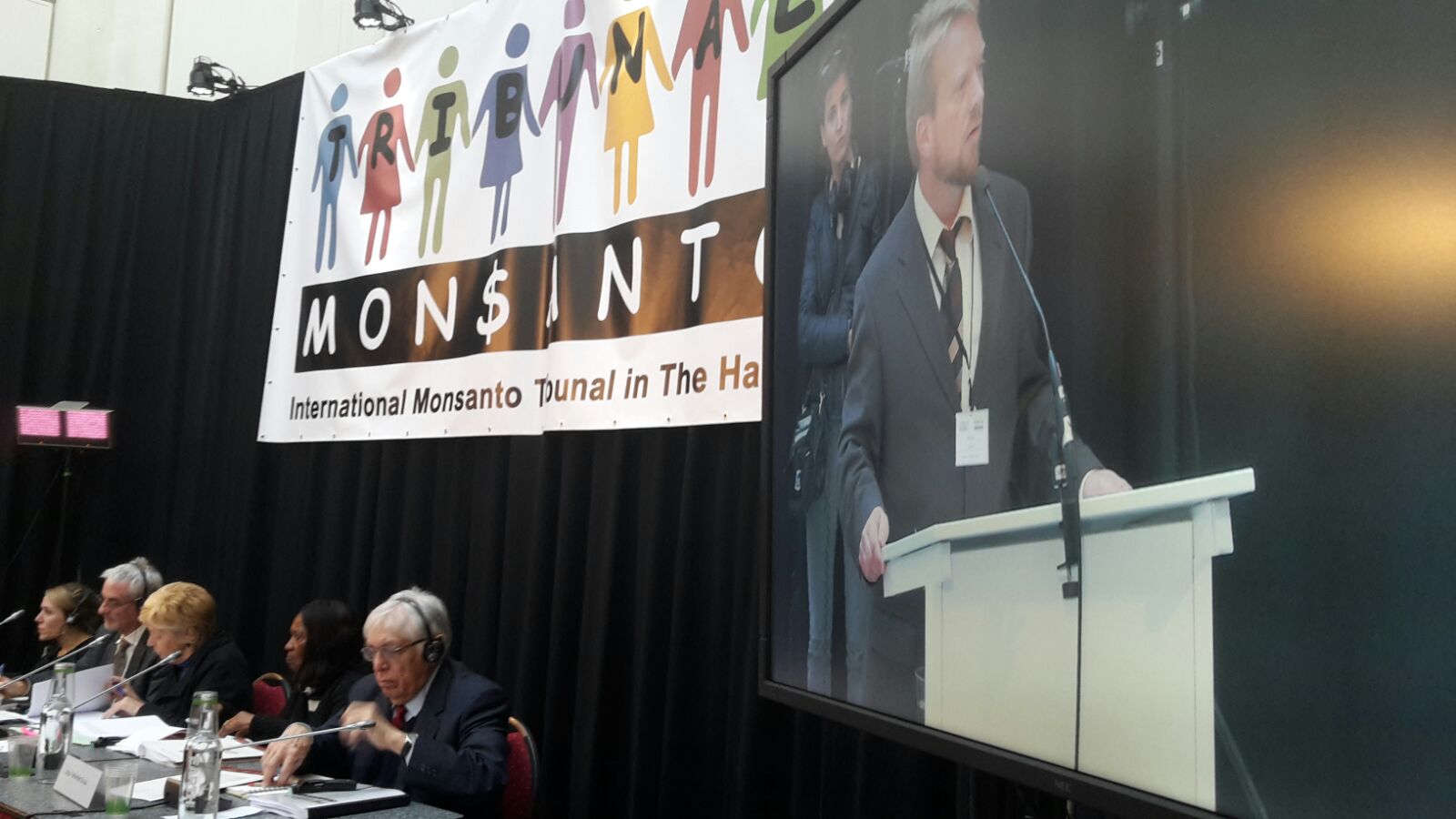
Nicholas Debarge “I am a biologist, I have been working in the research group of Seralini for several years. We defended the study in front of the Supreme Court in France to say we are fighting against major companies. I have been listening to the evidence since yesterday and we do hear the damages across the world. We are often accused asscientisits, this is something worse than doping a professional, its so damaging for your career. Now people are talking about dishonesty and fraud. The court so far only decided in favour of us. So whats the main point, the criticism of our study was spread throughout the media and the whole world and we can say we continue to publish in scientific journals, we have won all these scientific lawsuits, the outcomes wasn’t published as much as the ngative media before that. If you go onto the internet the Seralini affair, you can see pages and pages of writing written by people paid by Monsanto. We were slandered, and that’s why we have to fight against it. there is a lot of pressure put on us. Many people say these papers cannot be published.”
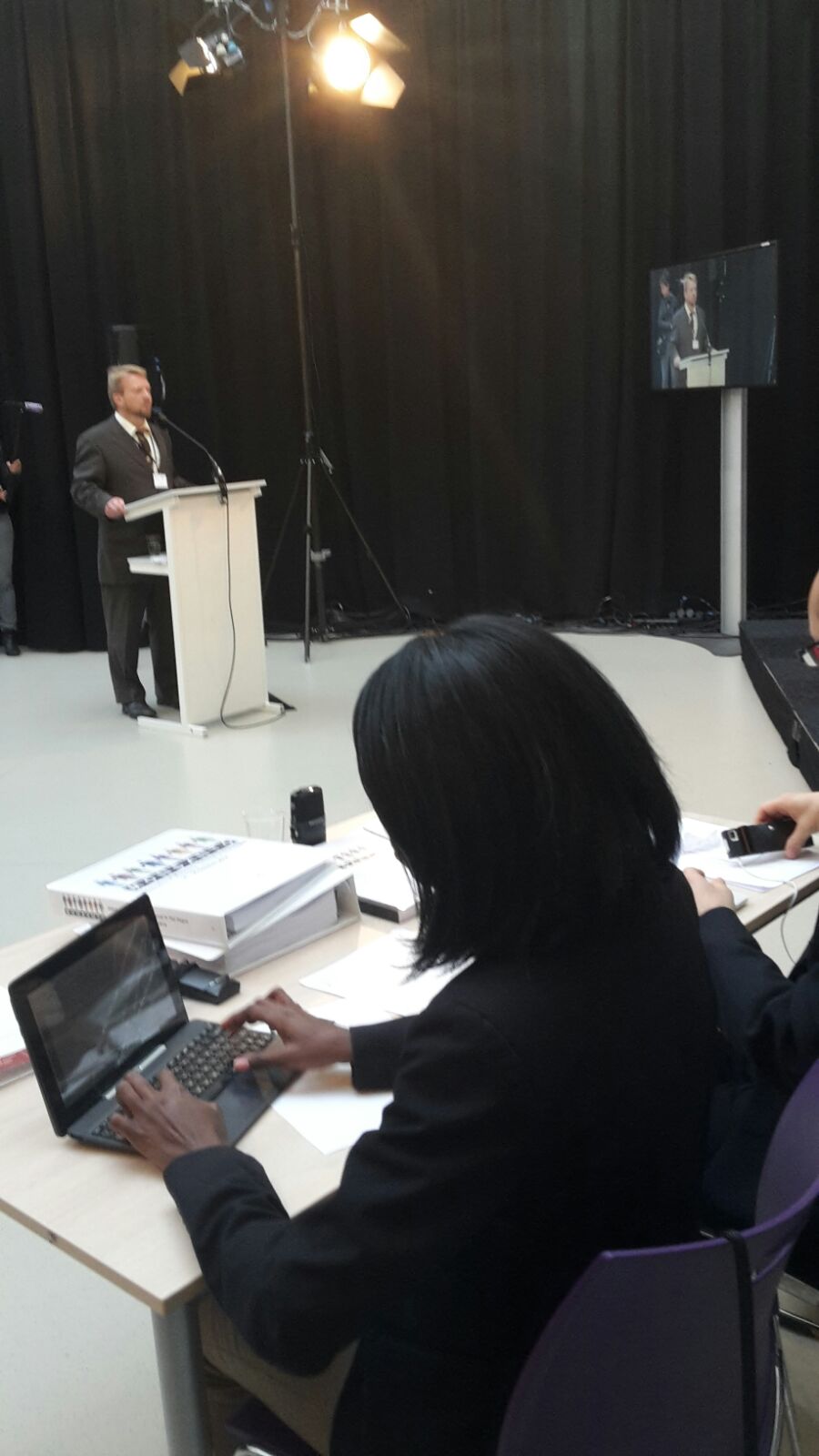
11.10: French biologist Nicholas Debarge intervenes in substitution of Prof. Gilles-Eric Séralini

Angelica El Canche, Mexican beekeepers
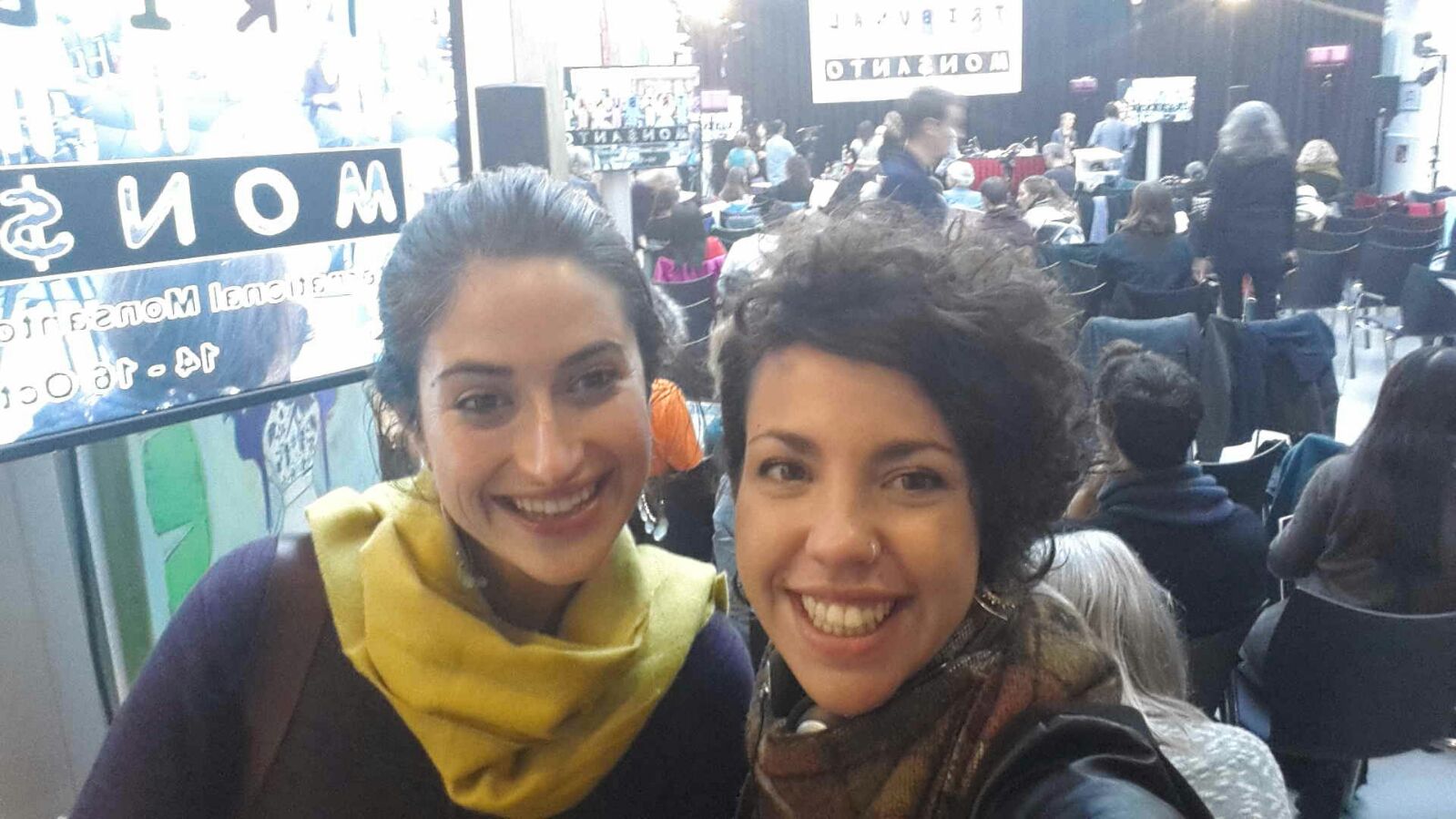
Navdanya volunteers in charge of the Tribunal media coverage, Barbara Barcelo Gracia and Michela Papotti
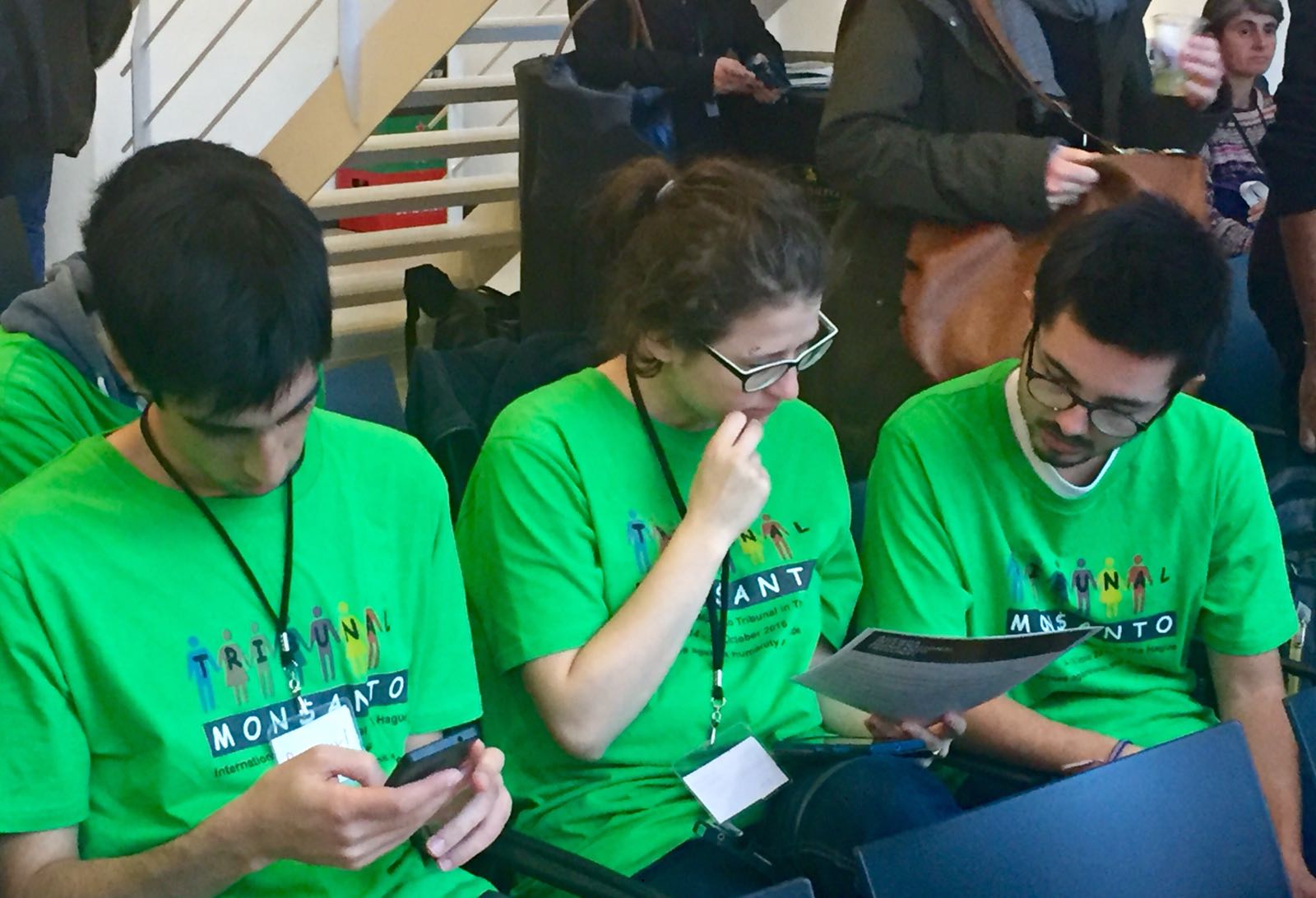
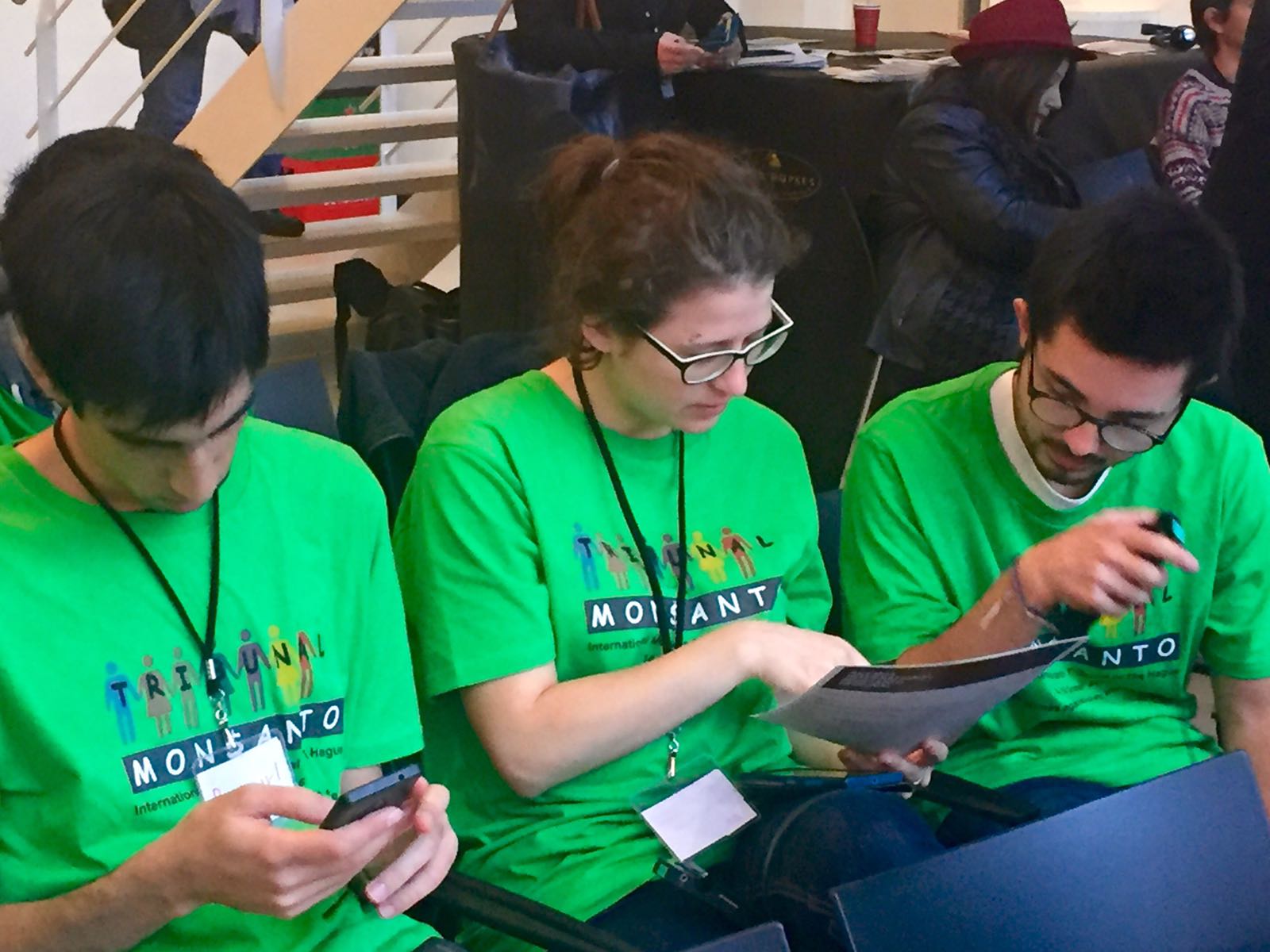
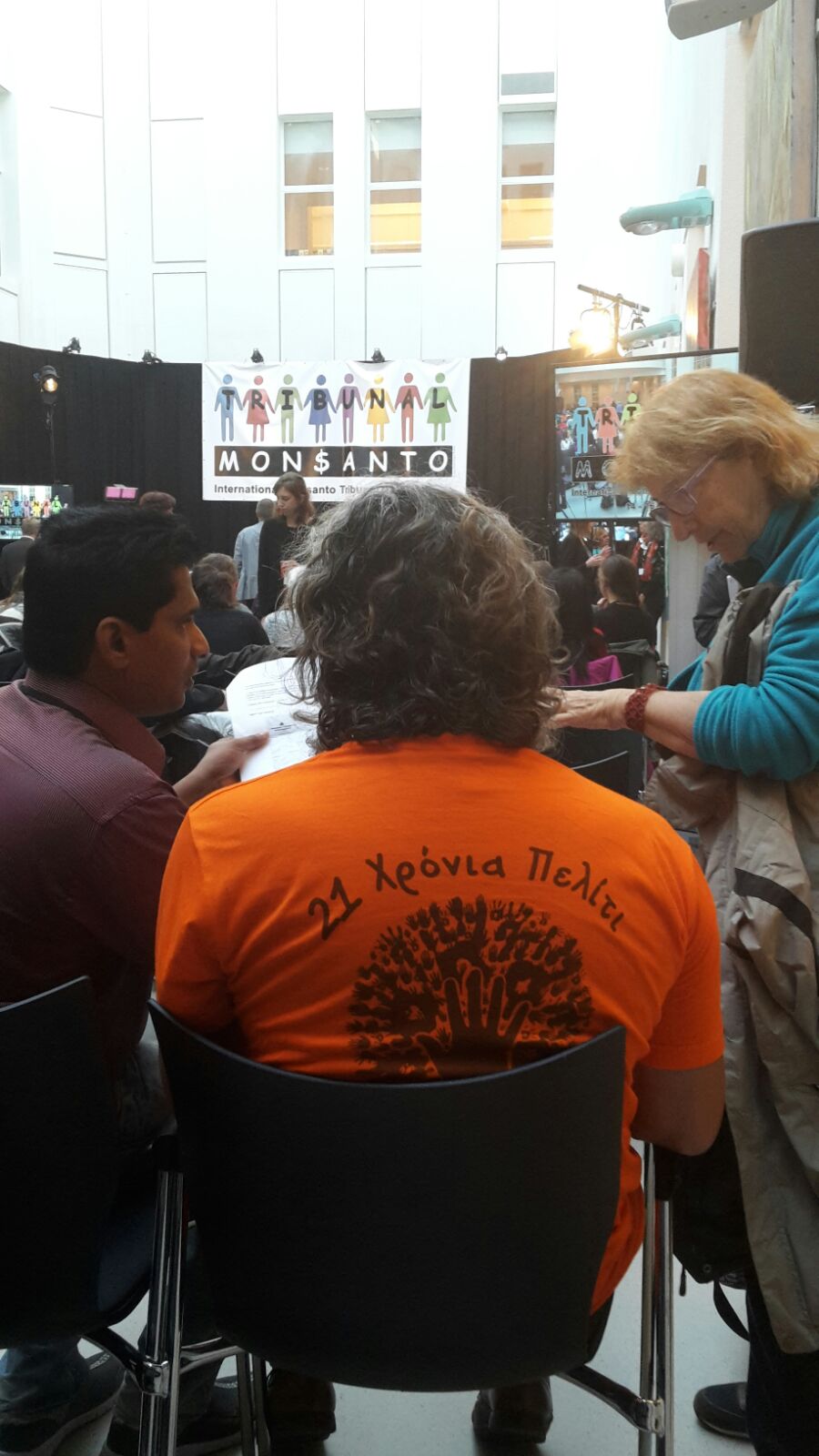
11.00: Panagiotis Sainatoudis from Peliti (Greece) and his team are present at the Monsanto Tribunal!
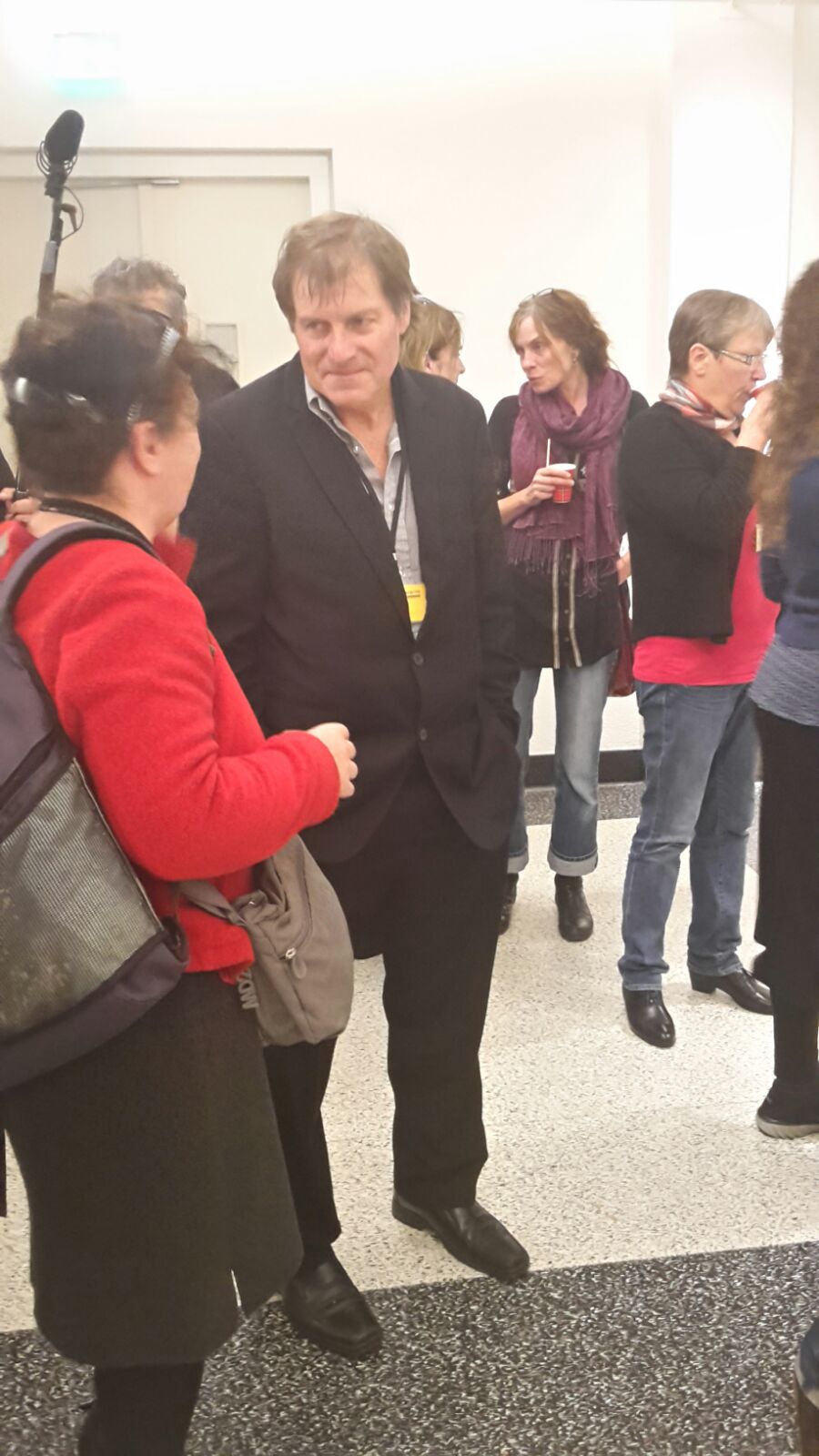
Steve Marsh, Australian farmer
victim of contamination by Monsanto GMOs
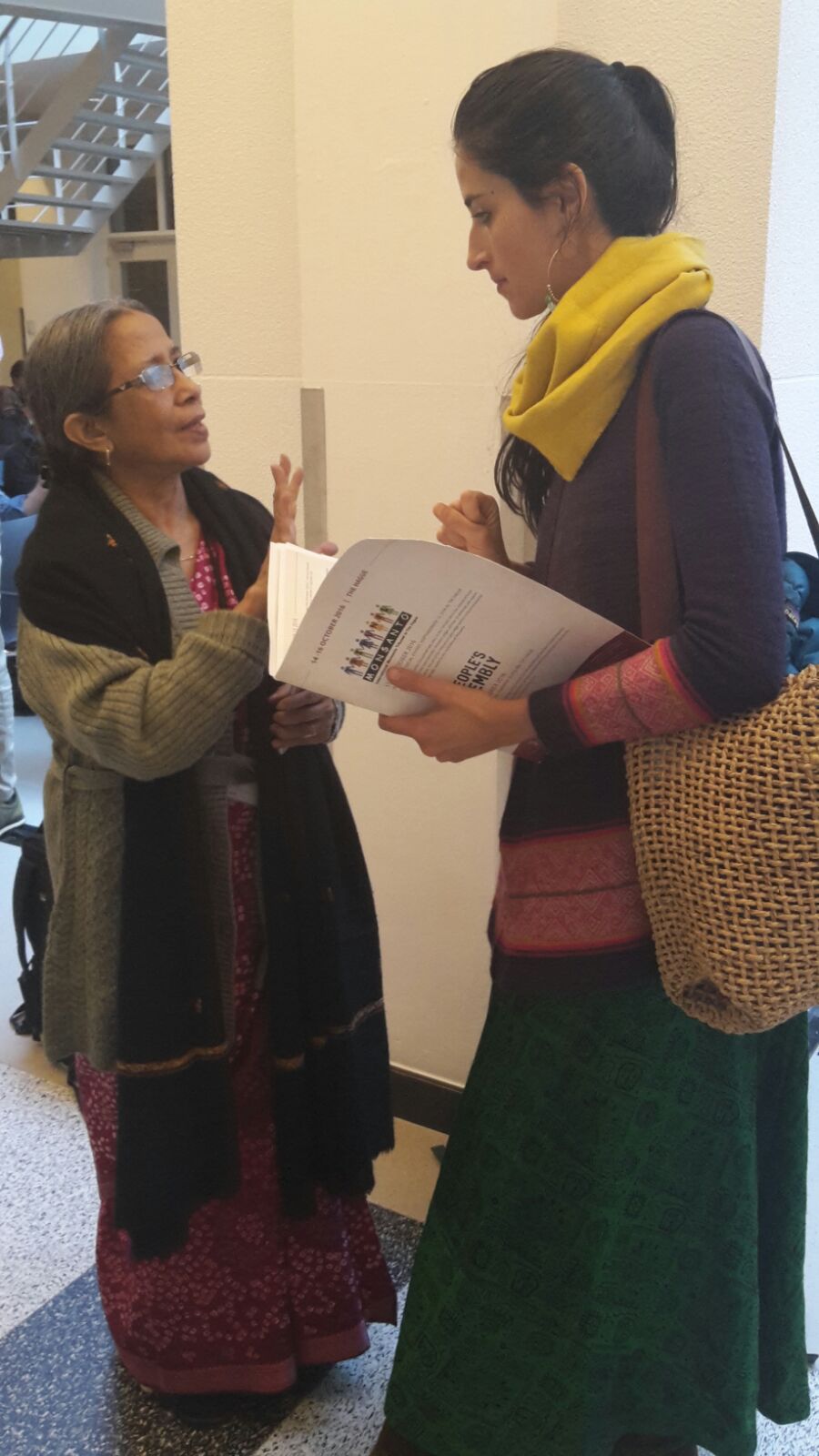
Farida Akhter and Navdanya volunteer Barbara Gracia
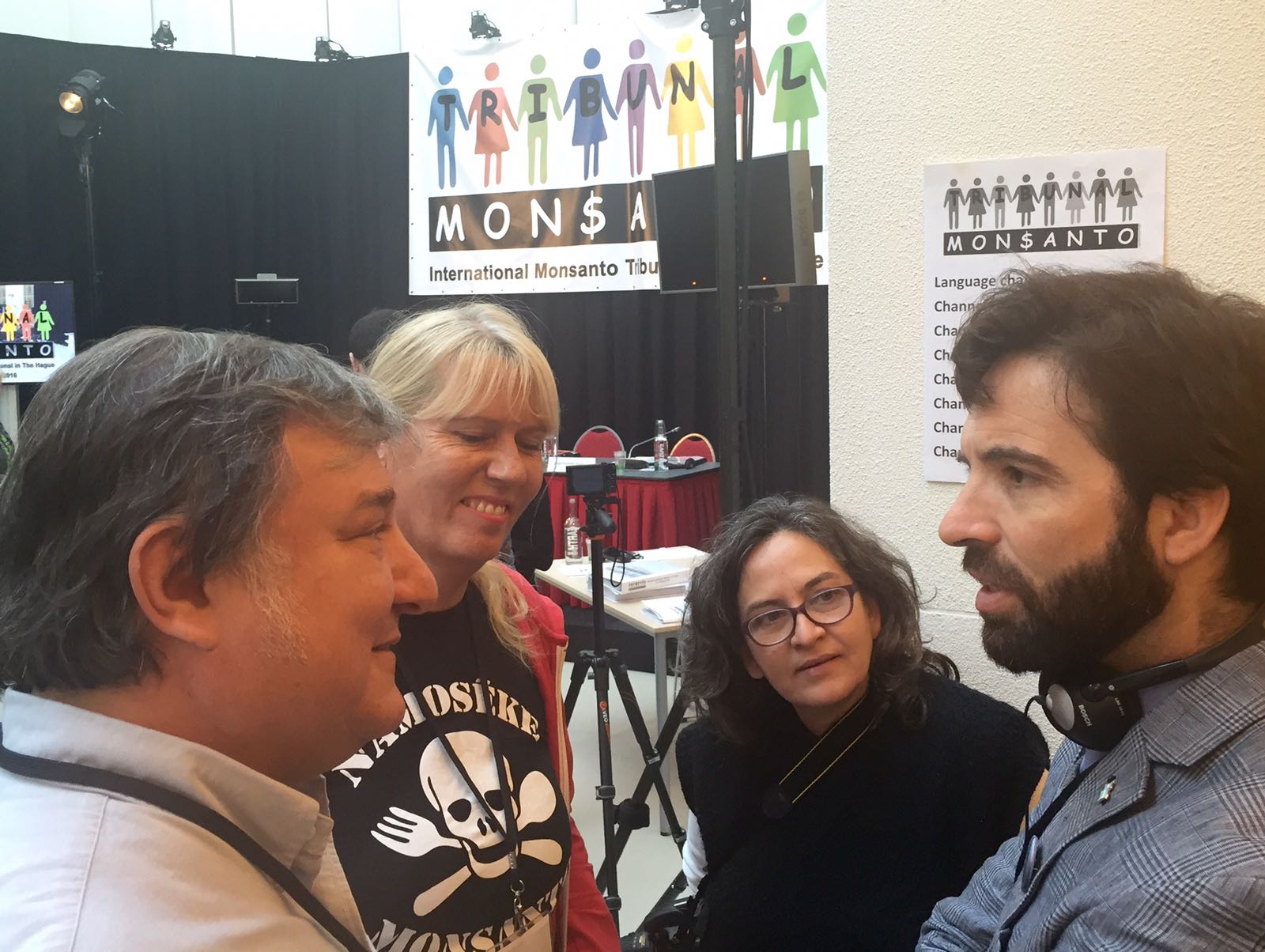
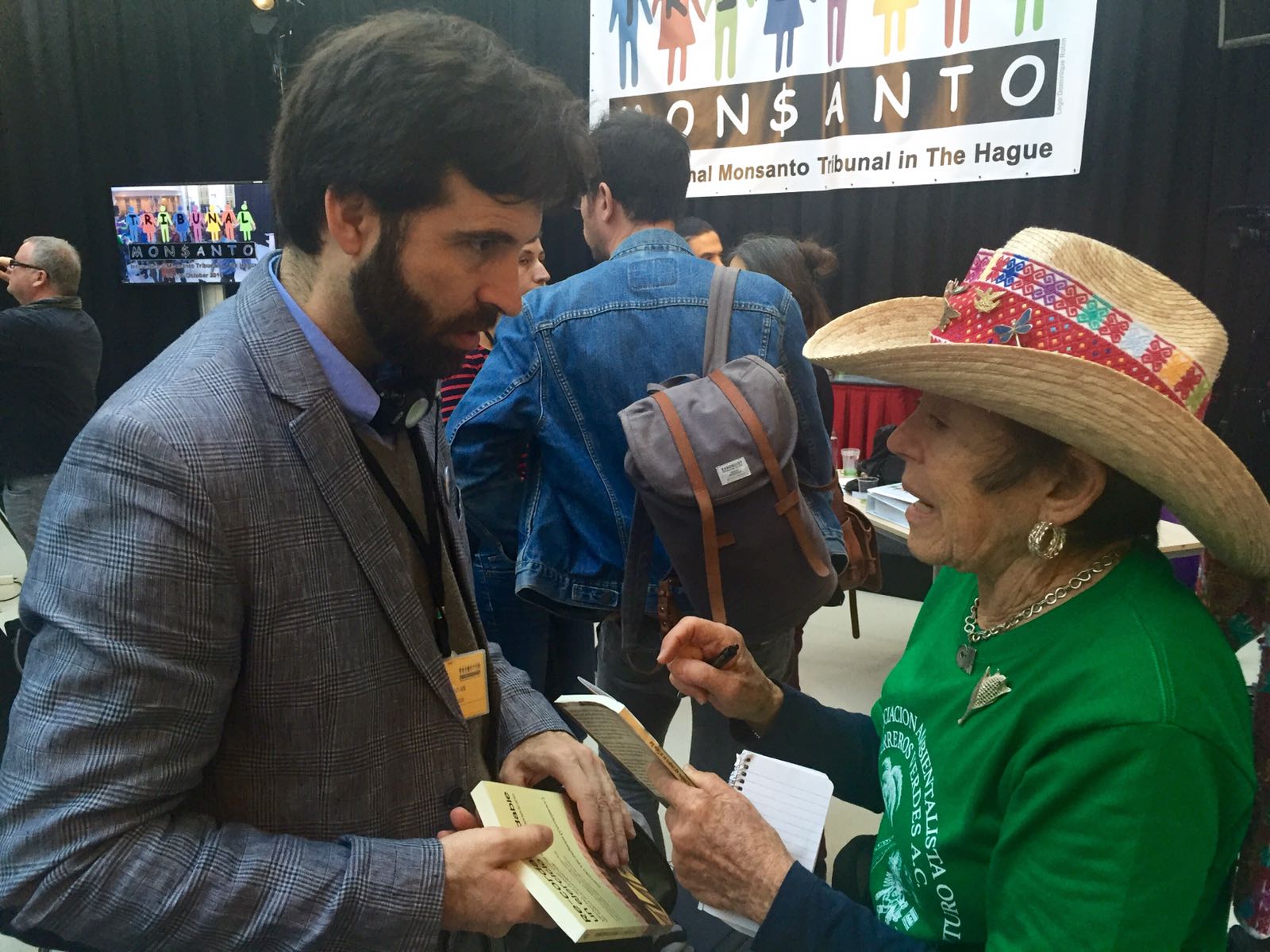
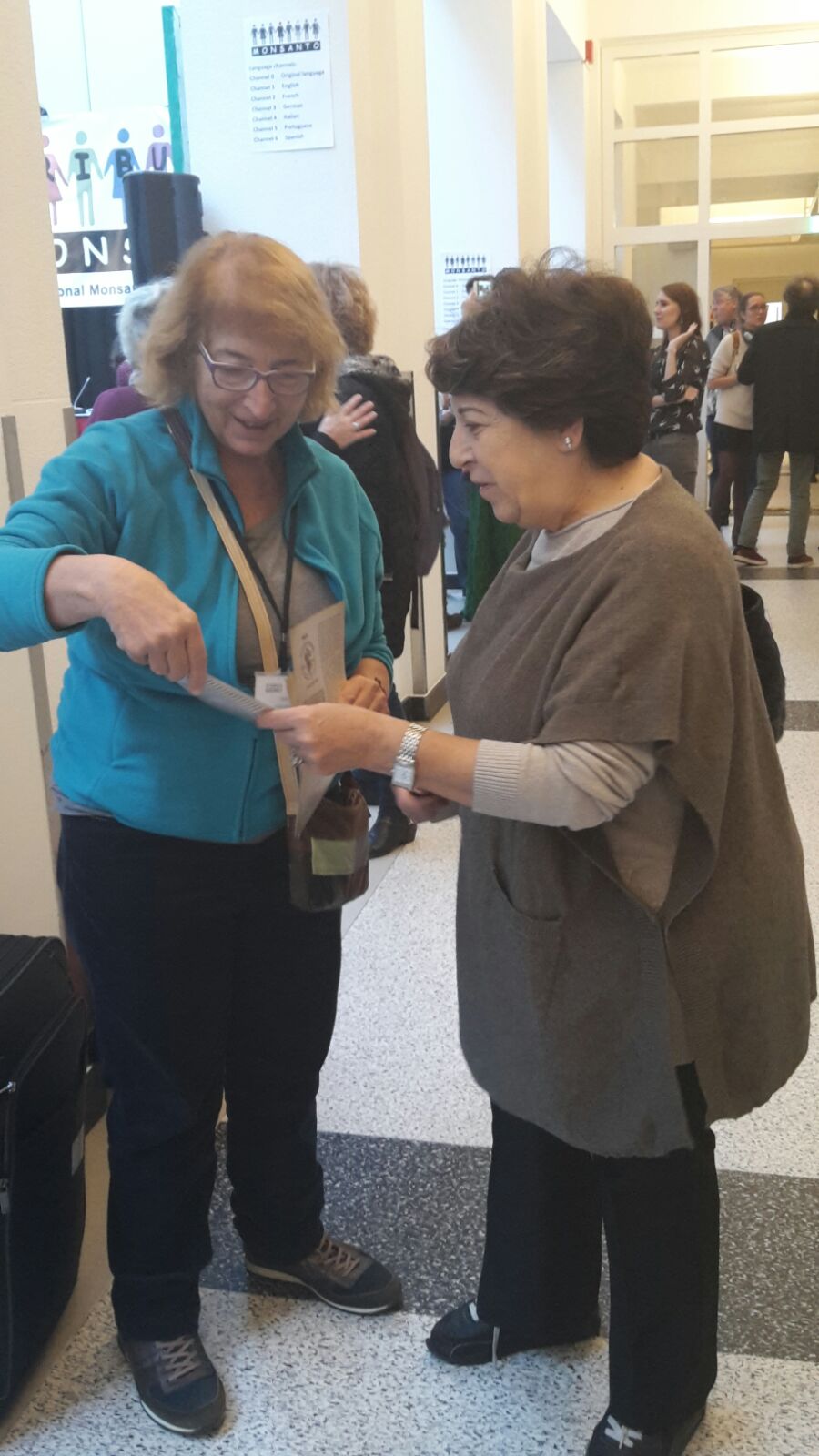
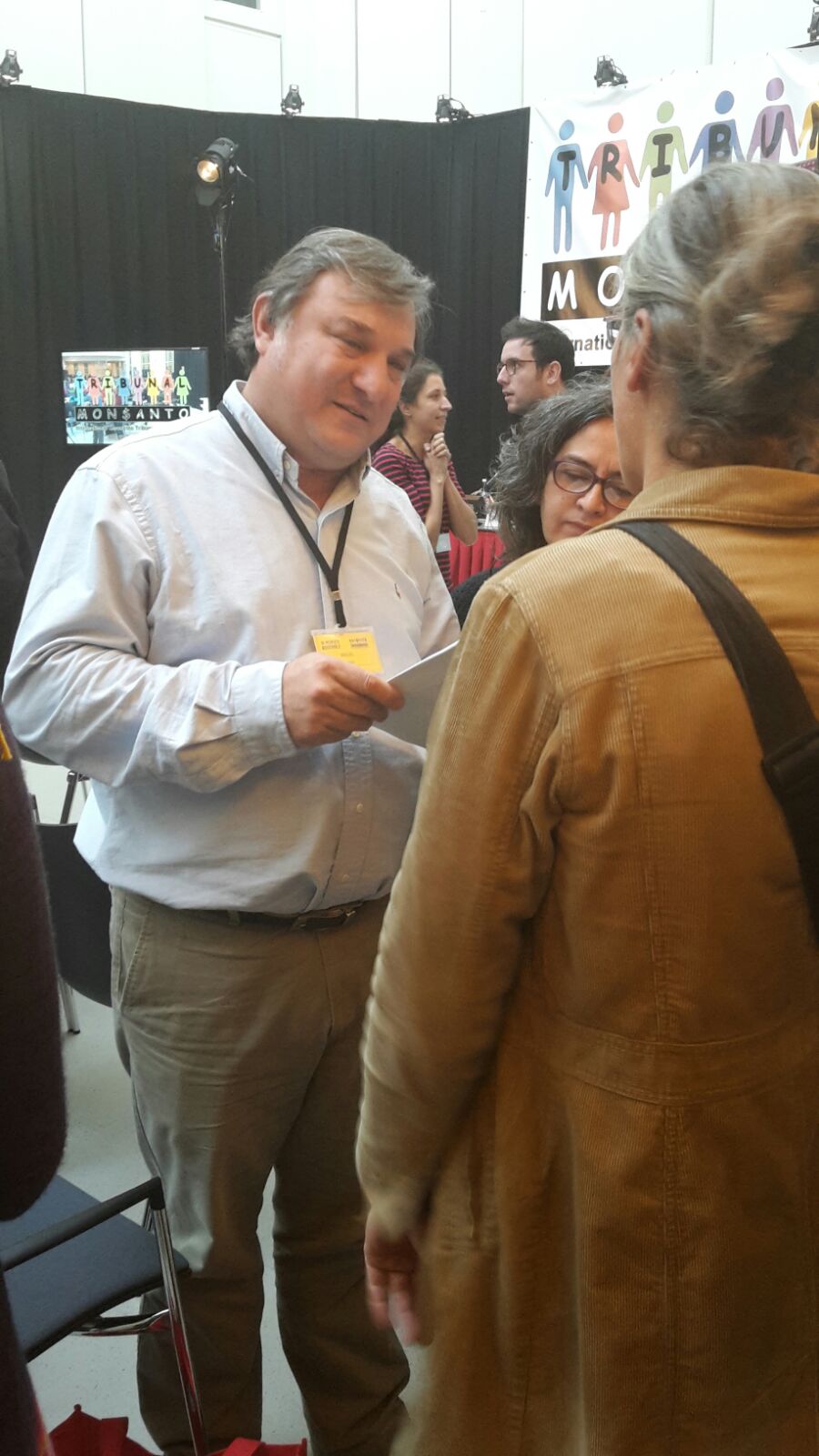
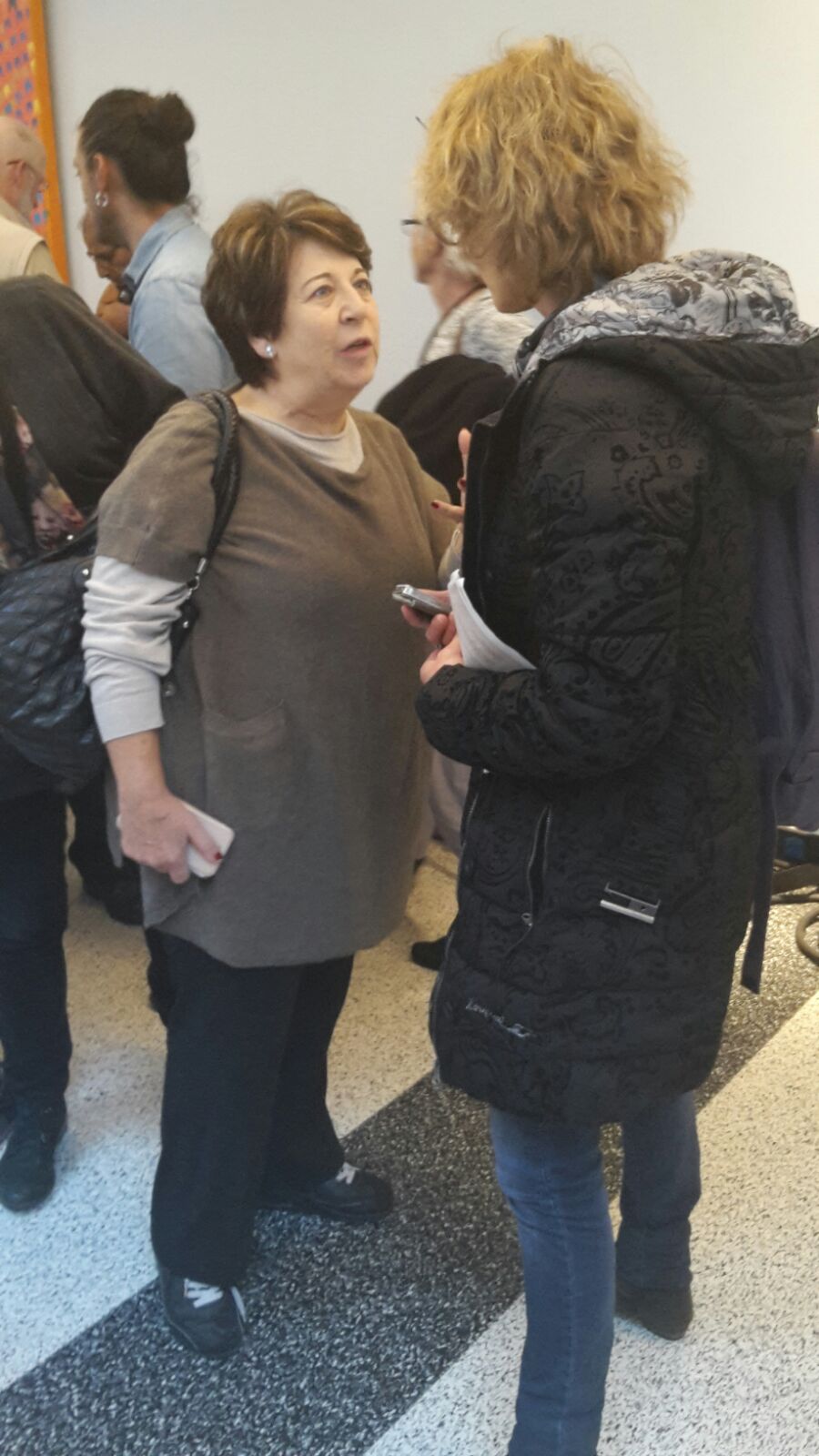
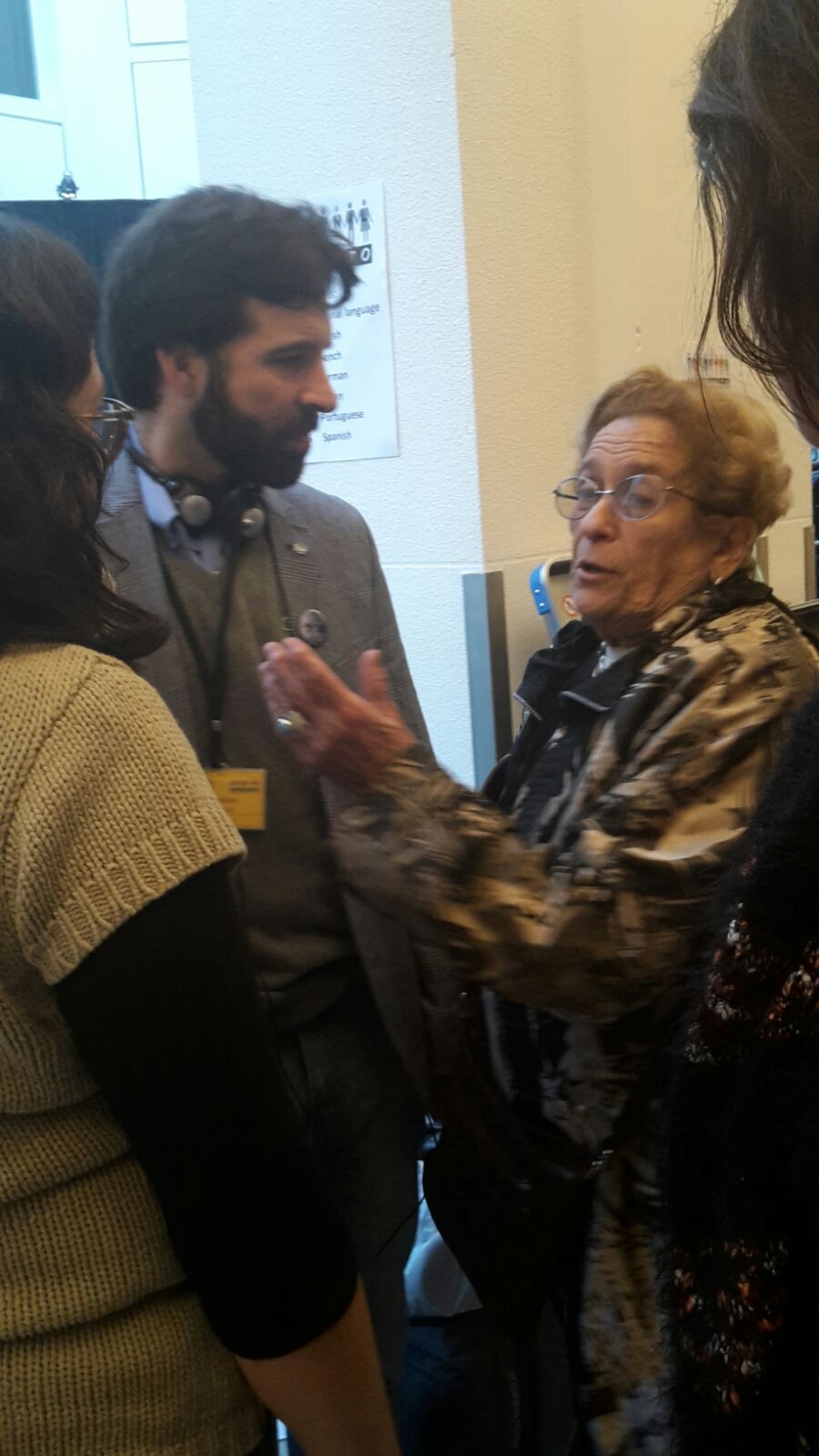
Damian Verzenassi and Myriam Gorban (Argentina)
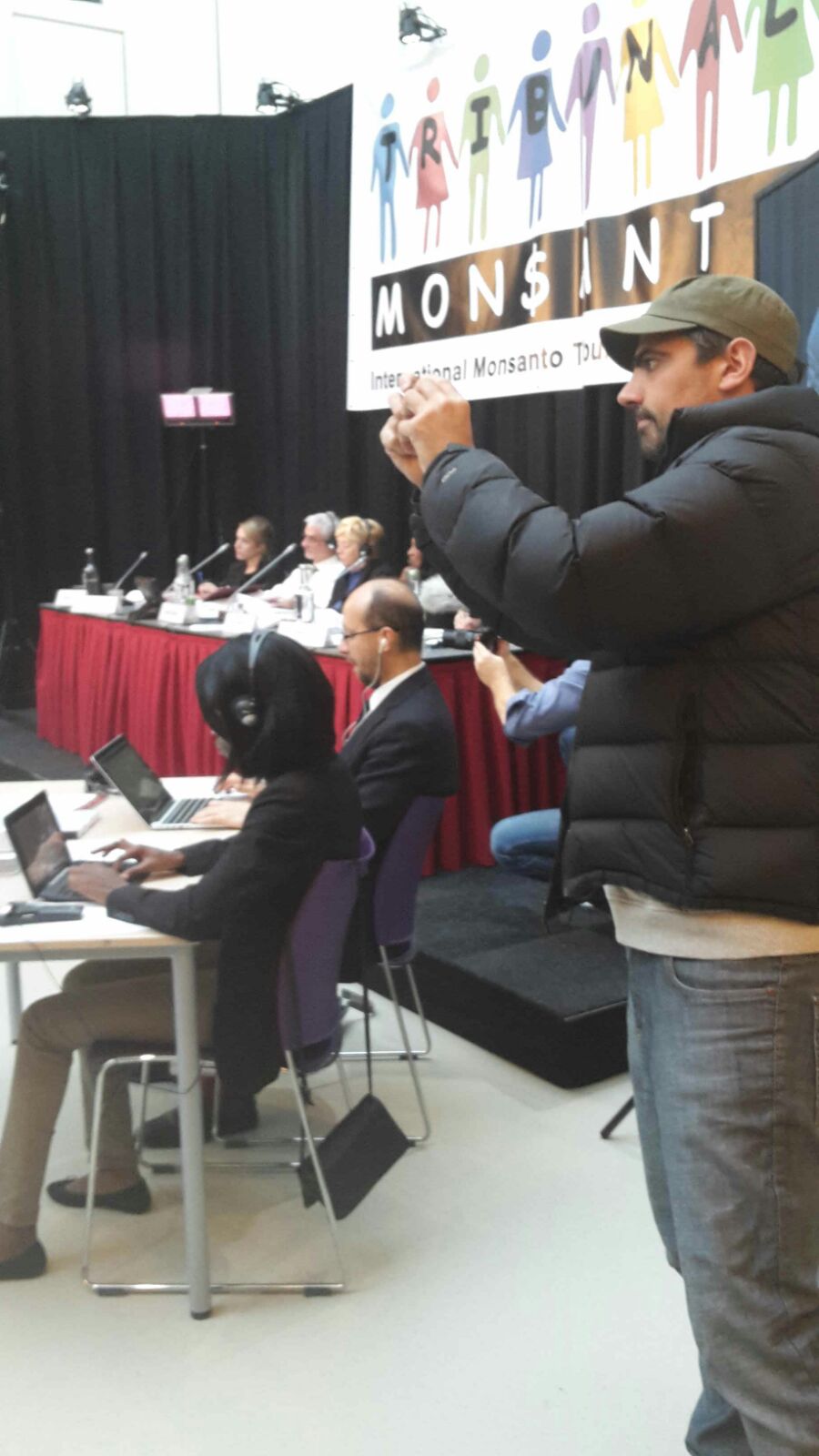
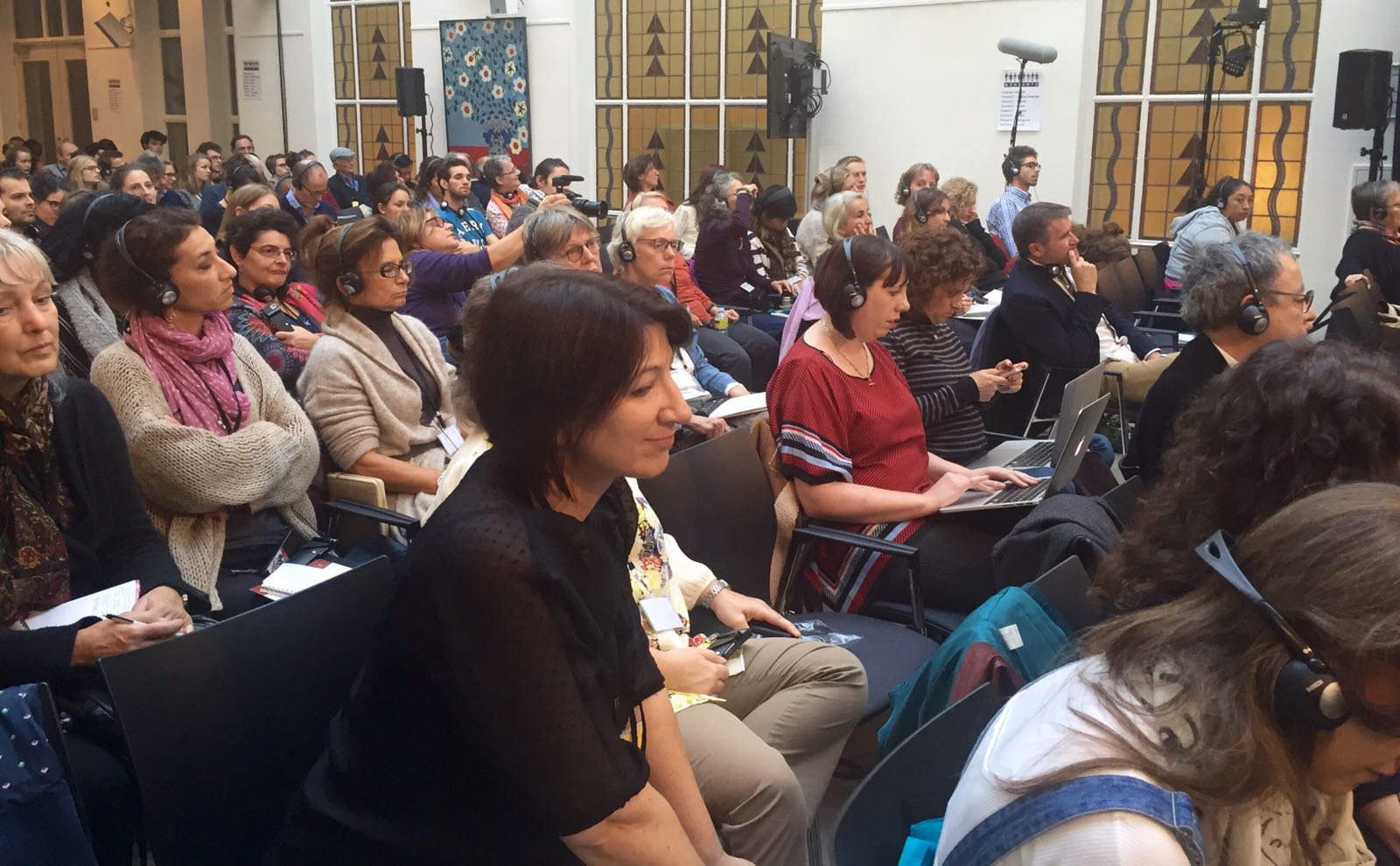
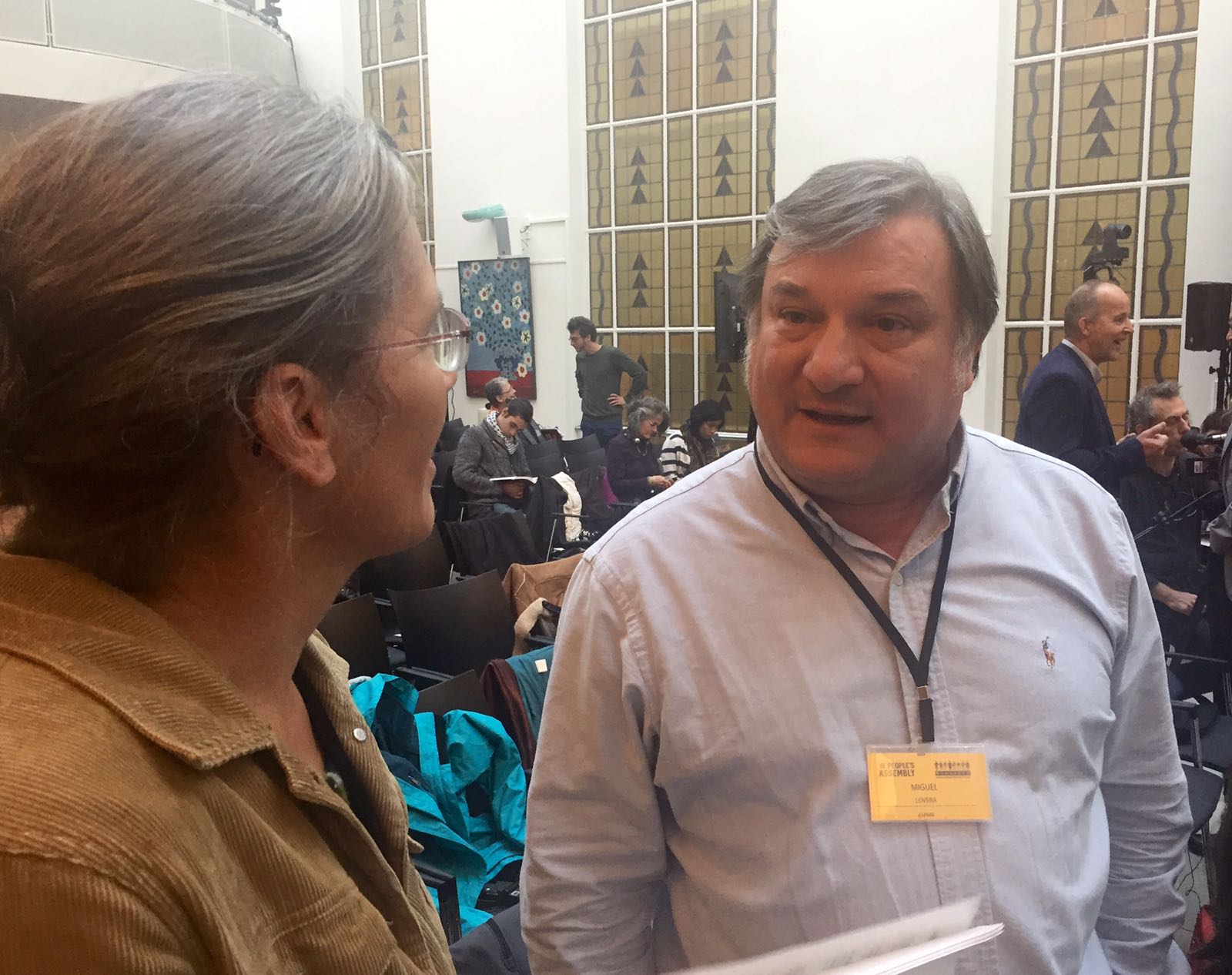
Miguel Lovera, expert on health, Paraguay
“We were lied to about the toxic affects of the toxins.
It is depressing especially after the other reports I hear here. We present these long term effects that damage many future generations, there are lapse of times between applications and the first signs of damage, to report accurately and prove that there is a link. Monsanto obvisouly succeed in persuading our health companies that a chemical product is not harmful and it can be used on a daily basis. Huge mistake for public health. The agro-toxins were to be certified and licensced, and we wanted to show that they are negative, we wanted to assess the environmental damage, but that’s playing with fire.
We have so many traditional varieites of maize, that have been around since pre-colonial times, we do not need GM maize, so we recognize that there is a risk, the moment GM maize is cultivated it could contaminate our own maize varieties and those planted around them. Maize is our number one export variety. Maize is very important for us. Its similar to soy and other crops mentioned here. Soy and maize are cultivated here in Paraguay by large scale businesses, so they cultivate huge fields with little expenses and the small farmers are left to their own devices. 95% of arable land is planted with soy and maize, 5% is left for other uses. We also have beef which is almost all exported, and our countries needs to import food which is so contradictory.”
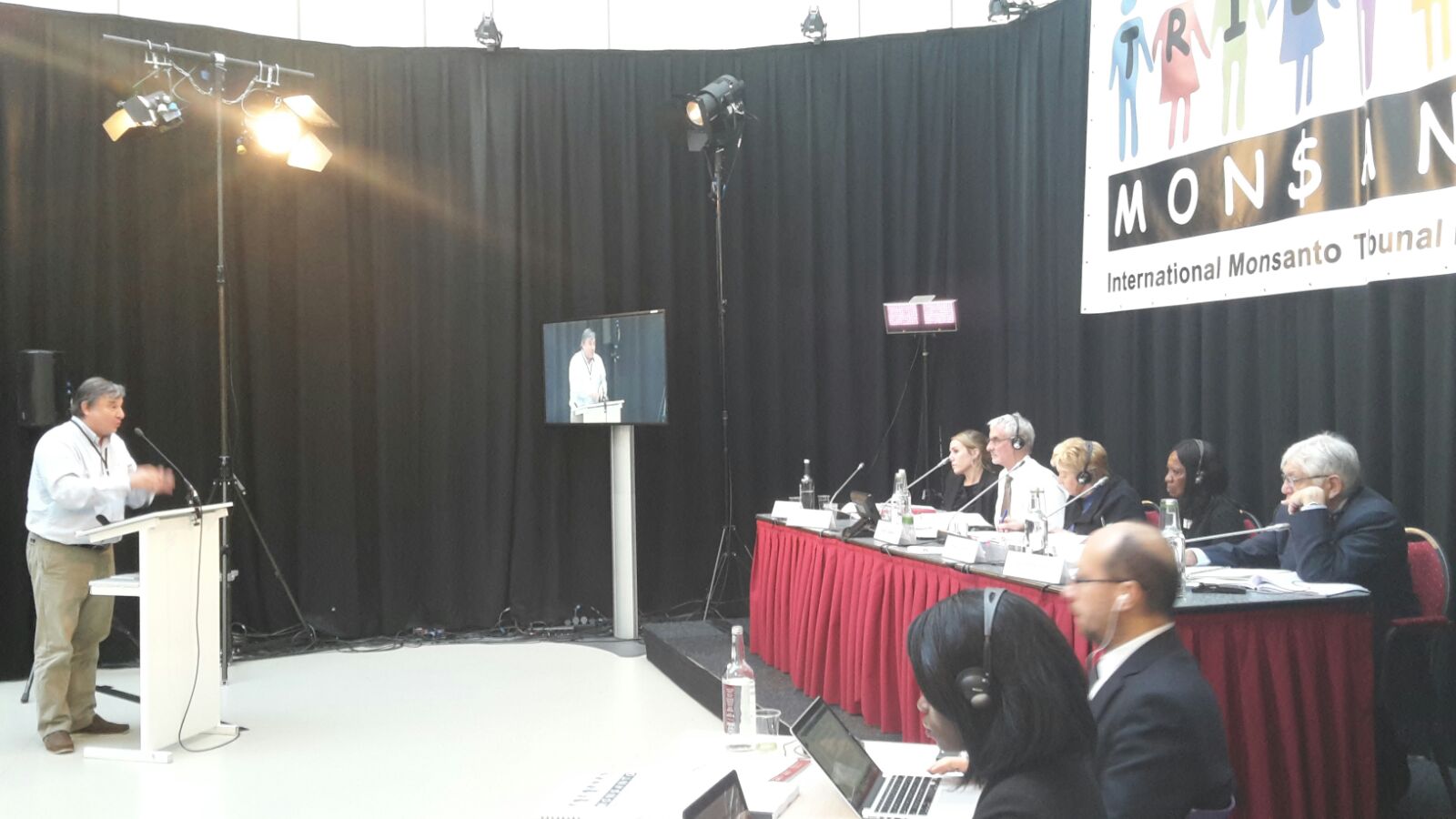
Miguel Lovera, expert on health, Paraguay
“In 2012 I was a member of the government of Paraguay, at the moment I was working at the catholic university as I am an agronomist by profession. Triggered empathy, we are all made to run into a trap those who control big agribusiness are the ones who try to allow us not to speak up, but when we talk about only the technical aspects we lose out on other realities that exist. The reality is complex, Monsanto is not the only player, there are other companies also working with Monsanto, plus powerful governments that in order to win global control they want to control everything. They need the hegemony on a global level. Monsanto has special relations with my country, and control in many levels. We are speaking about a cartel tryig to destroy absolutely everything, including local seed producers, local pesticide producers. It appears that Monsanto tries to destroy everything, there is an oligopoly in Paraguay.”
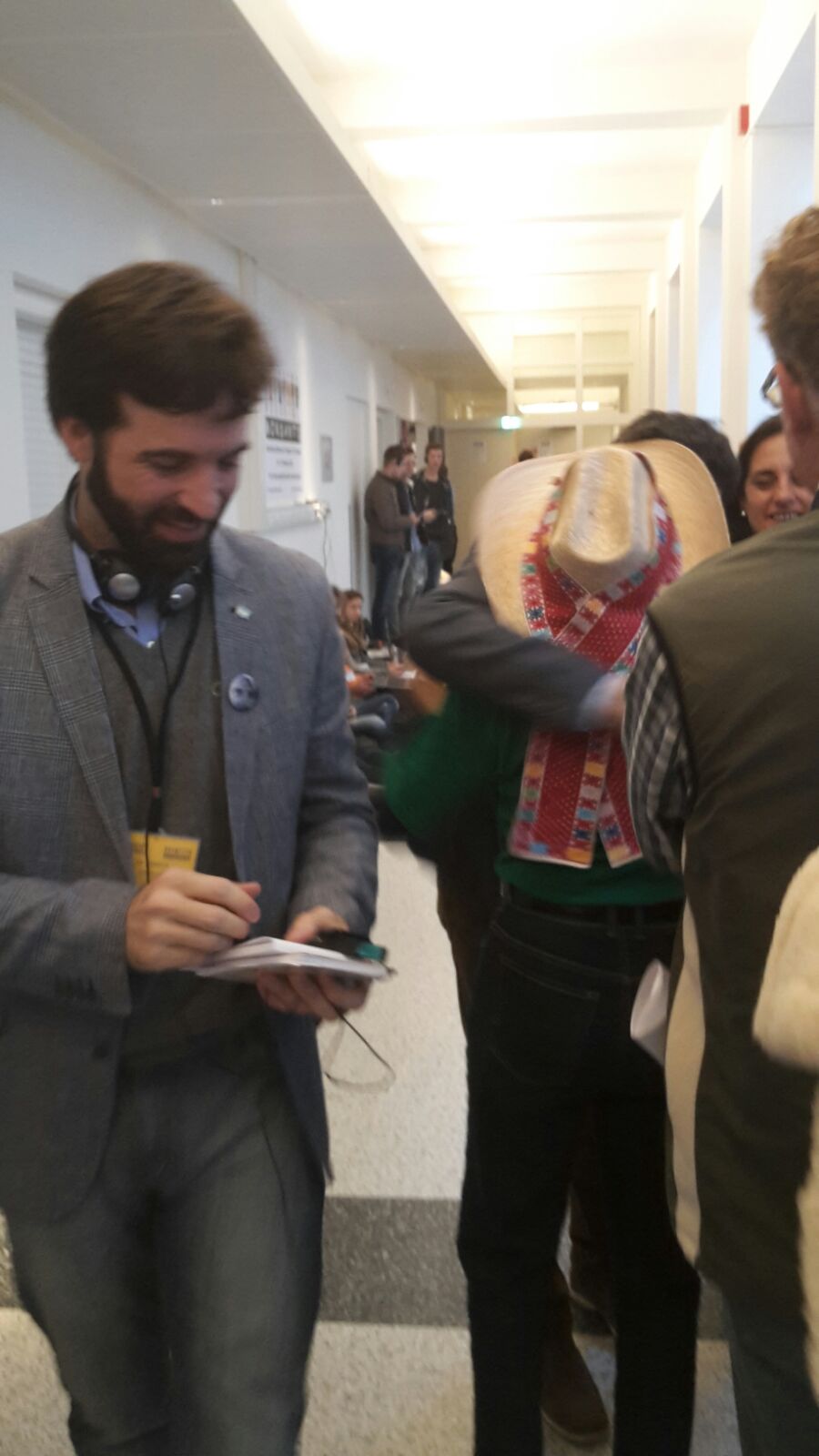
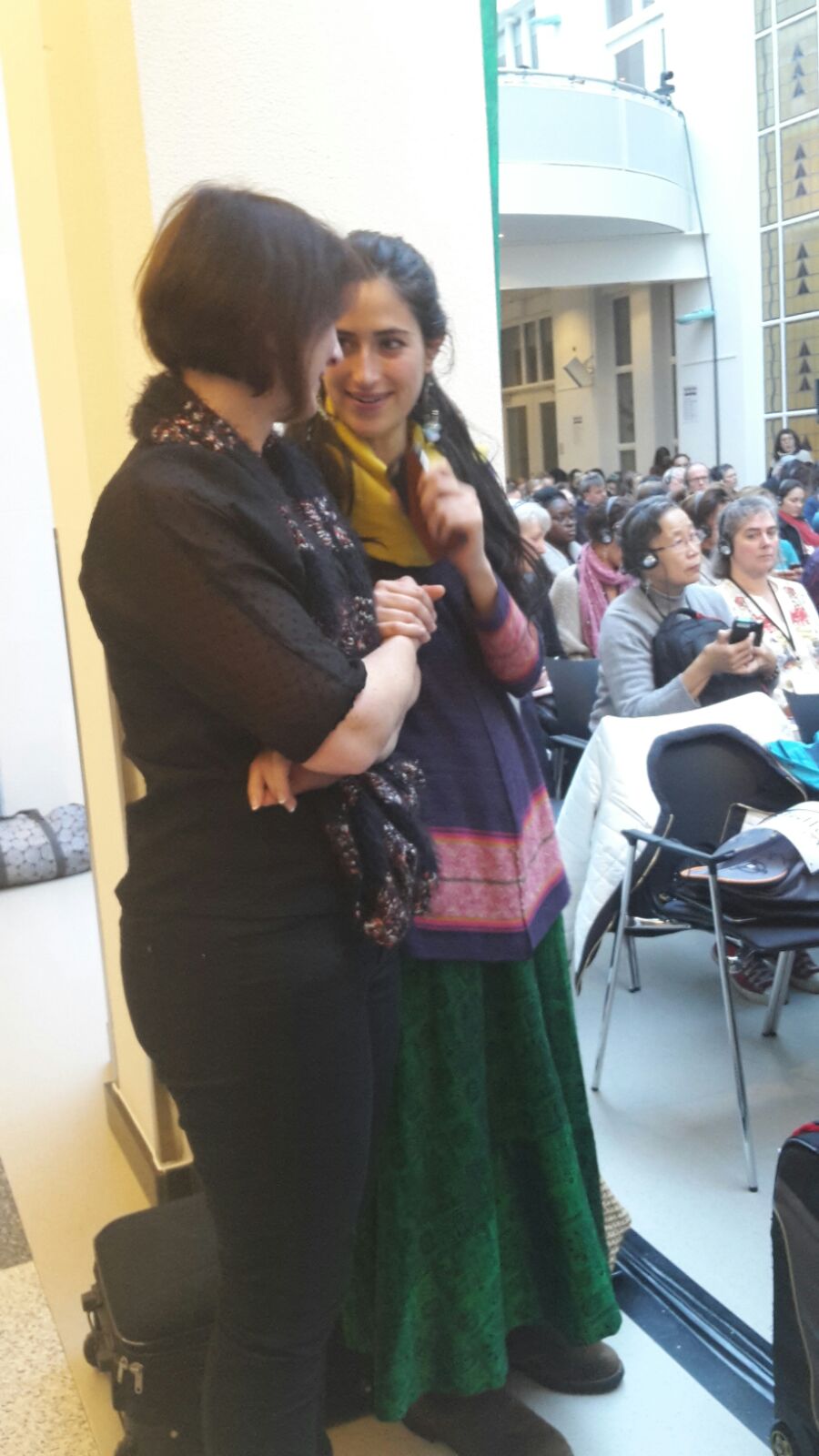
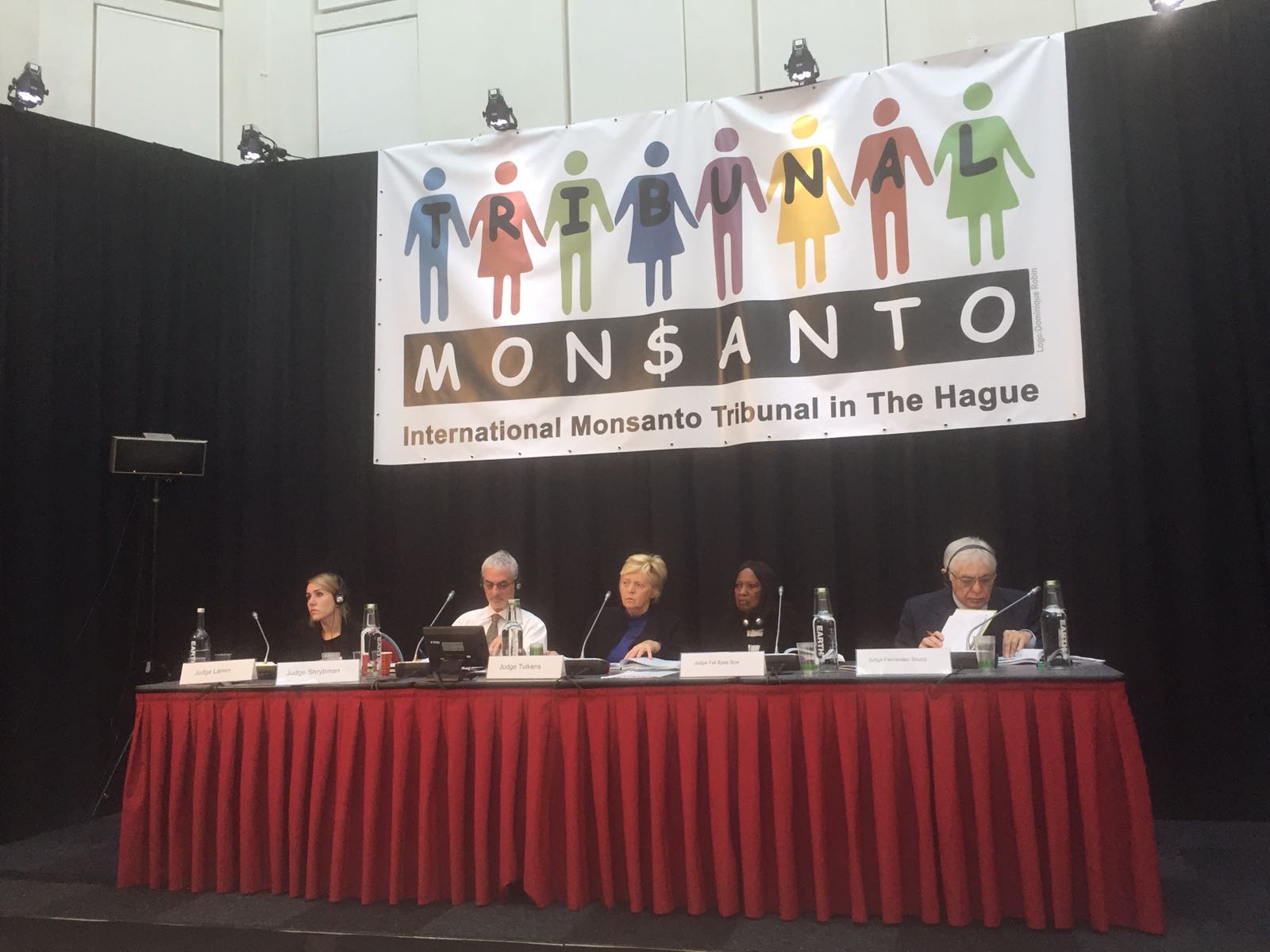
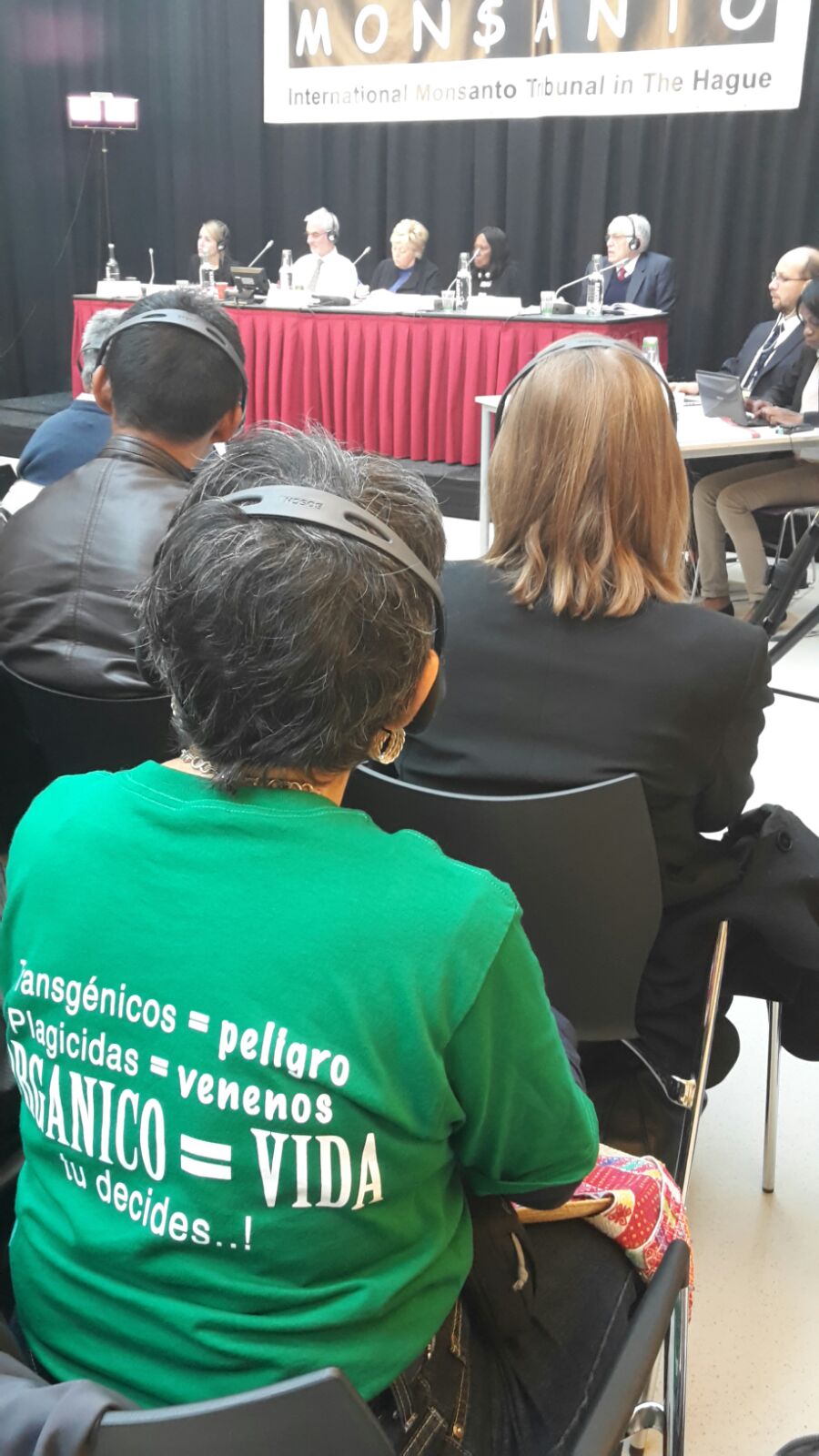
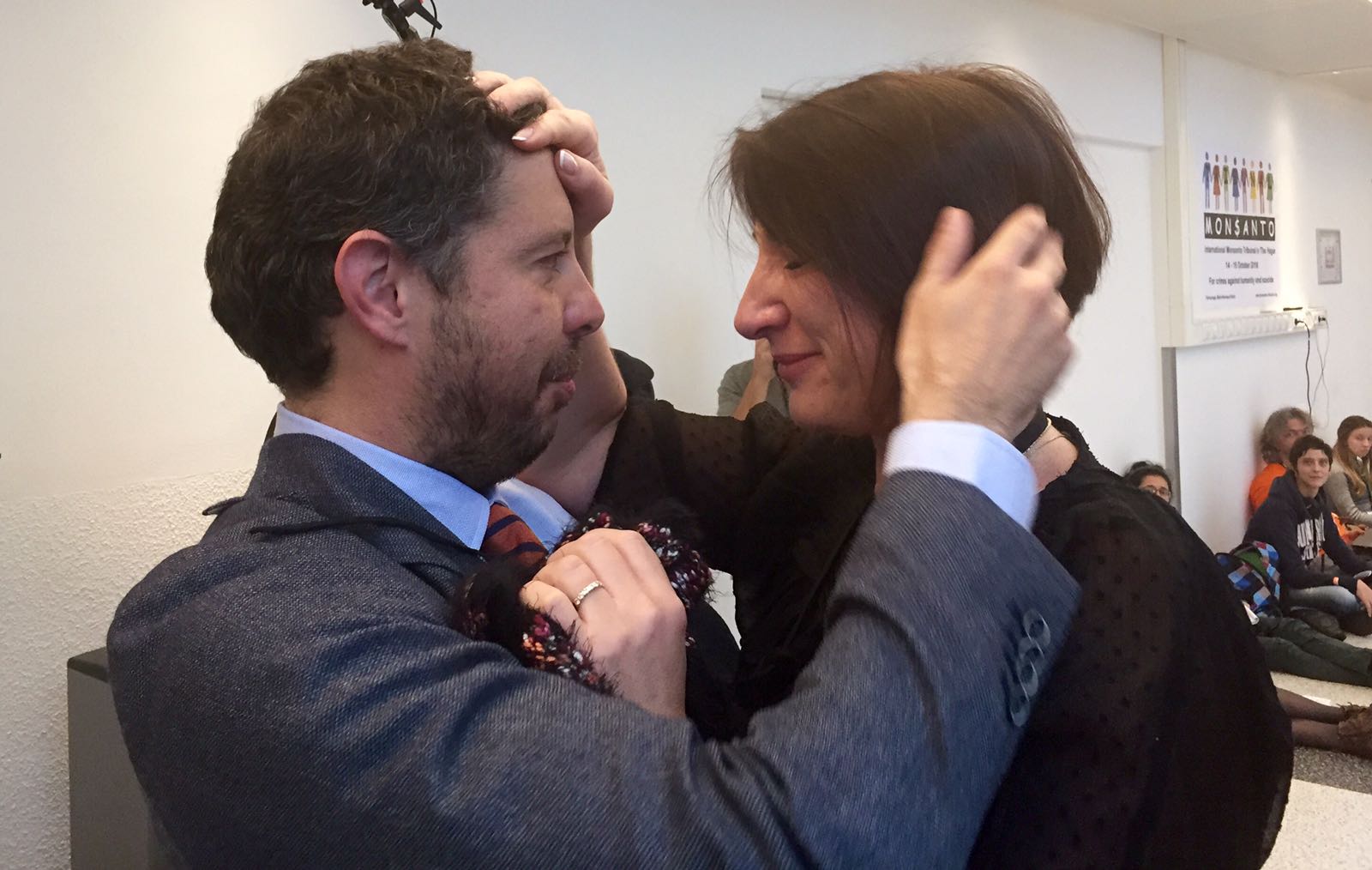
Juan Ignacio Pereyra, lawyer for victims of spray, Sabine Grataloup, victim of RoundUp.
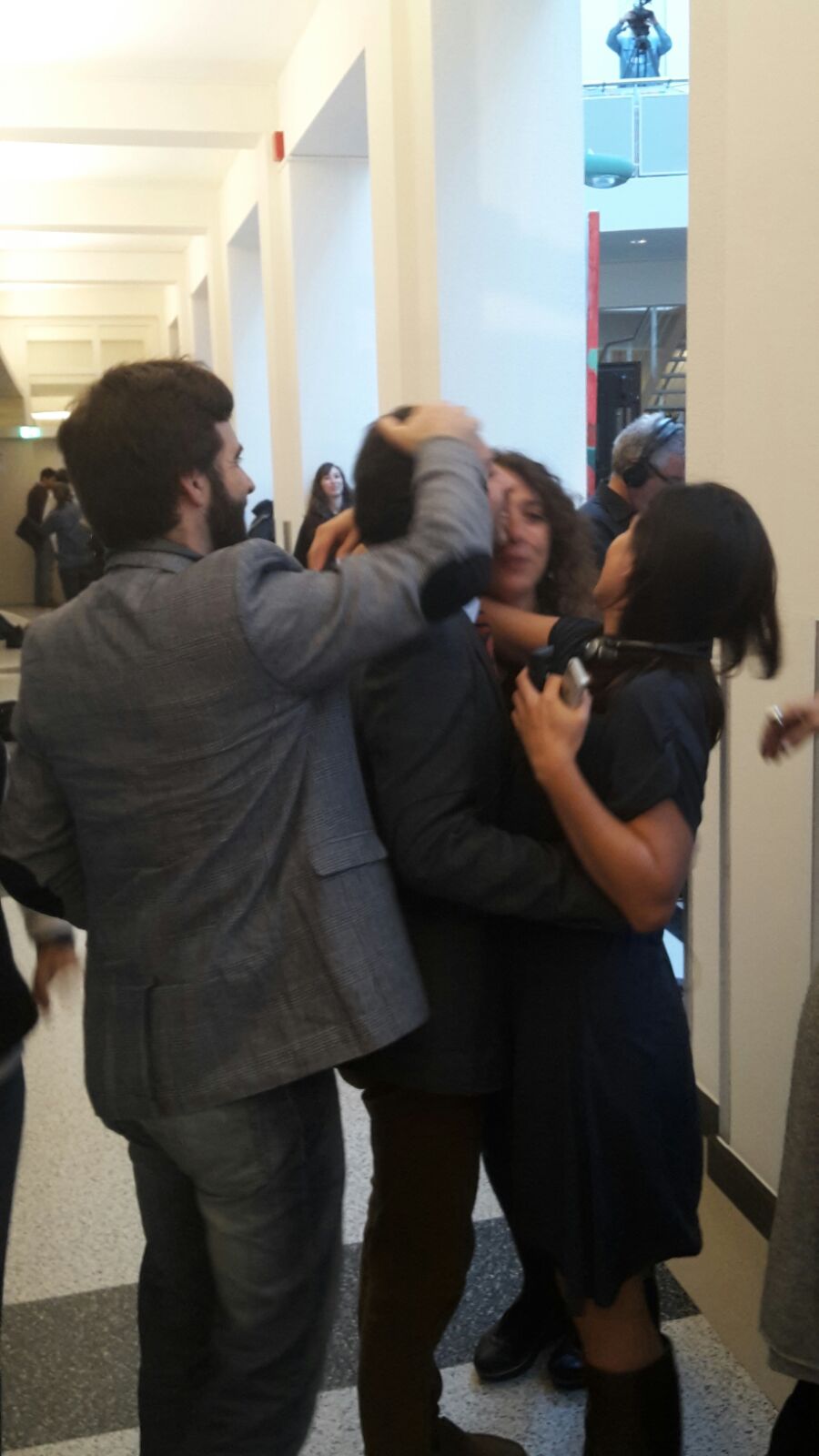
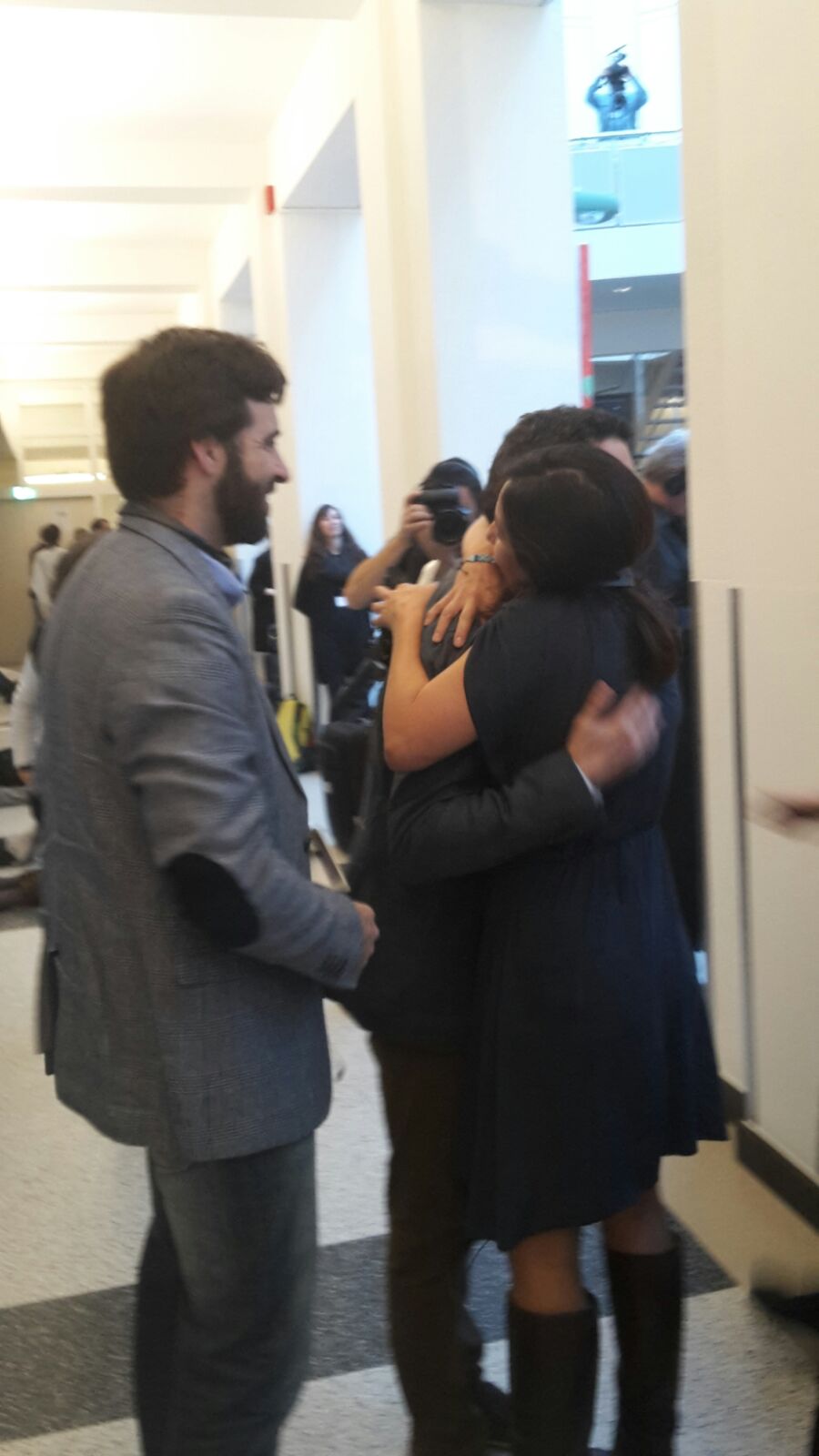
Juan Ignacio Pereyra, his wife and Damian Verzenassi
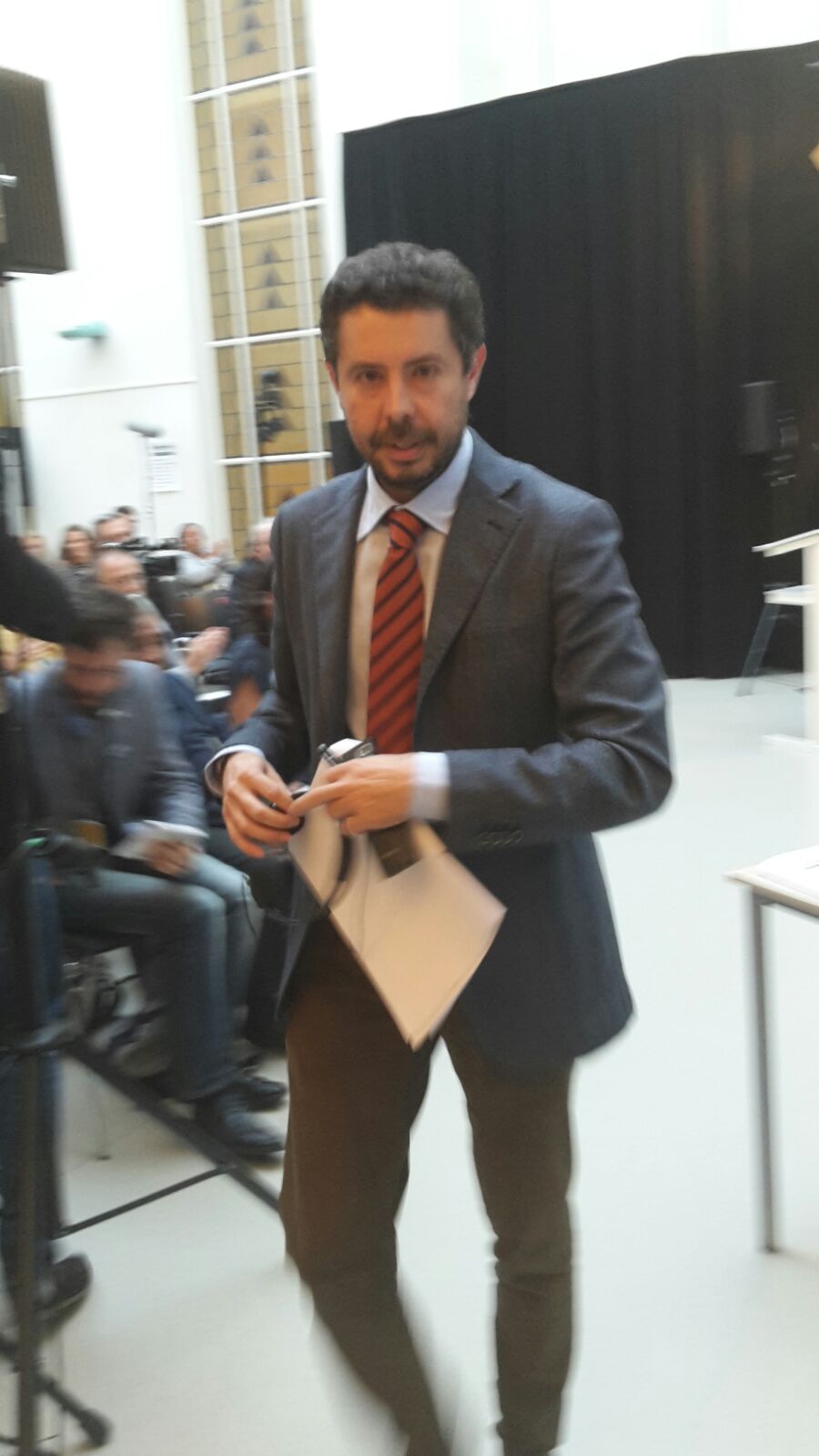
Juan Ignacio Pereyra, Argentinian lawyer
“My role here is to say there is a report that offers evidence. There is a scientific report. It is human rights violation.If the lawyers don’t work together it’s going to be difficult to show whats happened. The technical tools you need to prove the violations, Monsanto has them, but not the victims! We as lawyers have the obligation to continue to research and to try and find evidence. There is damage caused, social damage, environmental damage, cultural damage, this is something that affects several generations. This shows how severe this damage is. Another problem there is a big distance geographically between the victim and the ones perpetrated and the ones committing this damage. Whenever you have chemical products that are affecting your health, sometimes there could be 20 years before you see the results.”
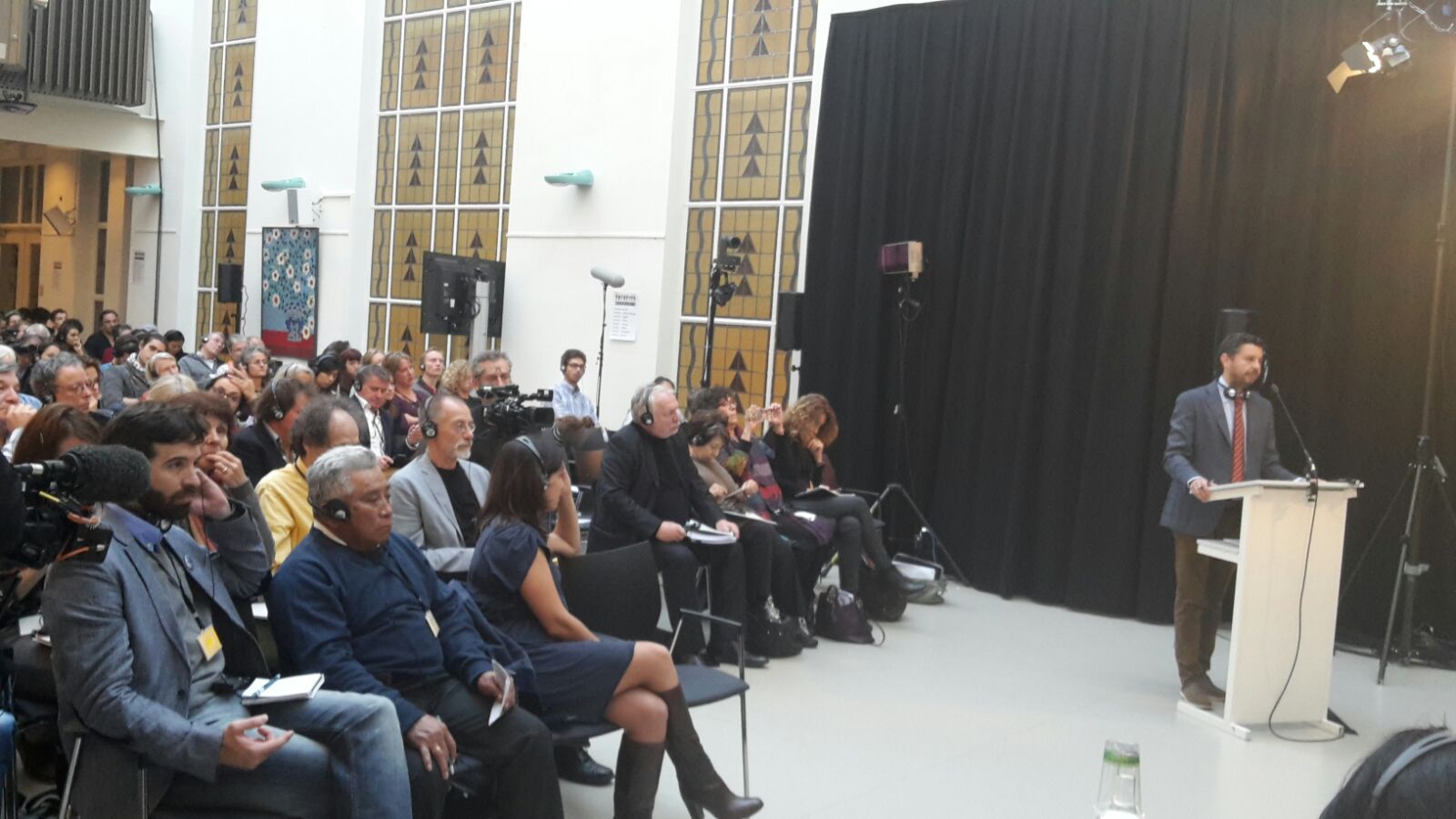
“You always need to know who funded the study. The study doesn’t have the same value if it’s conducted by an individual compared to if it’s conducted by a company.”
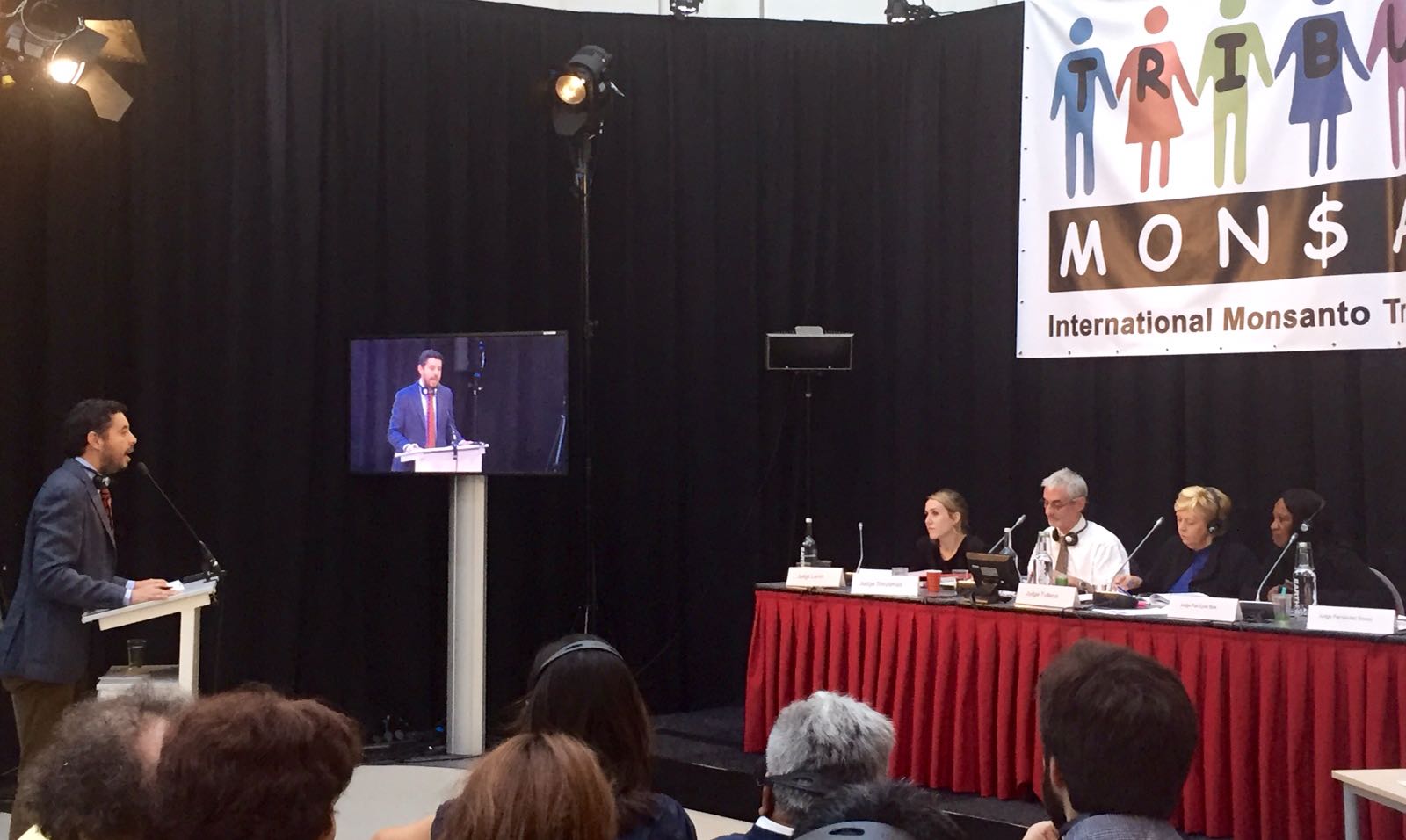
Juan Ignacio Pereyra, Argentinian Lawyer for the victims of spray.
“The entire world has to know what is going on and as soon as the law is violated by major companies, we can say that we are often powerless and that’s why we need the proof for the damage caused. It is difficult to fight as an individual. We are dealing with injustices that we cannot handle alone. I am a member of a network of lawyers and we focus on tackling environmental issues. We represent the population who suffers by the consequences of Glyphosate sprayed.”
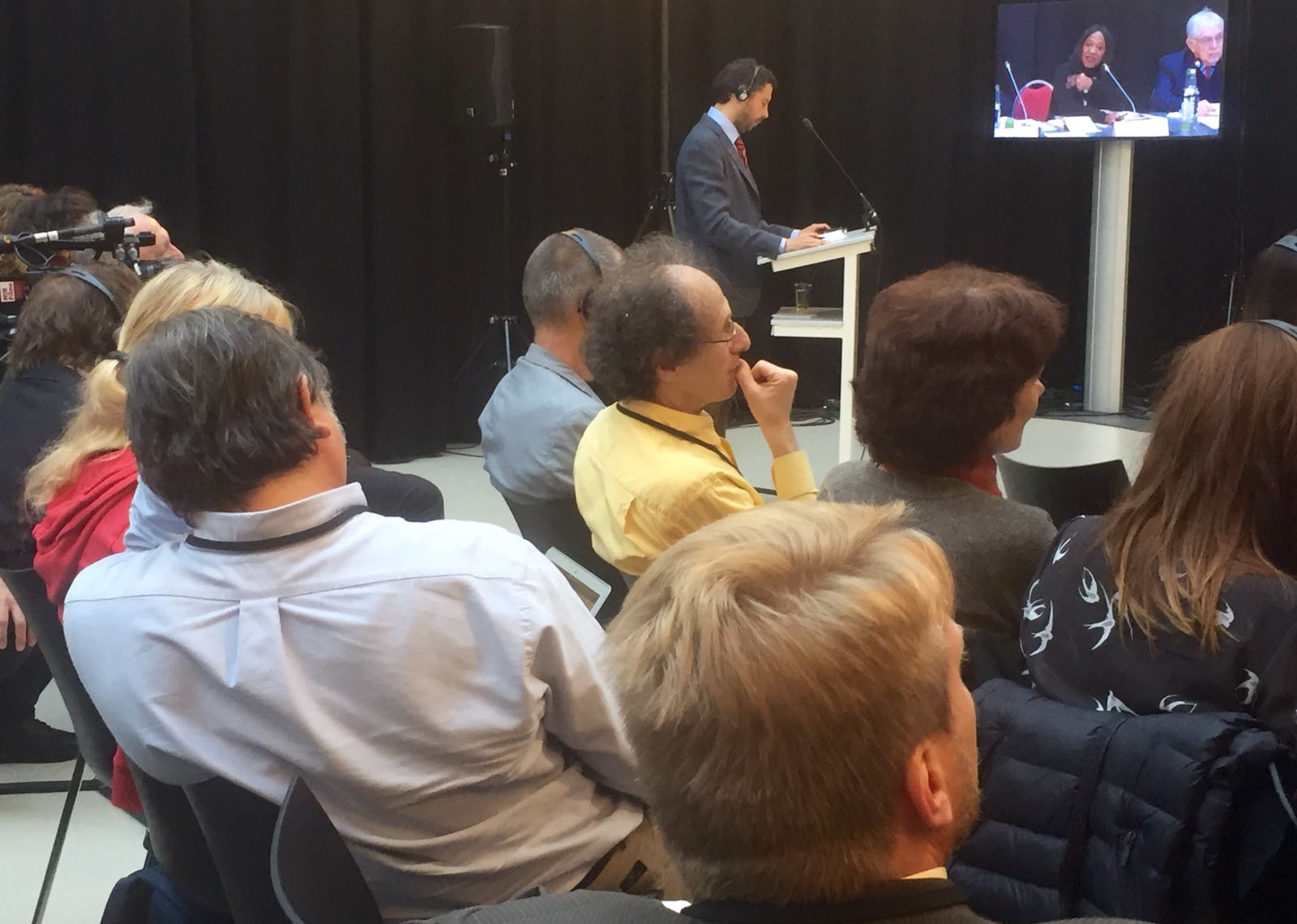
09.50 – 10.15: intervention by Juan Ignacio Pereira, lawyer for victims of spraying from Argentina
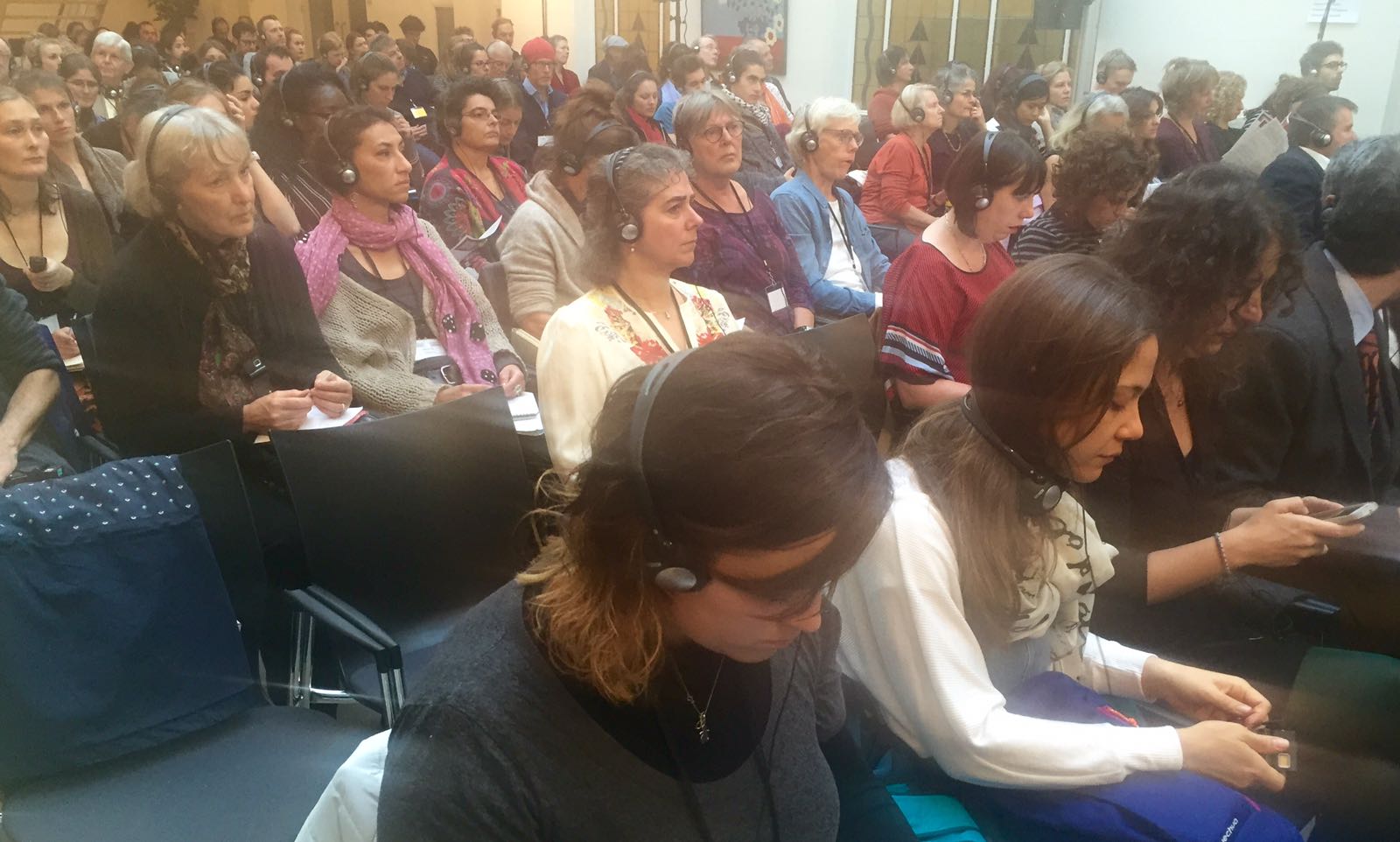
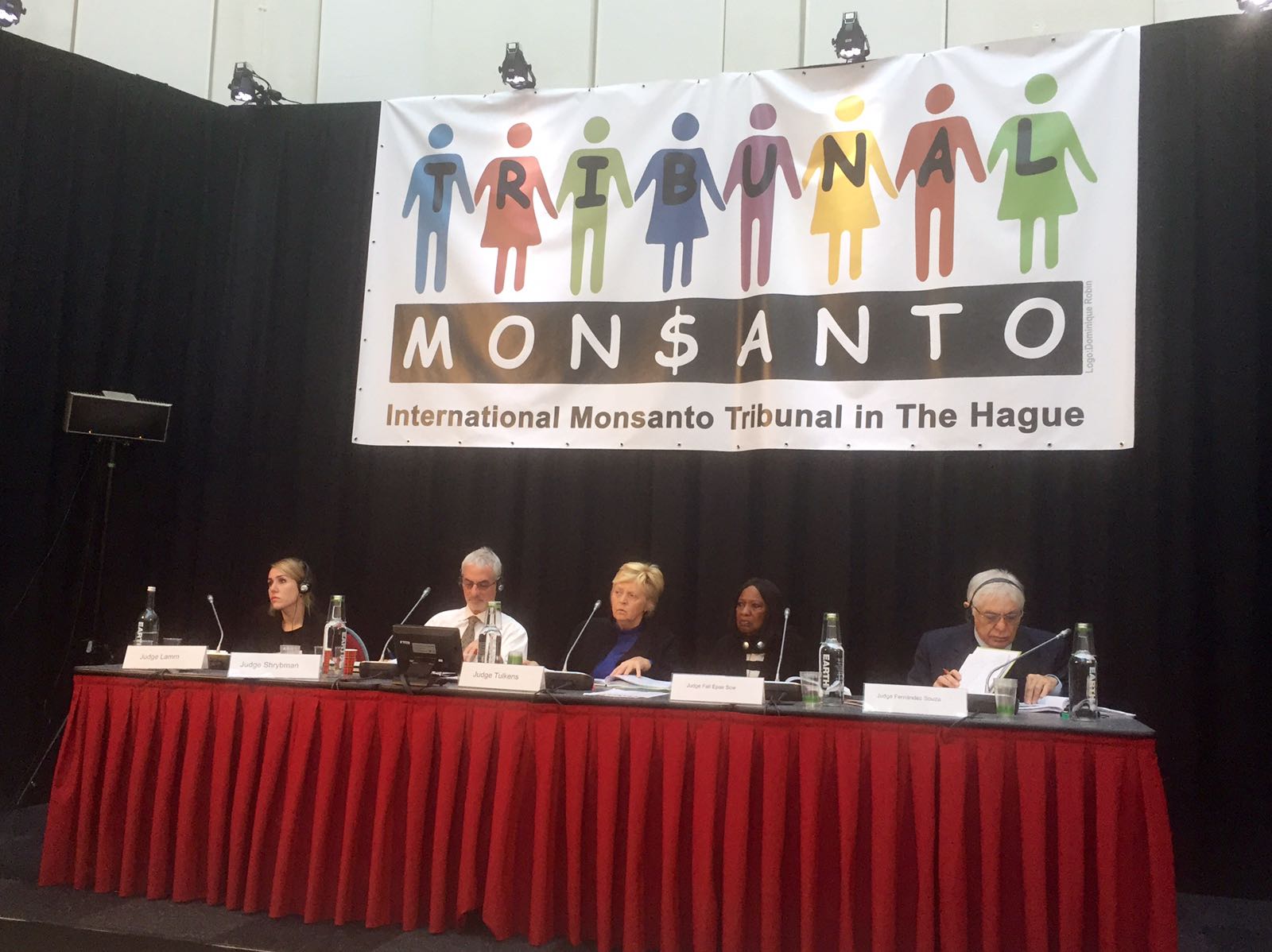
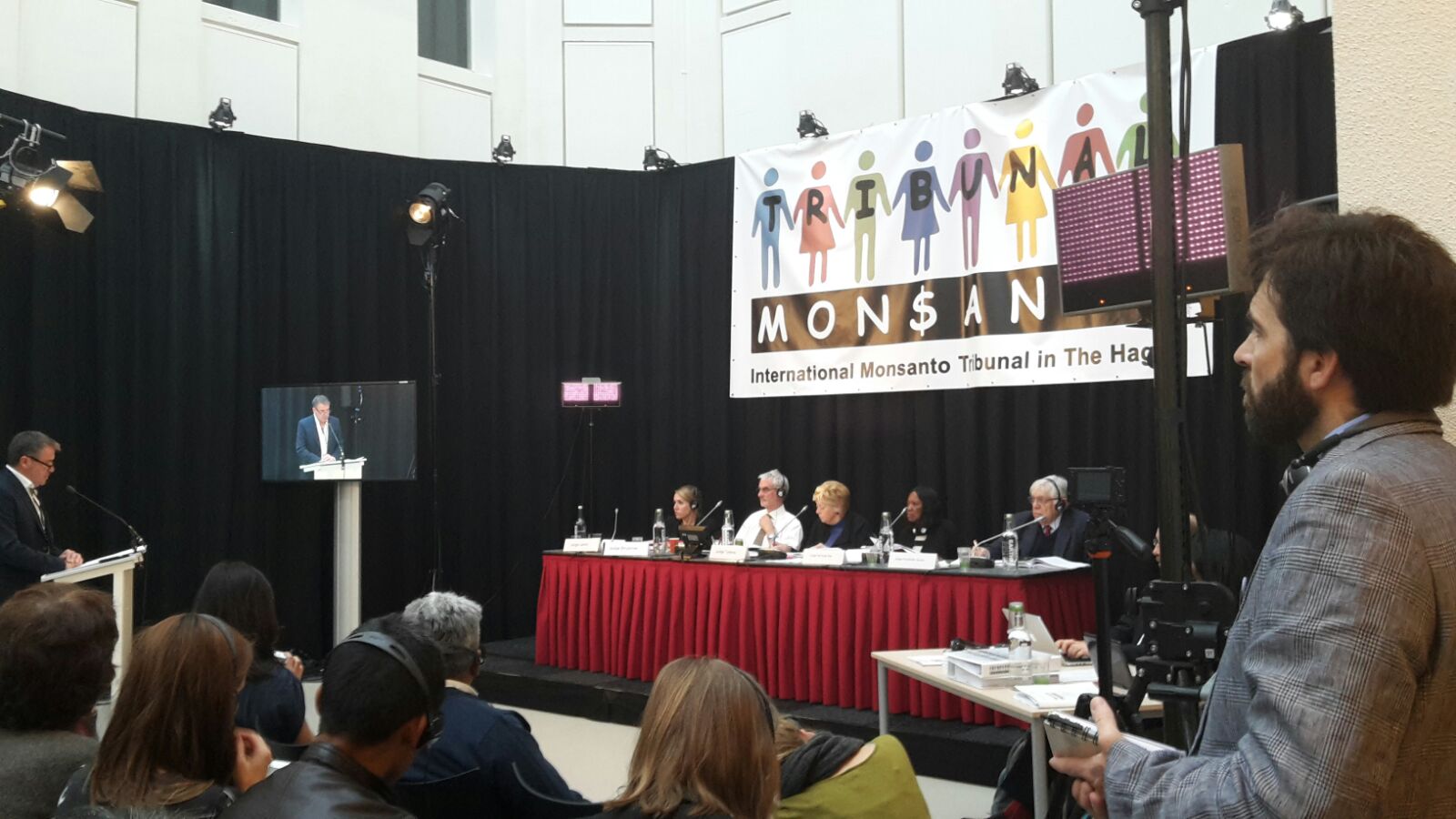
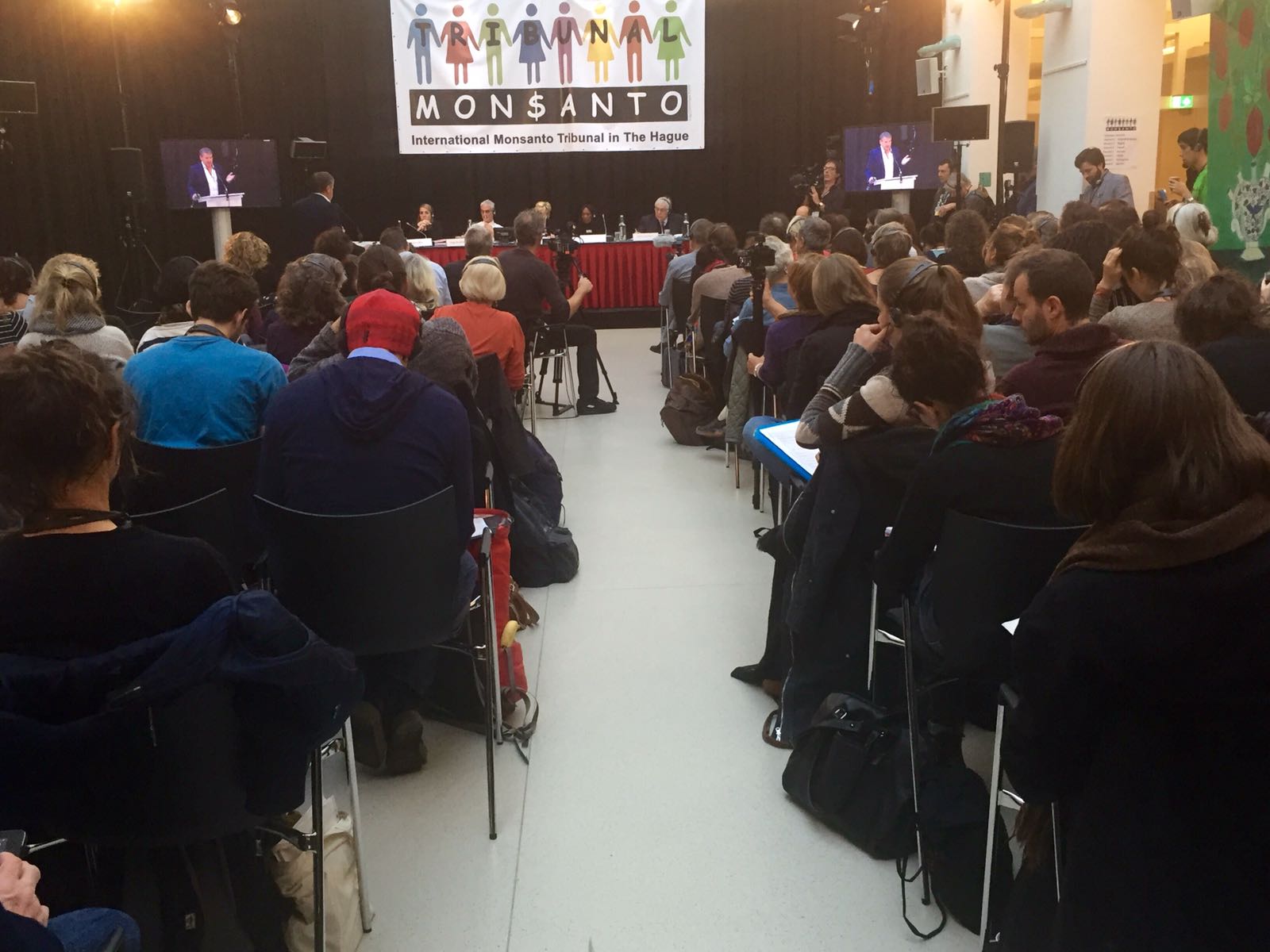
Paul Francois, farmer and Lasso victim
“We used a product that came without any warning. The doctors said if your husband dies we can pay the funeral, My wife says I don’t want you to pay my funeral, I want you to help him!”
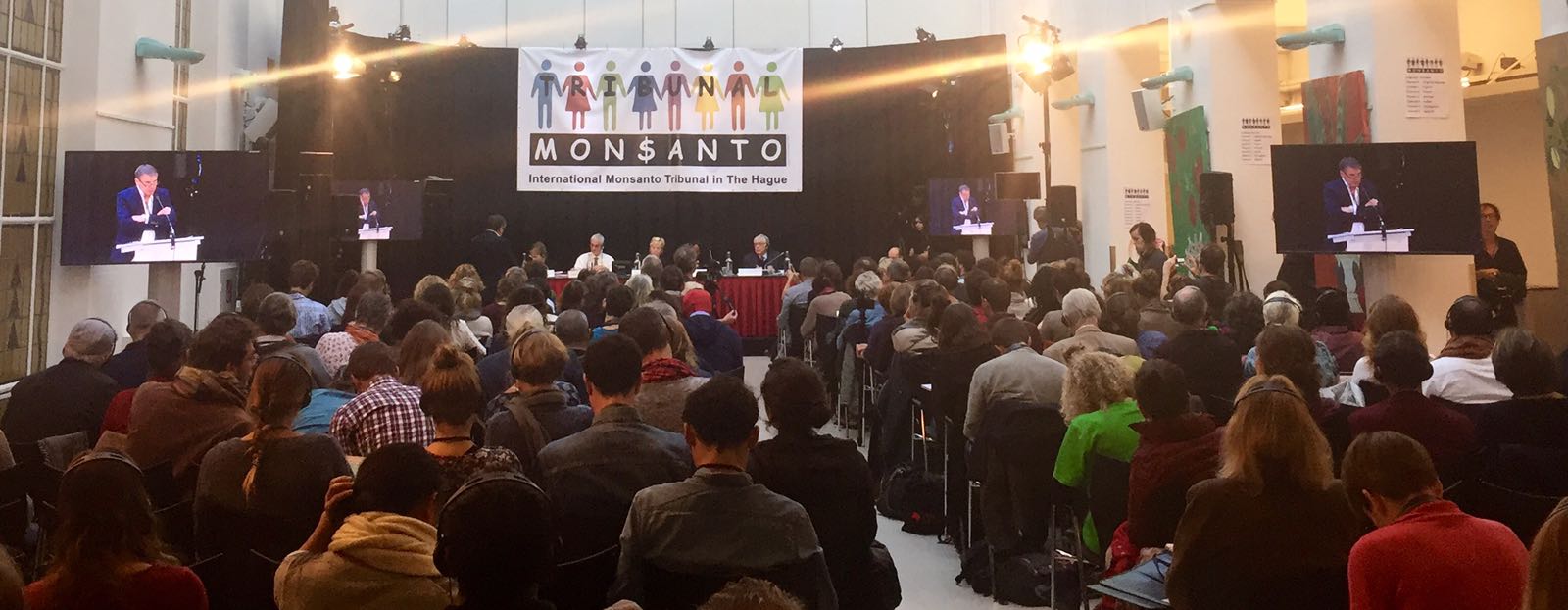
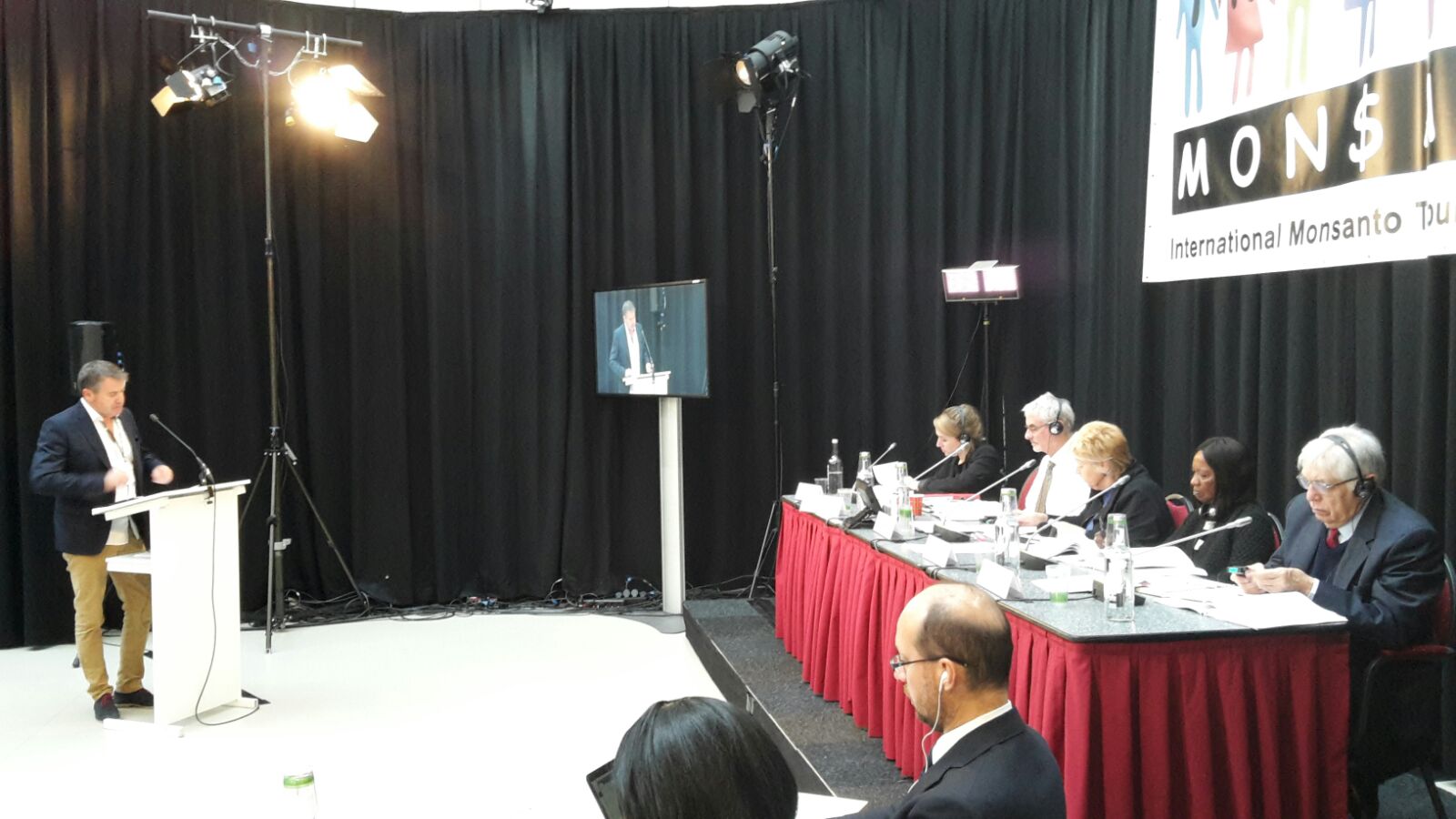
Paul Francois, farmer and Lasso victim, France
“I wasn’t sure whether I should come here at all. Its always difficult to speak out against Monsanto as it can always be used against you in court. Its important to be here in order to testify that Monsanto can be taken to court by an individual. Not just in developing countries, but here too.”
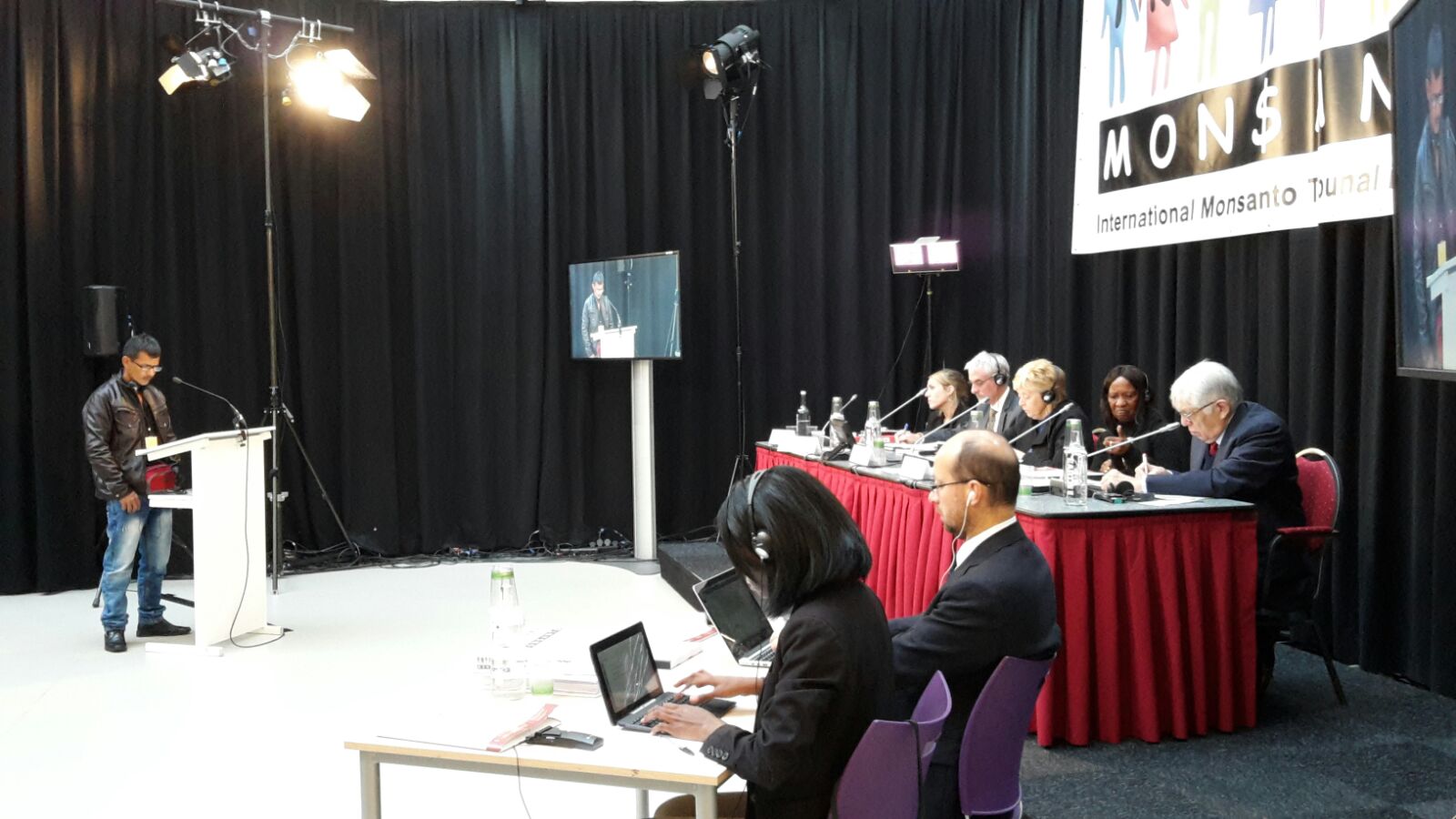
Pedro Pablo Mutumbajoy, farmer, Colombia
“I’ve been a witness of spraying that also affected drinking water, after spraying I saw a calf born with
deformities and no front legs, it something we’ve never seen in our region. The Columbian governement, the US, nor Monsanto are accepting their responsibility for the damage caused.”
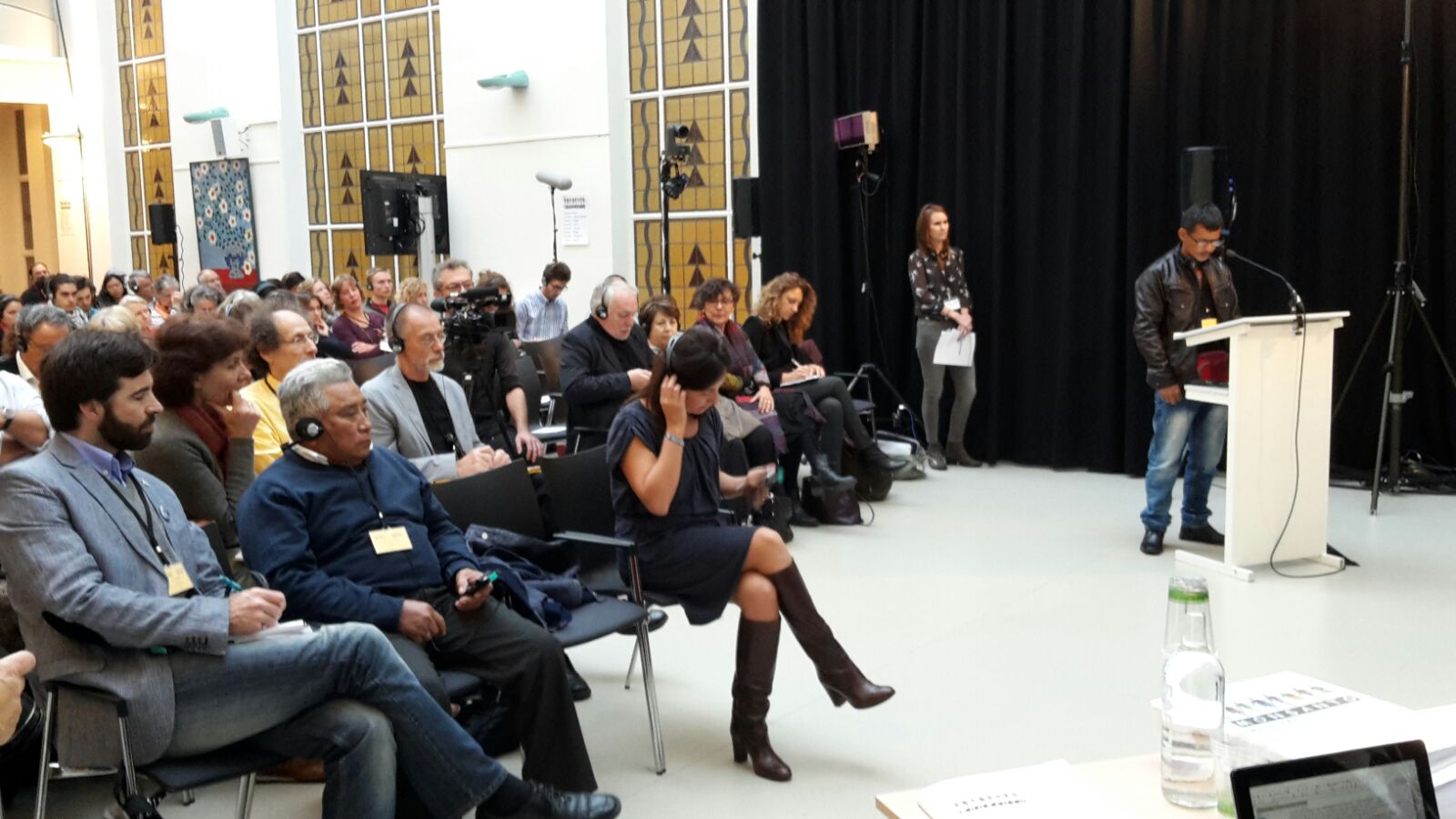
09.00-09.25: Pedro Pablo Mutumbajoy, a farmer from Colombia, delivering his testimony as witness
“We call on Monsanto and government to take accountability,
Justice needs to be done!”
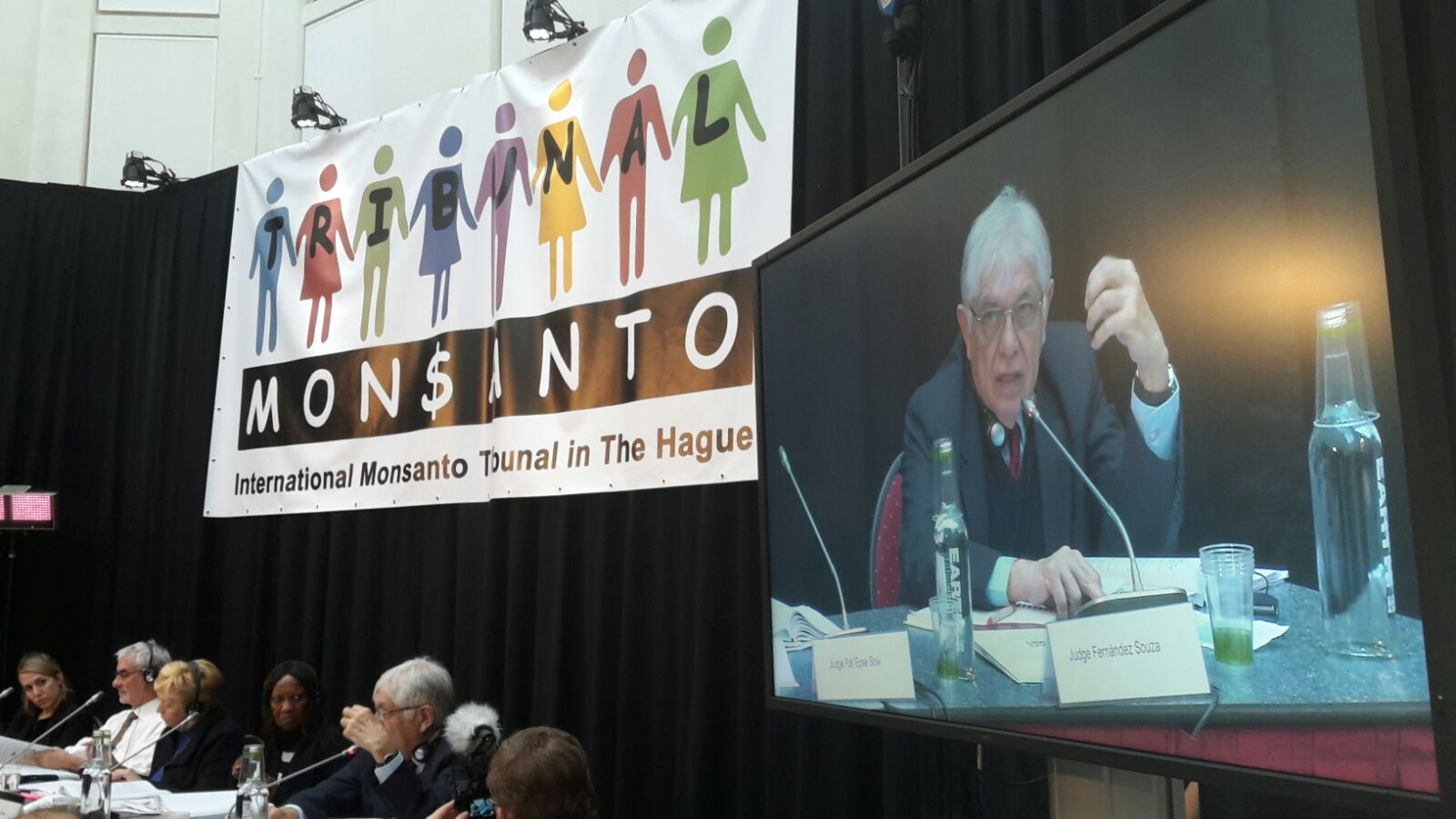
Jorge Abraham Fernàndez Souza is currently Judge at the Court of Administrative Litigation of Mexico City.
He has been: Governmental Delegate of the Federal District within the Miguel Hidalgo Delegation; member of the Council of the Federal District judiciary; Director of the Social Sciences and Humanities division and Chief of the Law department at the Autonomous Metropolitan University Unidad Atzcapotzalco; Guarantor at the Permanent Peoples’ Tribunal, Capítulo México; Adviser of National Arbitrage Commission (CONAI) between the Zapatista Army of National Liberation and the Mexican government; Reporting judge in the Russell Tribunal on repression in Latin America.
Jorge Fernández Souza is also the author of various publications on legal and social themes
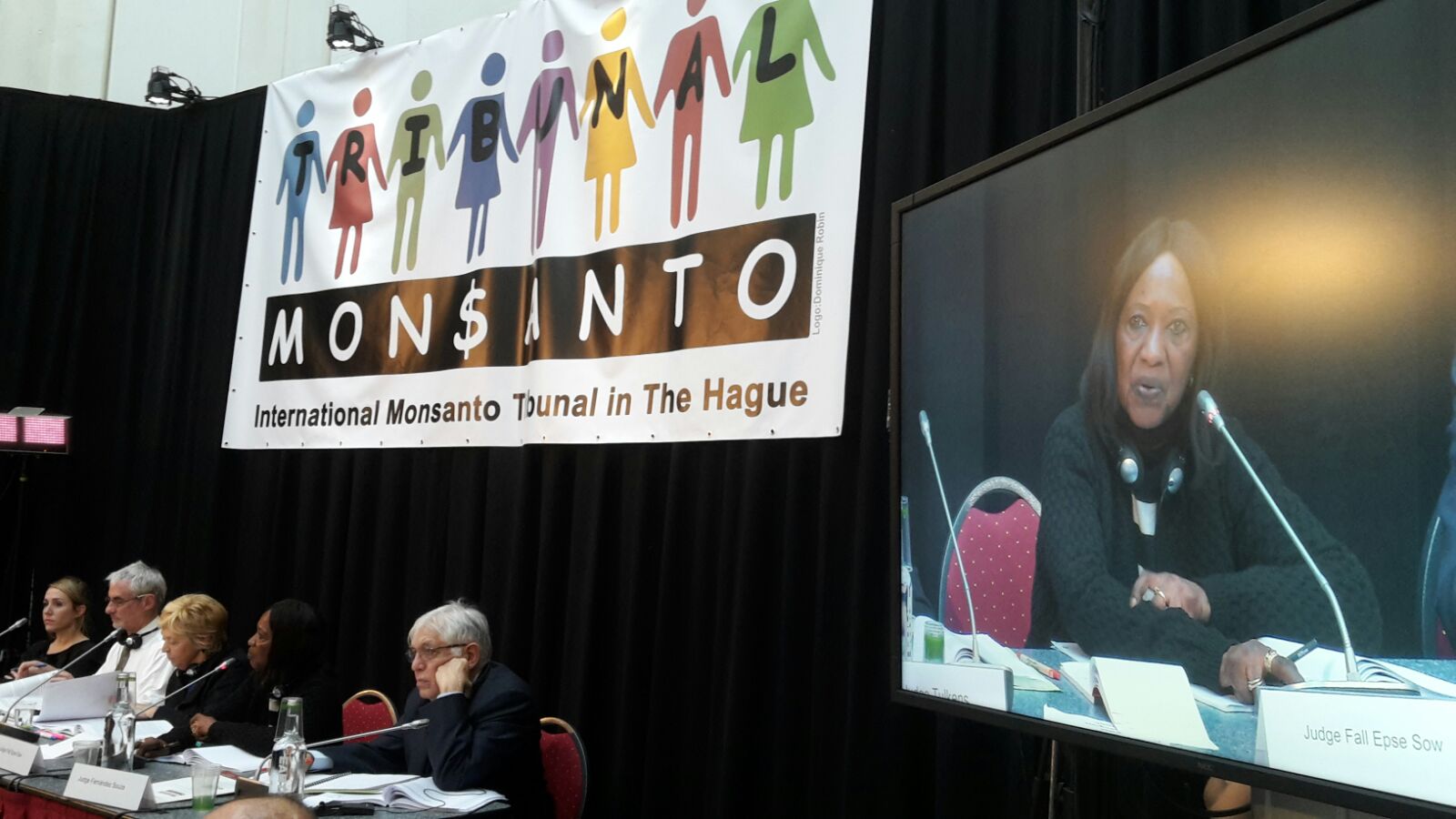
Dior Fall Sow is a consultant to the International Criminal Court, a former Advocate General at the International Criminal Tribunal for Rwanda, and founding member and honorary chairwoman of the Senegalese Lawyers Association (AJS).
The first woman appointed public prosecutor in Senegal, Sow also has served as officer and knight of the Order National du Mérite (Senegal). She has participated in many conferences and seminars around the topics of human rights, peace and security, humanitarian international law, and international criminal justice in many countries, including Switzerland, Belgium, Austria, Italy and the U.S.
She is also the author of many research papers on legal issues. Past posts also include: national director of Juvenile Correctional Education and Social Welfare; director in charge of legal affairs in SONATEL; advocate general in the office of the Prosecutor for the ICTR; and main advocate general for the ICTR Appelate Division.
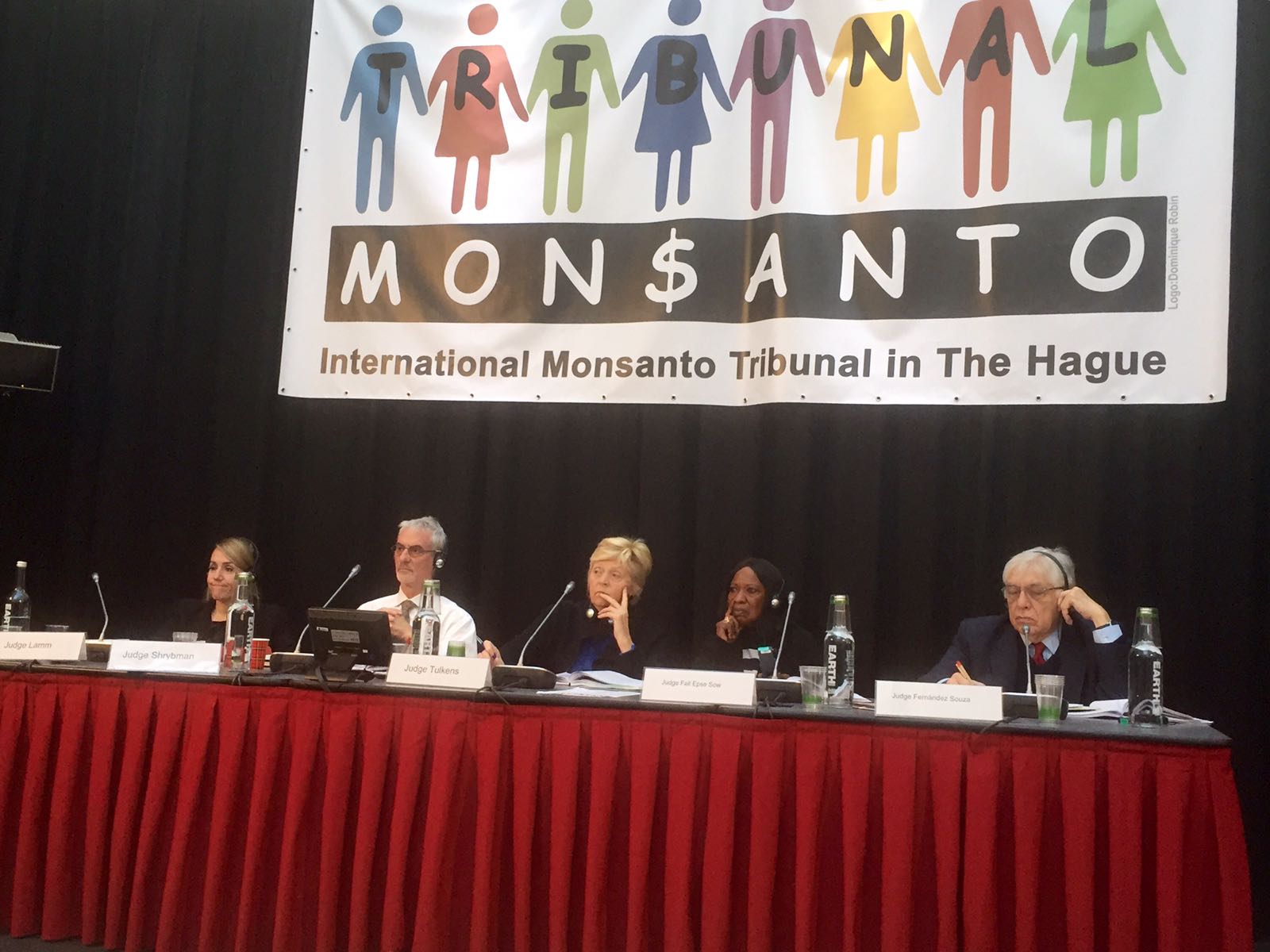
The Judgers
Eleonora Lamm, human rights director for the Supreme Court of Justice of Mendoza.
Steven Shrybman, member of the Boards of the Council of Canadians, and the Institute for Agriculture and Trade Policy.
Dior Fall Sow, former legal advisor, advocate general at the International Criminal Tribunal for Rwanda, and consultant at the International Criminal Court.
Françoise Tulkens, distinguished academic and expert in criminal law, comparative and European criminal law, juvenile justice and human rights protection systems.
Jorge Abraham Fernàndez Souza, judge of the Court of Administrative Litigation of the Federal District of Mexico.
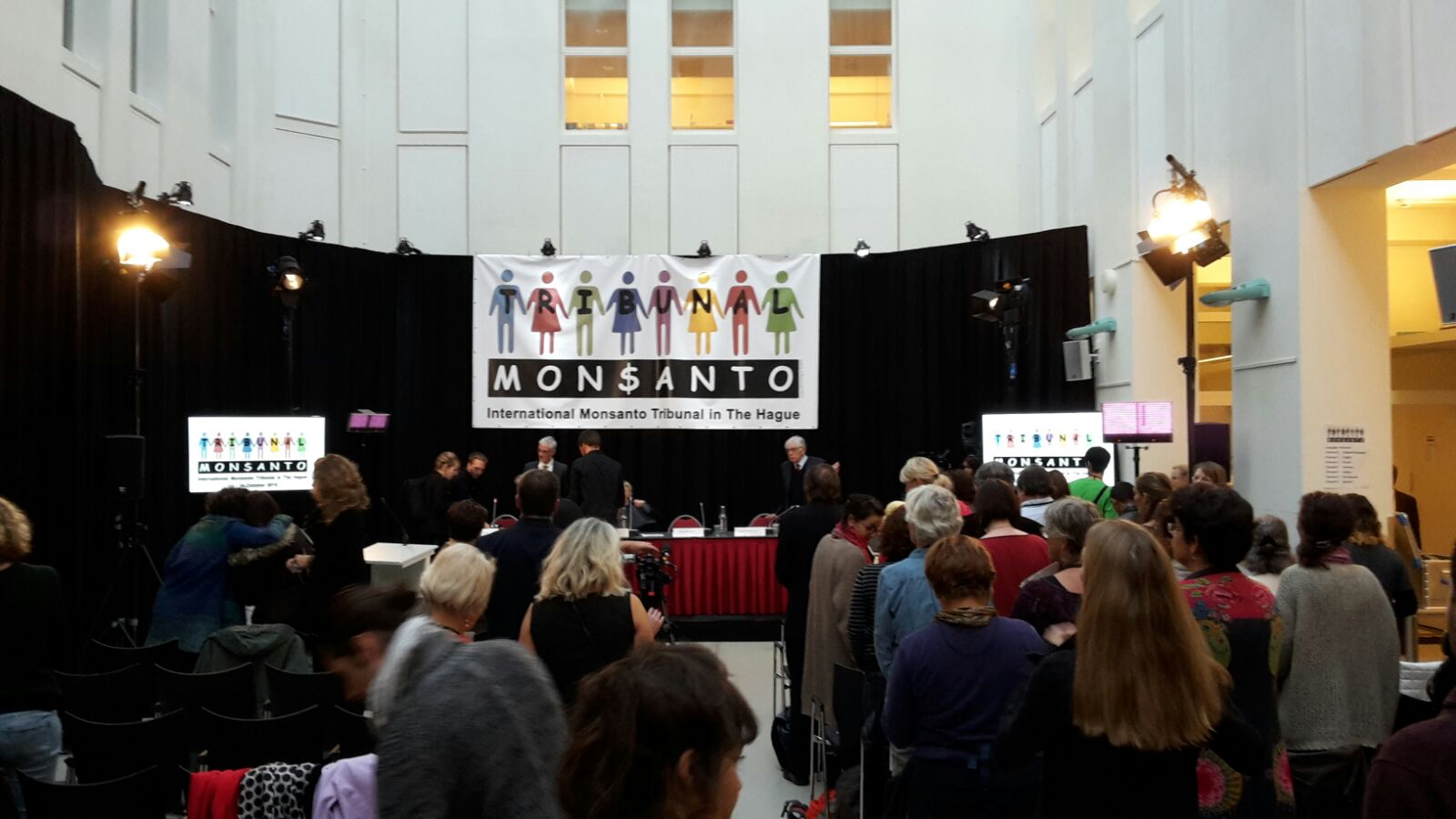
08.45-09.00: Opening of the second day of the International Monsanto Tribunal – we are back on!





